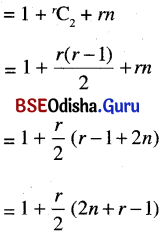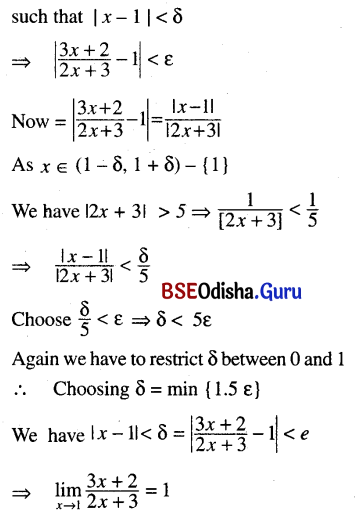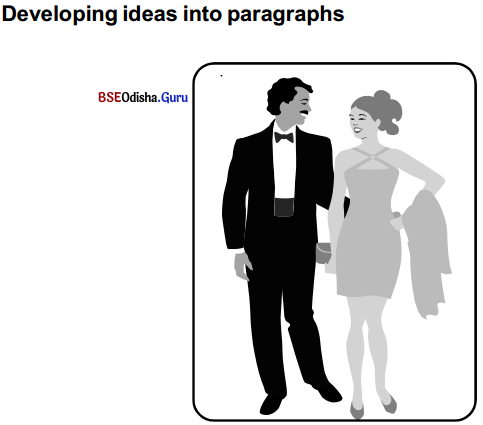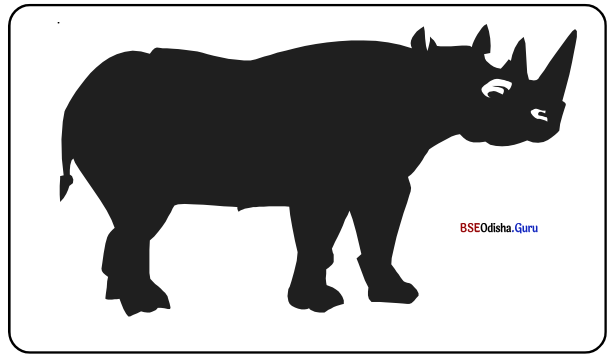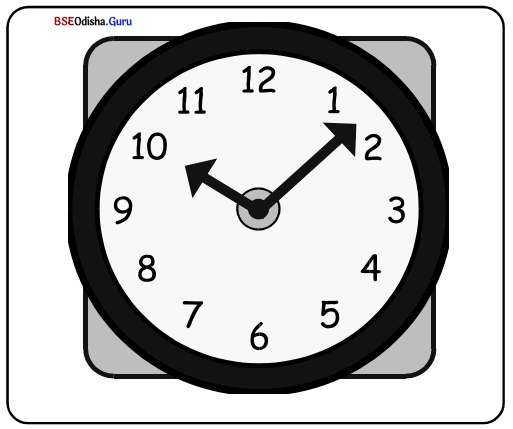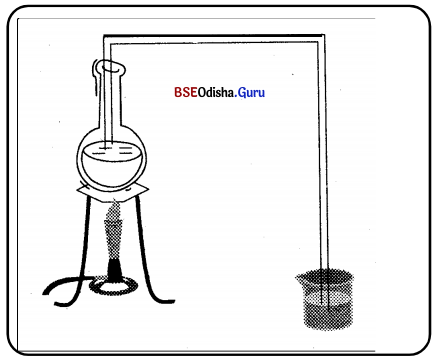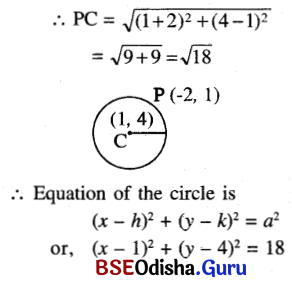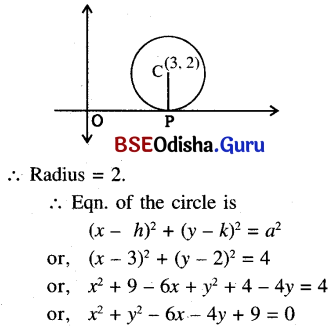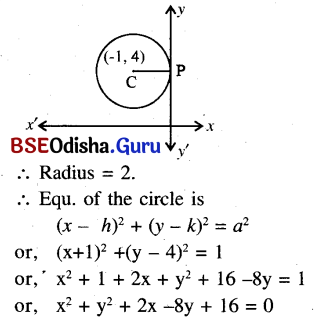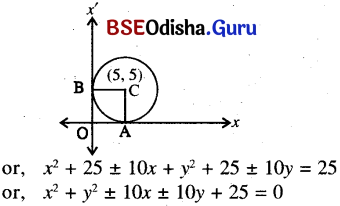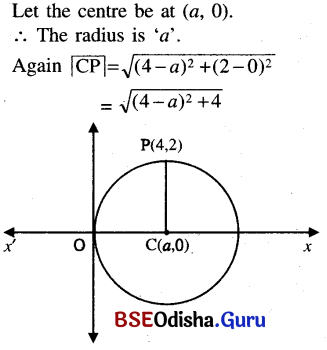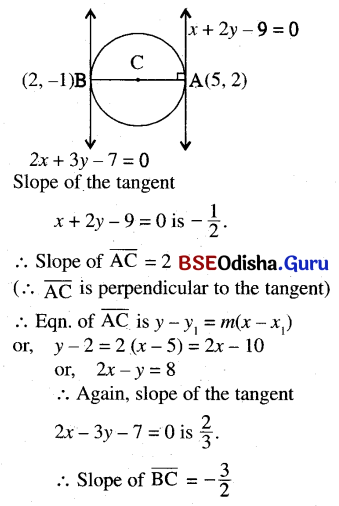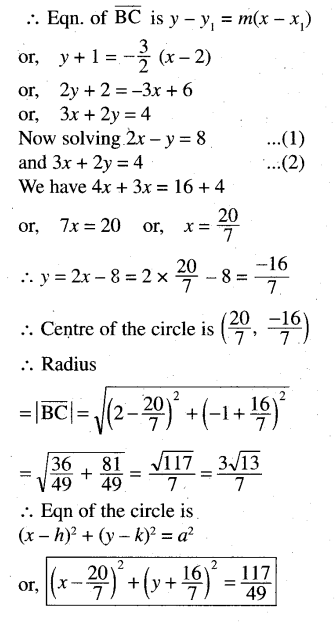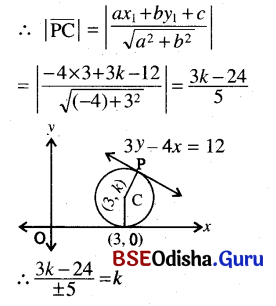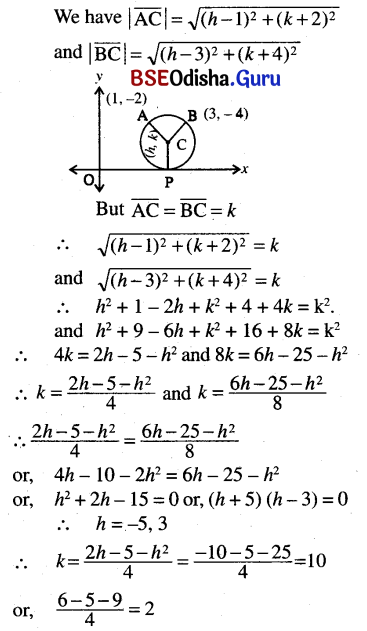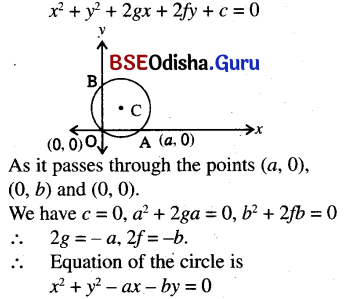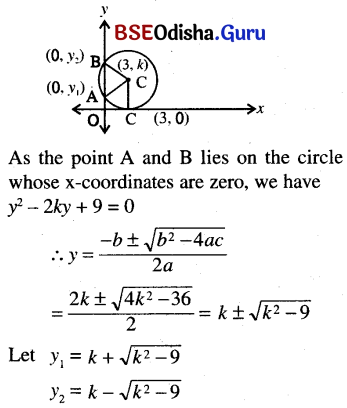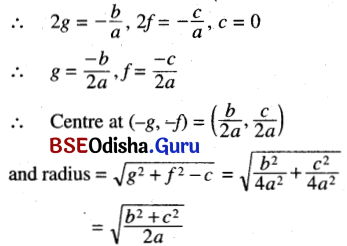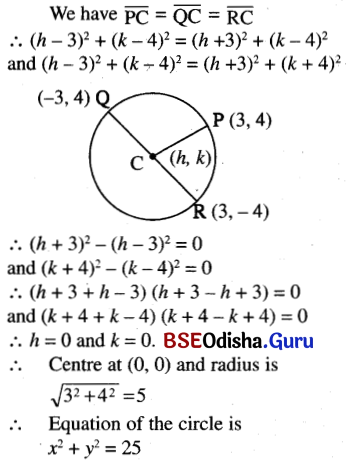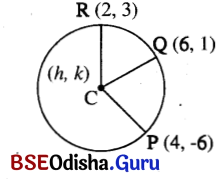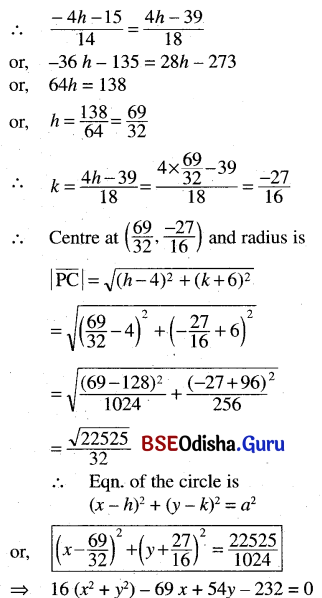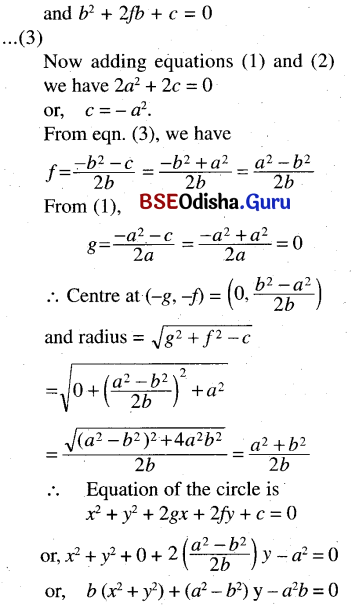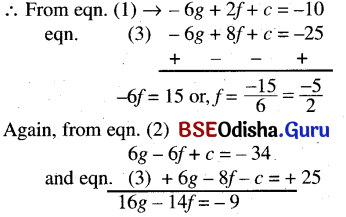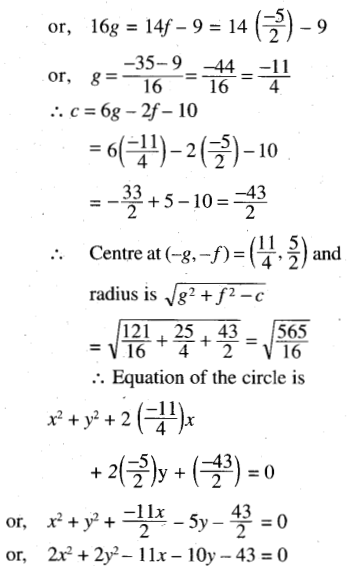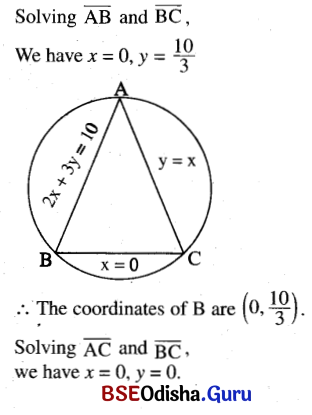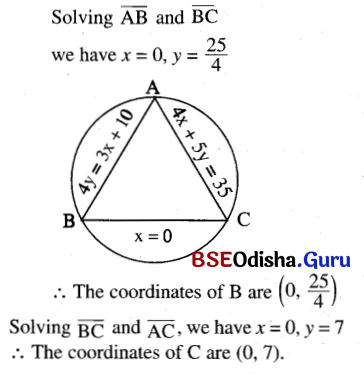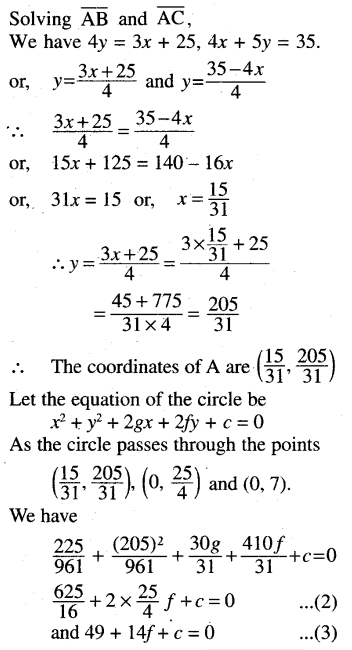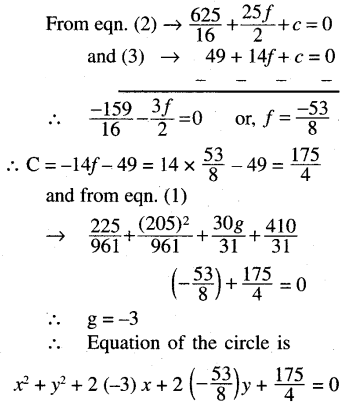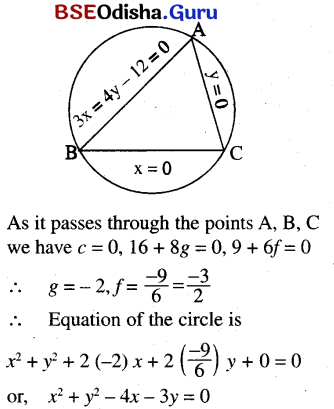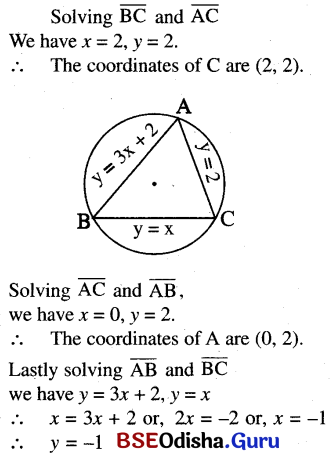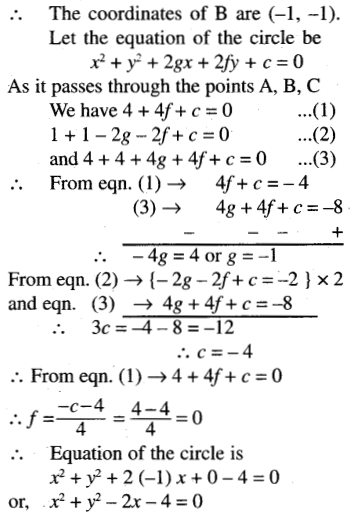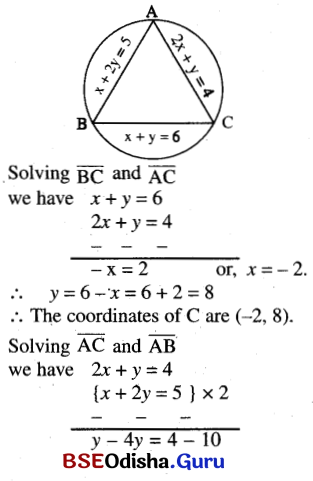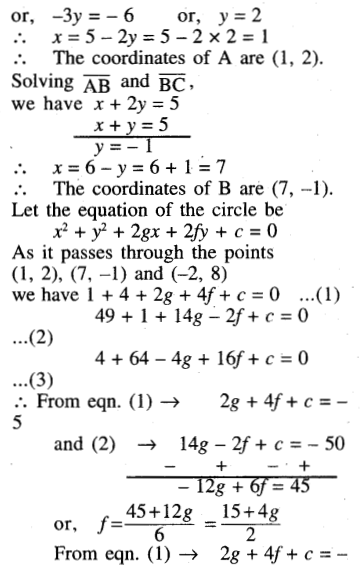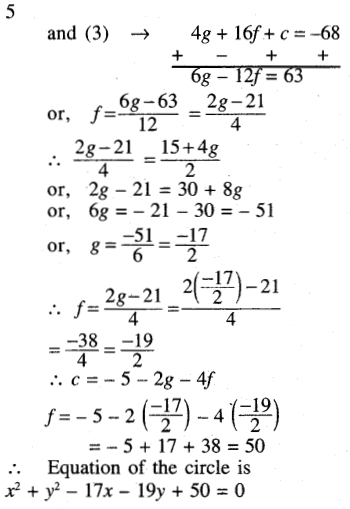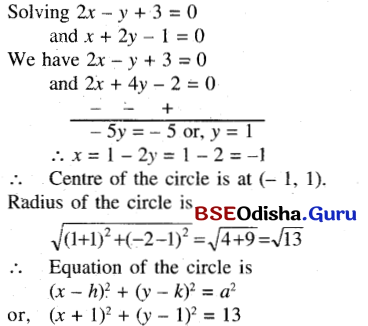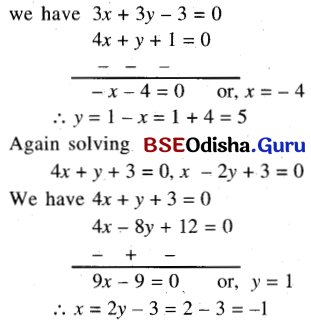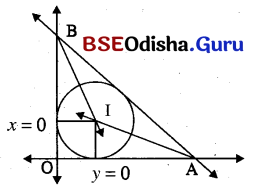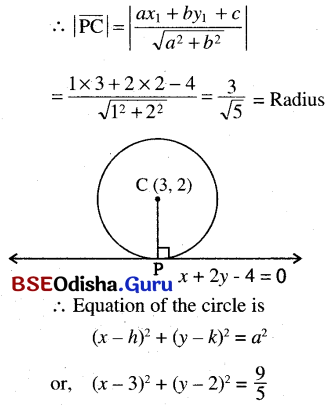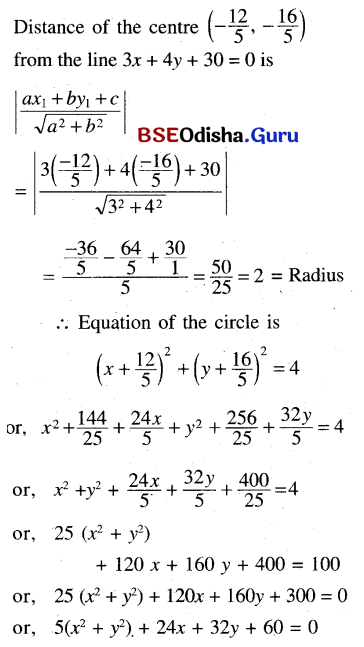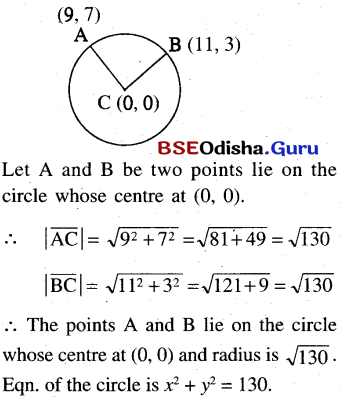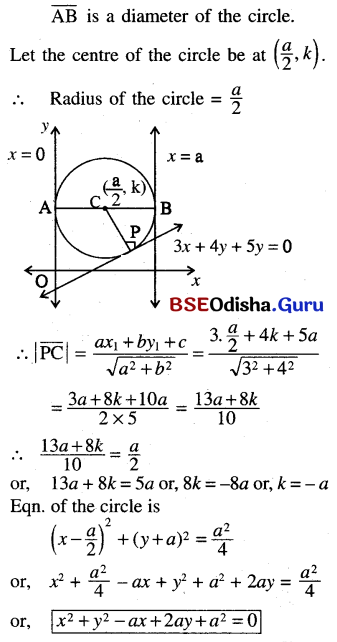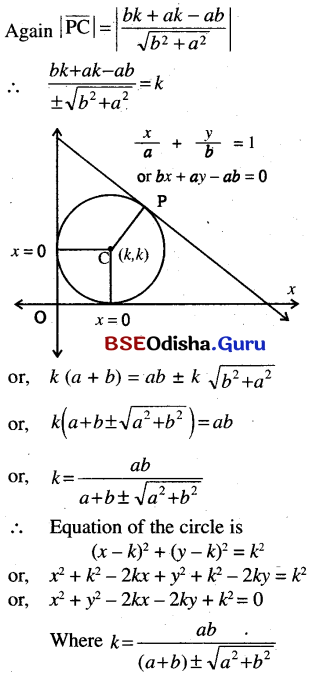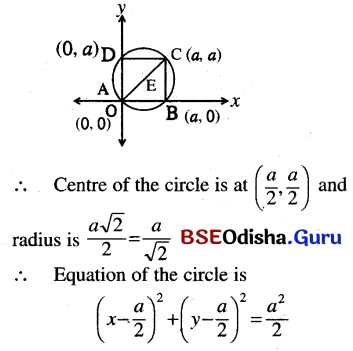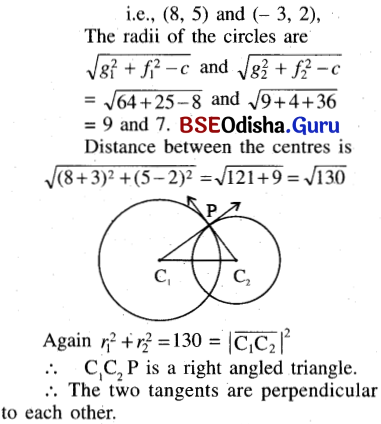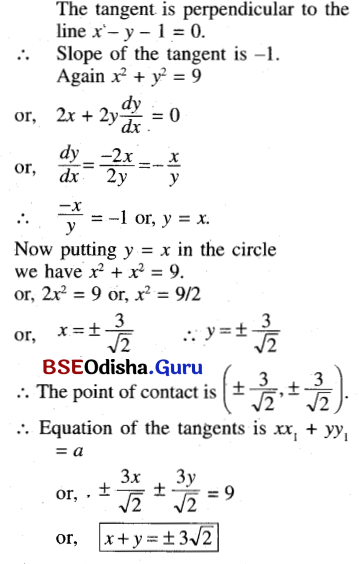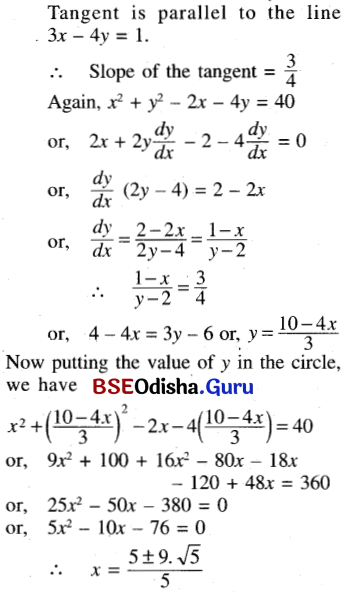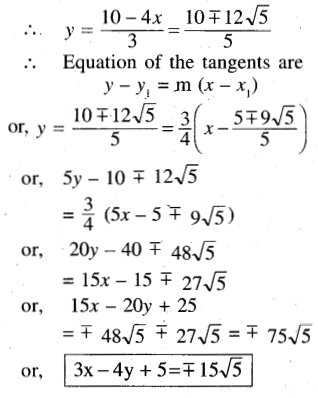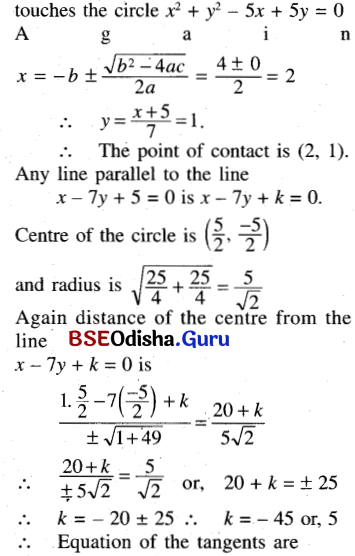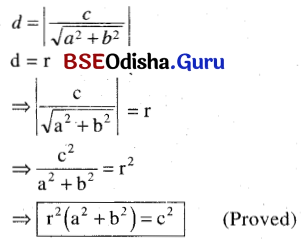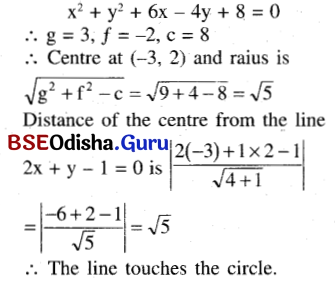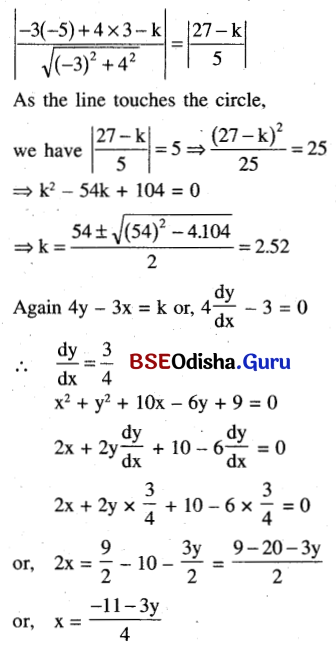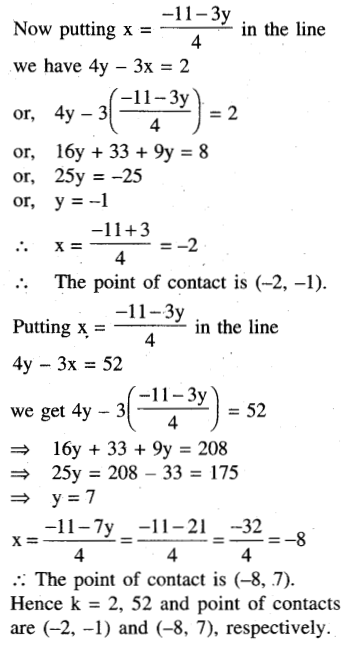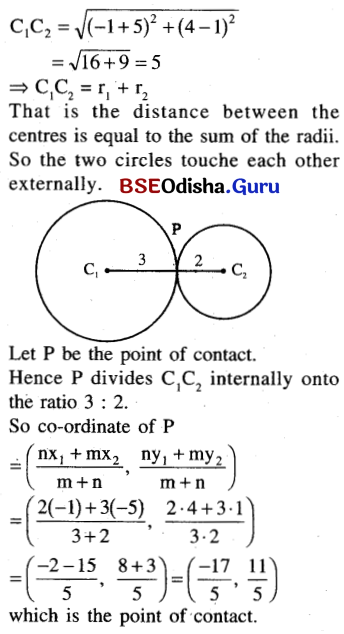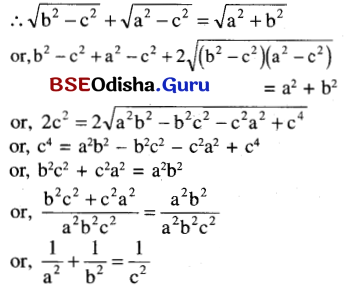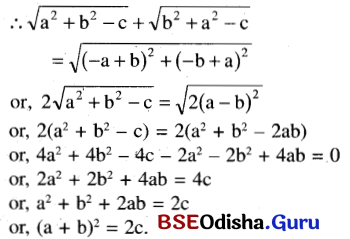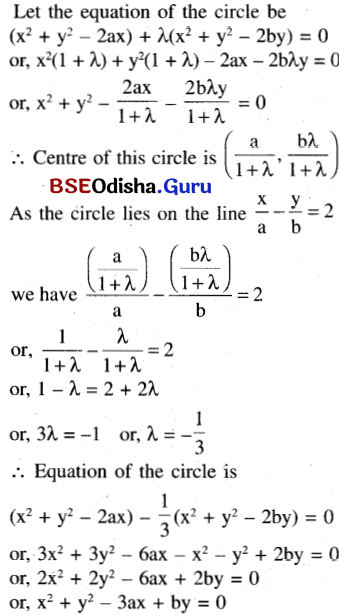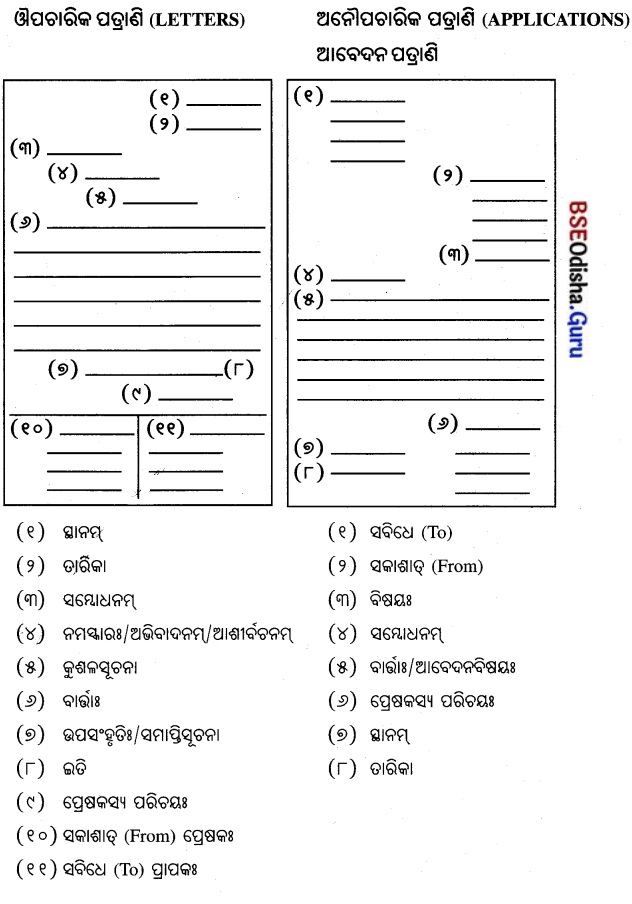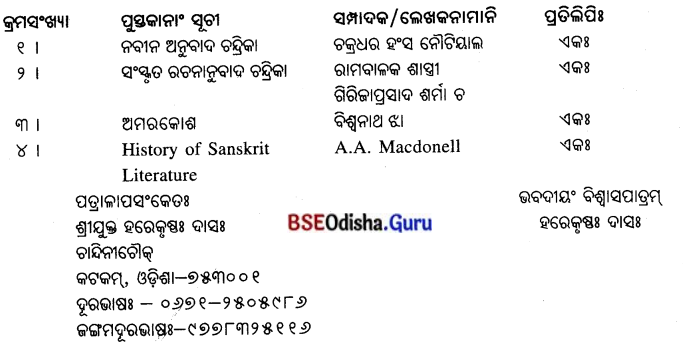Odisha State Board CHSE Odisha Class 11 Sanskrit Solutions Poem 2 भाति मे भारतम् Textbook Exercise Questions and Answers.
CHSE Odisha Class 11 Sanskrit Poem 2 भाति मे भारतम् Question Answer
GROUP – A
(क) बन्धनीमध्यात् शुद्धम् उत्तरं चित्वा लिखत-
1. _________ भाति मेऽनारतं भारतम् ।
(मानसे, भूतले, मण्ड़ले)
Answer:
भूतले
2. भूतले भाति मेऽनारतं _________ ।
(भारतम्, कोशल:, गुर्जर:)
Answer:
भारतम्
3. पावनं _________ उद्घोषयत् भारतं भाति ।
( चैतन्यम्, भावनम्, विश्वबन्धुत्वम् )
Answer:
विश्वबन्धुत्वम्
4. विश्ववन्द्यैः चरित्रैः _________ पावयत् भारतं भाति ।
(भुबं, दिवं, जगत्)
Answer:
जगत्
5. विश्ववन्द्यैः _________ जगत् पावयत् भारतं भाति ।
(चरित्रैः, पवित्रैः, महद्भिः )
Answer:
चरित्रैः
6. विश्वमेकं _________ समालोकयद् ।
(संसारं, परिवार, कुटुम्ब )
Answer:
कुटुम्ब
7. यद्धि. _________ सदप्यस्त्यभिन्नं सदा ।
(अन्नं, भिन्नं, अन्यं)
Answer:
भिन्नं
8. _________ मार्गं भणन्ति आगमाः ।
( धर्मस्य, अर्थस्य, मोक्षस्य )
Answer:
मोक्षस्य
9. मोक्षस्य मार्गं भणन्ति _________ ।
(निगमा:, आगमाः, सुगमा : )
Answer:
आगमाः
10. ज्ञानमास्ते च भार: _________ वै विना ।
(कर्म, करणं, क्रियां)
Answer:
क्रियां
11. जाह्नवी – चन्द्रभागा-जलैः _________ ।
(लालितम्, भावितम्, पावितम् )
Answer:
पावितम्
12. शुभ्रहमाद्रि – हासप्रभा _________ ।
(पूरितम्, पूजितम्, अन्वितम्)
Answer:
पूजितम्
13. विद्युदुत्पादने त्रैल _________ ।
(अन्वेषणे, संशोधने, निष्पादने)
Answer:
संशोधने
14. _________ चिकित्सालयस्थापनैः ।
(शल्यशोधं, छिद्रजालं, रोगजालं)
Answer:
रोगजालं
15. _________ वियन्मण्डले स्थापयत् भारतं भूतले भाति ।
(वाणभट्टं, सूर्यभट्ट, आर्यभट्टं)
Answer:
आर्यभट्ट
16. _________ भूमिगर्भेऽणुशक्तिं किरत् ।
(पोखरण, आजमेर, चान्दिपुरम् )
Answer:
पोखरण
17. _________ अणुं सन्ततं प्रेरयत् भूतले भारतं भाति ।
(मैत्रिकार्येषु, प्रीतिकार्येषु, शान्तिकार्येषु)
Answer:
शान्तिकार्येषु
18. राष्ट्रभाषायुतं _________ भारतम् ।
(तावकं, मामकं, मे)
Answer:
मामकं
19. कालिदासेन _________ संद्योतितम् ।
(व्यासेन, रत्नाकरेण, भासेन )
Answer:
भासेन
20. हस्तिगुम्फामजन्तामलौरां _________ ।
(दधत्, लसत्, मण्डितम्)
Answer:
दधत्

21. निष्क्रियं पार्थमाश्वासयद् _________ ।
( सीतया, गीतया, कृपया )
Answer:
गीतया
22. स्वीयरूपेण तं च व्याघात् _________ ।
(कर्मठम्, पुण्यजम्, पापिष्ठम् )
Answer:
कर्मठम्
23. मृत्युपाशं च _________ सहर्षं धरन् ।
(शिरे, कण्ठे, हृदि )
Answer:
कण्ठे
24. येन _________ सदा शिक्ष्यते प्रेर्यते ।
( समाजं, राष्ट्र, विश्वं)
Answer:
विश्वं
25. गायतिक्रान्तदर्शी _________ चयः ।
( मुनीनां, कवीनां, मतीनां )
Answer:
कवीनां
26. मोदतां मे सदा _________ भारतम् ।
(पावनं, कुशलं, विशुद्धं)
Answer:
पावनं
(ख) अतिसंक्षेपेण उत्तरं लिखत-
1. किम्भूतं विश्ववन्धुत्वम् उद्घोषयत् भारतं भाति ?
Answer:
ପାବନମ୍ ।
2. पावनं किम् उद्घोषयत् भारतं भाति ?
Answer:
ବିଶ୍ଵବନ୍ଧୁତ୍ଵମ୍ ।
3. किम्भूतैः चरित्रैः जगत् पावयत् भारतं भाति ?
Answer:
ବିଶ୍ବବନ୍ଦ୍ୟଃ ।
4. अनारतं भारतं कुत्र भाति ?
Answer:
ଭୂତଳେ ।
5. मोक्षस्य मार्गं भणन्ति ?
Answer:
ଆଗମ ।
6. आगमाः मोक्षस्य किं भणन्ति ?
Answer:
ମାର୍ଗମ୍ ।
7. क्रियां विना किं भारः आस्ते ?
Answer:
ଜ୍ଞାନମ୍।
8. कां विना ज्ञानं भारः आस्ते ?
Answer:
କ୍ରିୟାମ୍ ।
9. जाह्नवी – चन्द्रभागा-जलैः किं पावितम् ?
Answer:
ଭାରତମ୍।
10. भानुजा – नर्मदा – वीचिभिः किं लालितम् ?
Answer:
ଭାରତମ୍।

11. किम् अर्वुदारावलीश्रेणीसंपूजितम् ?
Answer:
ଭାରତମ୍।
12. चिकित्सालयस्थापनै: किम् उन्मूलयत् भारतं भाति?
Answer:
ରୋଗଜାଲମ୍ ।
13. औषधोत्पादनै: किम् उन्मूलयत् भारतं भाति ?
Answer:
ରୋଗଜାଲମ୍ ।
14. शल्यशोधै: किम् उन्मूलयत् भारतं भाति ?
Answer:
ରୋଗଜାଲମ୍ ।
15. वियन्मण्डले किं स्थापयत् भूतले भारतं भाति ?
Answer:
ଆର୍ଯ୍ୟଭଟ୍ଟମ୍ ।
16. पोखरण्-भूमिगर्भे किं किरत् भूतले भारतं भाति ?
Answer:
ଅଣୁଶକ୍ତିମ୍ ।
17. कीदृक्कार्येषु अणुं सन्ततं प्रेज्यत् भूतले भारतं भाति ?
Answer:
ଶାନ୍ତକାର୍ଯ୍ୟଷୁ ।
18. सेतुबन्धं कुत्र वर्तते ?
Answer:
ରାମେଶ୍ଵରେ
19. सूर्यमन्दिर कुत्र वर्तते ?
Answer:
କୋଣାର୍ଥେ ।
20. ‘ओनम्’ पर्व कुत्र पालयते ?
Answer:
କେରଳେ ।
21. श्रीहरि: निष्क्रियं पार्थं कया आश्वासयत् भारतं भाति ?
Answer:
ଗୀତୟା ।
22. कुत्र श्रीहरि: निष्क्रियं पार्थम् आश्वासयत् ?
Answer:
କୁରୁକ୍ଷେତ୍ରମଧେ ।
23. ‘क: मृत्युपाशं कण्ठे सहर्षं धरन् अमरत्वं गतः ?
Answer:
ଭକ୍ତସିଂହଃ ।
24. किम्भूतं भारतं सदा मोदताम् ?
Answer:
ପାବିନମ୍ ।
GROUP – B
(ग) संक्षेपेण (षड्भि: वाक्यै:/ पज्चविंशत्यापदै:) उत्तरं लिखत –
1. भारतं काभि: नदीभि: भाति ?
Answer:
ଅସ୍ମାକଂ ଭାରତଂ ନଦୀମାତୃକାୟା ଦେଶଃ । ଭାରତେ ବହବ ସୁଜଳା ସରିତଃ ଶୋଭନ୍ତେ । ତାସୁ ସୁବିଖ୍ୟାତା ଜହୁ କନ୍ୟା ଗଙ୍ଗା ପବିତ୍ରା ପାପନାଶିନୀ ଚ ଭବତି । ତଥୈବ ଯମୁନା, ନର୍ମଦା, ସିନ୍ଧୁ, ଗୋଦାବରୀ, କାବେରୀ, ତୁଙ୍ଗଭଦ୍ରା, ଚନ୍ଦ୍ରଭାଗା, ବିପାଶା ଇତ୍ୟାଦୟ ପବିତ୍ରା ନଦ୍ୟ ବହନ୍ତି । ଏତାଭି ନଦୀଭି ଅସ୍ମାକଂ ଭାରତଂ ସଦା ଭାତି । ପୂଜାବିଧୌ ସଂଳ୍ପକାଳେ ନଦୀନାମ୍ ଆବାହନଂ ଭବତି ।
2. चिकित्साविज्ञाने भारतस्य उन्नतिं वर्णयत ।
Answer:
ପ୍ରାଚୀନକାଳାଦାରଭ୍ୟ ଆଧୁନିକକାଳଂ ଯାବତ୍ ଚିକିତ୍ସାକ୍ଷେତ୍ରେ ଅସ୍ମାକଂ ଭାରତଂ ସମୁନ୍ନତମ୍ । ଚରକସୁଶ୍ରୁତୟୋଃ ଚିକିତ୍ସାପଦ୍ଧତିଃ ଅତୀବ ଆଦରଣୀୟଃ ସ୍ପୃହଣୀୟଂ ଚ ଭବତି । ଚିକିତ୍ସାଳୟାନାଂ ସ୍ଥାପନେନ, ଔଷଧାନାମ୍ ଅନୁସନ୍ଧାନେନ ଉତ୍ପାଦନେନ ଚ, ସୁଶ୍ରୁତକାଳାଦାରଭ୍ୟ ଅଦ୍ୟପର୍ଯ୍ୟନ୍ତ ଶଲ୍ୟପଦ୍ଧତିମାଧମେନ ଚିକିତ୍ସୟା ବା ଉପଚାରେଣ, ନବୀନପଦ୍ଧତ୍ୟା ଚିକିସୟା ରୋଗନିରାକରଣେନ ଚ ପୃଥିବ୍ୟା ପ୍ରଶଂସନୀୟଂ ଭାରତଂ ସର୍ବଦୈବ ଶୋଭତେ ।
3. भारतं विविधभाषाभिः समृद्धम् – इत्यस्य उदाहरणं प्रदत्त ?
Answer:
ଭାଷାମାଂ ବୈଭବେନ ଭାରତଂ ସୁସମୃଦ୍ଧ ଭବତି । ଭାରତେ ବିବିଧା ଭାଷାଃ ଦୃଶ୍ୟନ୍ତେ ଯଥା – ସଂସ୍କୃତଂ, ପ୍ରାକୃତଂ, ତାମିଲଂ, ତେଲୁଗୁ, କନ୍ନଙ୍, କୈରଳୀ, ବାଙ୍ଗଲାମ୍, ଔତ୍କଳୀ ବାଚମ୍ ଅନ୍ୟା ଚ ତାଂ ତାଂ ବ୍ରୁବଦ୍ ବର୍ଧତେ ରାଷ୍ଟ୍ରଭାଷାଯୁତଂ ମାମକଂ ଭାରତଂ ଭୂତଳେ ଭାତି । ଭାଷାଭିଭିକସମୃଦ୍ଧି ଭାରତସ୍ୟ ପରିଲକ୍ଷ୍ୟତେ ।
4. अस्माकं देशः केन केन रामायणेन शेभते ?
Answer:
ଅସ୍ଵାକଂ ଦେଶ ବିବିଧନ ରାମାୟଣେନ ଶୋଭତେ । ବାଲ୍ମୀକି ବିରଚିତଂ ମୂଳସଂସ୍କୃତରାମାୟଣମ୍, କନ୍ନଡ଼ଭାଷାରଚିତଂ ପମ୍ପରାମାୟଣମ୍, ତାମିଲ୍ ଭାଷା ରଚିତଂ କମ୍ବରାମାୟଣମ୍, ଉତ୍କଳଭାଷାରଚିତଂ ଦାଣ୍ଡିରାମାୟଣମ୍, ବଙ୍ଗଭାଷାରଚିତଂ କୃତ୍ତିବାସରାମାୟଣମ୍ ଚ ତେରାଂ ପବିତ୍ରଧାରାଭିଂ ସର୍ବାନ୍ ଶ୍ରାବୟନ୍ତି ପବିତ୍ରୟନ୍ତି ଚ । ଏବଂଭୂତଃ ଦେଶଃ ଅସ୍ମାକଂ ଭାରତଂ ଶାଶ୍ଵତଂ ଶୋଭିତେ ।
5. भारतस्य नृत्यकलां सूचयत ?
Answer:
ଭାରତେଷୁ ବିଭିନ୍ନ ନୃତ୍ୟପରମ୍ପରା ସୂଚିତା । ପ୍ରମୁଖତୟା ଉତ୍କଳପ୍ରଦେଶେ ଓଡ଼ିଶୀନୃତ୍ୟ, ବନବାସିନାମ୍ ଆଦିବାସିନାଂ ଲୋକନୃତ୍ୟ, ଛଉନୃତ୍ୟ, ମଣିପୁରେ ମଣିପୁରୀନୃତ୍ୟ, ଉତ୍ତରଭାରତେ ପ୍ରଚଳିତଂ କଥକନୃତ୍ୟ, ଗୁର୍ଜରପ୍ରଦେଶେ ଗର୍ବାନୃତ୍ୟ, ଡାଣ୍ଡିଆନୃତ୍ୟ ଚ, ଆନ୍ଧ୍ରପ୍ରଦେଶେ କୂଚିପୂଡ଼ିନୃତ୍ୟ, ପଞ୍ଜାବପ୍ରଦେଶେ ଗିନୃତ୍ୟ ଭାଙ୍ଗଡ଼ାନୃତ୍ୟ ଚ, କେରଳପ୍ରଦେଶେ କଥକଳୀନୃତ୍ୟ, ତାମିନାଡ଼ୁପ୍ରଦେଶ ଭାରତନାଟ୍ୟମ୍ ଇତି ନୃତ୍ୟାନାଂ ପ୍ରଚଳନଂ ଦୃଶ୍ୟତେ । ଅନେନ ନୃତ୍ୟେନ ମମ ଭାରତମ୍ ଅନାରତଂ ଶୋଭତେ ।

6. भक्तसिंहः कथम् अमरत्वं गतः ?
Answer:
ଏକଦା ପରିଧୀନସ୍ୟ ଭାରତସ୍ୟ ସ୍ଵତନ୍ତଡାନିମିତ୍ତମ୍ ଆମ୍ବକଳିଂ ପ୍ରଦାୟ ଭଗତସିଂହ ଇତି ଦେଶଭକ୍ତଃ ଯୁବକଃ ଅମରତ୍ଵ ପ୍ରାପ୍ତବାନ୍ । ମାତୃଭୂମେ ବିପଦଜାଲିଂ ଉଚ୍ଛେଦୟନ୍ ଭକ୍ତସିଂହଃ ଇତି ଯୁବତଃ ସ୍ଵଜୀବନସ୍ୟ ବିନିମୟେନ ଅପି ଆଙ୍ଗଲଶାସକାନାଂ ବିତାଡ଼ନାର୍ଥେ ଯତ୍ନ କୃତବାନ୍ ! ମୃତ୍ୟୁପାଶଂ କଣ୍ଠେ ସହର୍ଷ ଧରନ୍ ଭକ୍ତସିଂହଃ ଅତ୍ର ଅମରତ୍ୱ ଗତଃ । ଏତାଦୃଶଃ ସୁପୁତ୍ର ଅସ୍ଵାକଂ ଦେଶସ୍ୟ ଗର୍ବ ଗୌରବଂ ଚ ଭବତି ।
7. विश्वं भारतेन कथं शिक्ष्यते ?
Answer:
ଅସ୍ମାକଂ ଦେଶସ୍ୟ ଅଭୂତପୂର୍ବ ସ୍ବାଧୀନତାସଂଗ୍ରାମିଂ ପ୍ରଦର୍ଶିତମ୍ । ରକ୍ତପାତଂ ବିନା କୁତ୍ରାପି କଶ୍ଚିତ୍ ଦେଶଃ ବିଶ୍ୱେଽସ୍ମିନ୍ ସ୍ଵାଧୀନତାଂ ନ ପ୍ରାୟୋତି । ପରନ୍ତୁ ଭାରତମେବ ପୃଥିବ୍ୟାମ୍ ଏତାଦୃଶଂ ଭୂଖଣ୍ଡ ଯତ୍ର ରକ୍ତପାତଂ ବିନା ଶସ୍ତ୍ରପାତଂ ବିନା ମନ୍ଦସ୍ମିତା ସଂକ୍ରାନ୍ତି ନାମ ସ୍ବାଧୀନତା ଆୟାତି । ଯେନ ବିଶ୍ଵ ସଦା ଶିଷ୍ୟତେ ପ୍ରେର୍ଯ୍ୟତେ ଚ ଭୂତଳେ ଅନାରତଂ ଭାତି ।
8. भारते के के प्रसिद्धा: उत्सवा: सन्ति ?
Answer:
ଉତ୍ସବପ୍ରିୟା ଖଳୁ ମାନବାଃ । ଅସ୍ମାକଂ ଦେଶ ବିବିଧା ଉତ୍ସବାଃ ଋତୁ ଅନୁସାରଂ ମାସାନୁସାରଂ ଚ ପରିପାଳିତଂ ଭବତି । ବସନ୍ତେ ହୋଲୀଉତ୍ସବ, ଦୋଳୋତ୍ସବାଃ ବା, ଆଶ୍ୱିନମାସେ ଦଶହରାପର୍ବ, କାର୍ତ୍ତିକମାସେ ଦୀପାବଲ୍ୟୁସନଃ, ଆଶ୍ୱିନମାସେ ଲକ୍ଷ୍ମୀପୂଜନାର୍ଥୀ କୋଜାଗରୀ ଉତ୍ସବ, ଦକ୍ଷିଣଭାରତେ ପୋଙ୍ଗଲ୍ ଇତି ଉତ୍ସବାଃ, ଶ୍ରାବଣମାସେ ଶ୍ରାବଣ୍ୟତ୍ସବ, ରକ୍ଷାବନ୍ଧନୋତ୍ସଦଃ ଚ, ପଞ୍ଜାବ-ହରିୟାଣାଦି ରାଜ୍ୟେଷ୍ଠ ଲୋହଡ଼ୀ ଇତି ଉତ୍ସବାଃ, ରମଜାନ୍ମାସେ ‘ଇଦ୍’ ଇତି ଉତ୍ସବ, କେରଳରାଜ୍ୟ ‘ଓଣମ୍’ ଇତି ଉତ୍ସରଃ ପରିପାଲ୍ୟନ୍ତେ । ଏତାଦୃଶମ୍ ଉତ୍ସବମୁଖରଂ ମମ ଭାରତଂ ଭୂତଳେ ଭାତି ।
GROUP – C
(घ) प्रायशः चत्वारिंशतापदै: अष्टाभि: वाक्यै: वा उत्तरं लिखत –
1. कथं विश्वम् एकं कुटुम्वं समालोकयत् भारतं भाति ?
Answer:
ଭାରତସ୍ୟ ମହତ୍ତ୍ଵମ୍ ଅଖଣ୍ଡତ୍ଵ ବିଭୂତଂ ଚ ବିଶ୍ଵେଽସ୍ମିନ୍ ରାଜତେ । ସମସ୍ତେ ଧରଣୀତଳେ ଭାରତଂ ହି ଏକମାତ୍ର ଭୂଖଣ୍ଡ ଯତ୍ ସମଗ୍ରସ୍ୟ ବିଶ୍ବସ୍ୟ ହେତୋ ଚିନ୍ତା ପ୍ରକଟିତା । ତସ୍ମାତ୍ କାରଣାତ୍ ବିଶ୍ଵବନ୍ଧୁତ୍ଵମ୍ ଉଦ୍ଘୋଷୟତି, ଜନସମୁଦାୟସ୍ୟ କୃତେ ରାମାଦୀନାଂ ସଚ୍ଚରିତ୍ରାଣା ବର୍ଣନଂ କୃତ୍ୱା ଧରିତ୍ରୀ ପବିତ୍ରୀ କରୋତି । ‘ବସୁଧୈବ କୁଟୁମ୍ବକମ୍’’ ଇତ୍ୟେବ ବାର୍ତ୍ତା ବିଶ୍ୱେଽସ୍ମିନ୍ ପ୍ରଚାରିତା ପ୍ରସାରିତା ଚ ଭବତି । ସମଗ୍ର ବିଶ୍ୱମ୍ ଏବଂ କୁଟୁମିଂ ସମାଲୋକୟତ୍ବ ଅସ୍ମାକଂ ଭାରତଂ ଭୂତଳେ ଭାତି ।
2. भिन्नमपि भारतं केन रूपेण अभिन्नम् ?
Answer:
‘‘ବିବିଧତା ମଧ୍ୟ ଏକତା’’ – ଅସ୍ମାକଂ ଦେଶସ୍ୟ ଲକ୍ଷ୍ୟ ଭବତି । ବିଭିନ୍ନତ୍ୱ ଅପି ଭାରତସ୍ୟ ଅଭିନ୍ନତଂ ବର୍ଣ୍ଣିତଂ ଭବତି । ଅସ୍ମାକଂ ଭାରତଭୂଖଣ୍ଡସ୍ୟ ଜନଃ ପରସ୍ପରଂ ବେଶଃ, ଭୂଷଣି, ଖାଦ୍ୟ, ପାନୀୟୈ, ପୂଜାପଦ୍ଧତିଭଃ, କ୍ରୀଡ଼ାଭ୍ୟାସସ୍ୟ ବୈବିଧେନ ଉତ୍ସବାନାଂ ଭେଦଃ ଜୀବନୋପାୟୈ ଚ ଭିନ୍ନା ଦୃଶ୍ୟନ୍ତେ । କିନ୍ତୁ ତେଷାମ୍ ଅନ୍ତଃକରଣେଷୁ ଭାରତୀୟତା ଏବ ବିରାଜତେ । ଏବଂ ବିବିଧେଷୁ ସହ ଅପି ଅଭିନଂ ସନ୍ ତନ୍ନାମକଂ ଭାରତଂ ଭୂତଳେ ଭାତି ।
3. भारते के पर्वता: शेभन्ते ?
Answer:
‘ଭୂଭୃତ୍’ ଇତି ପର୍ବତସ୍ୟ ପର୍ଯ୍ୟାୟ ଶବ୍ଦ । ଅନେନ କାୟତେ ଯତ୍ ପର୍ବତଃ ଅସ୍ମାକଂ ଦେଶସ୍ୟ ପ୍ରାକୃତିକୀଶୋଭା ଭବନ୍ତି । ପର୍ବତଃ ଭାରତସ୍ୟ ମହିମମଣ୍ଡିତାଂ ଶୋଭାଂ ପବିତ୍ରତାଂ ଚ ପ୍ରକଟୟନ୍ତି । ବିନ୍ଧ୍ୟ, ସହ୍ୟପର୍ବତଃ, ନୀଳପର୍ବତଃ ଇତ୍ୟାଦିଭିଃ ପର୍ବତଃ ବିଭୂଷିତଂ, ଶୁଭ୍ରହାସଦୀପ୍ରେନ ହିମାଳୟେନ ପୁନଃ ଅର୍ବୁଦାରାବଳୀପର୍ବତମାଳାଭି ଅନାରତଂ ପୂଜିତଂ ମେ ଭାରତମ୍ ଅନାରତଂ ଭୂତଳେ ଭାତି । ମହାକବିକାଳିଦାସେନ କୁମାରସମ୍ଭବମ୍ ମହାକାବ୍ୟ ବର୍ଣ୍ଣିତଂ ଯତ୍ – ‘ଅସ୍ତୁଭରସ୍ୟା ଦିଶି ଦେବତାତ୍ମା ହିମାଳୟ ନାମ ନଗାଧୁରାଜଃ ପୂର୍ବାପରତୋୟ ନିଧ୍ଵଗାହ୍ୟ ସ୍ଥିତାପୃଥ୍ବ୍ୟାମ୍ ଇବ ମାନଦଣ୍ଡ ।’’ ଇତି ।
4. भारतं कस्मिन् कस्मिन् विषये समर्थम् ?
Answer:
ନ କେବଳଂ ପ୍ରାଚୀନକାଳେ ଅପିତୁ ଆଧୁନିକକାଳେ ଭାରତସ୍ୟ ସାମର୍ଥ୍ୟ ବିଶ୍ୱେଽସ୍ମିନ୍ ରାଜତେ । ବିଦ୍ୟୁତଃ ଉତ୍ପାଦନେ, ମୃତ୍ତିକାଧଃସ୍ଥିତସ୍ୟ ତୈଳସ୍ୟ ଉତ୍ତୋଳନେ ବିଶୋଧନେ ଚ, ପ୍ରାକୃତିକବାଷ୍ପରୂପେଣ ଅଙ୍ଗାରରୂପେଣ ଚ ଇନ୍ଧନସ୍ୟ ଅନୁସନ୍ଧାନେ, ଲୌହସ୍ୟ ଉତ୍ପାଦନେ ପୁନଃ ଯନ୍ତ୍ରଣା ବିନିର୍ମାଣେ ଚ ଦେଶସ୍ୟାସ୍ୟା ଉନ୍ନତତରାଂ କୌଶଲଂ ସାମର୍ଥ୍ୟ ବା ଅସ୍ତି ଇତି ବିଶ୍ବବାସିନଃ ଜାନନ୍ତି । ଏତସ୍ମିନ୍ କ୍ଷେତ୍ରେ ଭାରତସ୍ୟ ସାମର୍ଥ୍ୟ ସର୍ବେ ଜାନନ୍ତି ଏବ । ଏତାଦୃଶଂ ସମୁଜ୍ଜ୍ବଳଂ ମେ ଭାରତଂ ଭୂତଳେ ଅନାରତଂ ରାଜତେ ।
5. अणुशक्तिप्रयोगप्रभृतिषु भारतस्य नैपुण्यं प्रदर्शयत ।
Answer:
ଅତ୍ୟାଧୁନିକେ,ବିଜ୍ଞାନକ୍ଷେତ୍ରେ ଅପି ଅସ୍ମାକଂ ଭାରତଂ ଯାଦୃଶଂ ବୈଶିଷ୍ଟ୍ୟ ପ୍ରକଟୟତି ତଦେବ ବିଶ୍ଵେଽସ୍ମିନ୍ ଆଦୃତଃ ଭବତି । ଖଗୋଳ ବିଦ୍ୟାସୁ ନିପୁଣସ୍ୟ ଆର୍ଯ୍ୟଭଟ୍ଟସ୍ୟ ନାମାନୁସାରଂ ନାମିତଃ ଆର୍ଯ୍ୟଭଟ୍ଟ ଇତି ସ୍ଵାନକୌଶଳନିର୍ମିତଃ ଉପଗ୍ରହ ଭାରତୀୟୈ ବୈଜ୍ଞାନିକୈ ମହାକାଶେ ସ୍ଥାପିତଃ । ରାଜସ୍ଥାନମ୍ ଇତି ପ୍ରଦେଶସ୍ୟ ‘ପୋଖରାନ୍’ ଇତି ମରୁପ୍ରାନ୍ତରେ ଭୂଗର୍ଭମଧେ ଅସ୍ମାକମ୍ ଅଣୁବୈଜ୍ଞାନିକଃ ଅଣୁଶକ୍ତିବିସ୍ଫୋରଣଂ କୃତମ୍ । ସଫଳତୟା ଅଣୁଶକ୍ତିପ୍ରୟୋଗପରୀକ୍ଷା କୃତା । ମାନବସମାଜସ୍ୟ କଲ୍ୟାଣାୟ ଅଣୁଖଣ୍ଡିଂ ସନ୍ତତଂ ନିୟୋଜୟତ୍ ମେ ଭାରତମ୍ ଅନାରତଂ ମହୀତଳେ ରାଜତେ ।
6. के कवयः भारतस्य गोरवम् अवर्द्धयन् ?
Answer:
ଅସ୍ମାକଂ ଦେଶସ୍ୟ ଭାରତୀବୈଭବଂ ବିଶ୍ୱେଽସ୍ମିନ୍ ରାଜତେ । କବୟଃ ସ୍ବରଚିତଂ କାବ୍ୟମ୍ ଅତ୍ର ଶ୍ରାବୟନ୍ତି । କବୟଃ କ୍ରାନ୍ତଦର୍ଶନଃ ଭବନ୍ତି । ପୁରାଣମୁନଃ ଆଦିକବି ବାଲ୍ମୀକି ରାମାୟଣକାବ୍ୟ, ବେଦବ୍ୟାସ୍ୱ ମହାଭାରତଂ ଚ, ରତ୍ନାକରଶ୍ଚ ‘ହରବିଜୟମ୍’ ନାମ ମହାକାବ୍ୟ ବିରଚ୍ୟ ଭାରତବର୍ଷ ବିଭୂଷିତଂ କୃତବର୍ଷେ । ତେଷା ରଚନାବଳୀମ୍ ଉପଜୀବ୍ୟ କାବ୍ୟରୂପେଣ ଗୃହୀତ୍ଵା ଅନ୍ୟ କବୟଃ ସ୍ଵକାବ୍ୟ ବିରଚିତମ୍ । କବିକୁଳଗୁରୁ କାଳିଦାସ, ହାସସ୍ଵରୂପଃ ଭାସ୍ୱ, ସର୍ବତନ୍ତ୍ରସ୍ବତନ୍ତ୍ର ବିଳାପଃ କାଦମ୍ବରୀକାବ୍ୟରସପରିବେଷକଃ ବାଣଭଟ୍ଟ ଚ ଚେଷ୍ଟା କାବ୍ୟାଲୋକେନ ଦେଶଂ ସଂଦ୍ୟୋତିତଂ ସୌନ୍ଦର୍ଯ୍ୟାନ୍ବିତଂ ଚ କୃତବନ୍ତଃ । ଏତେଷା କାବ୍ୟସମୃଦ୍ଧା ମେ ଭାରତଂ ଭୂତଳେ ନିରନ୍ତରଂ ଶୋଭତେ ।
7. द्वारकाप्रभृतितीर्थानां नामानि लिखत ।
Answer:
ତୀର୍ଥକ୍ଷେତ୍ର ଭାରତମ୍ । ଅସ୍ଵାକଂ ଦେଶେ ପବିତ୍ରସ୍ଥାନାନି ତୀର୍ଥରୂପାଣି ବିରାଜନ୍ତେ । ଆକୁମାରୀହିମାଚଳପର୍ଯ୍ୟନ୍ତ ସମଗ୍ରଦେଶ ତୀର୍ଥକ୍ଷେତ୍ରାଣି ରାଜନ୍ତେ । ଗୁଜୁରାଟପ୍ରଦେଶସ୍ଥିତା ଦ୍ୱାରକା, ତାମିଲନାଡ଼ୁପ୍ରଦେଶସ୍ୟ ରାମେଶ୍ଵରସ୍ୟ ସବିଧେ ସାଗରମଧ୍ୟେ ନିର୍ମତଃ ସେତୁବନ୍ଧଃ ଉତ୍କଳପ୍ରଦେଶସ୍ୟ ପୁରୀସ୍ଥିତ ଭ।ଗଦତଃ ଜଗନ୍ନାଥସ୍ୟ ବଦରିକାକ୍ଷେତ୍ରମ୍ । ଆନ୍ଧ୍ରପ୍ରଦେଶସ୍ୟ ତିରୁପତୌ ତିରୁମଲାକ୍ଷେତ୍ରେ ପ୍ରସିଦ୍ଧ ବେଙ୍କଟେଶ ମନ୍ଦିରମ୍, ଉତ୍ତରପ୍ରଦେଶସ୍ୟ ମଥୁରାୟାଂ ଶ୍ରୀକୃଷ୍ଣଜନ୍ମଭୂମି, ସୁପୀସମ୍ପ୍ରଦାୟସ୍ୟ ଖ୍ରୀଜ୍ୟମଇନୁଦ୍ଦିସ୍ତି ଦର୍ଘଶୋଭିତମ୍ ଆଜମେରକ୍ଷେତ୍ରମ୍ ତତଂ ଚ ସ୍ଥିତଂ ପାବନଂ ପୁଷ୍କରତୀର୍ଥମ୍, ପଞ୍ଜାବପ୍ରଦେଶସ୍ୟ ଅମୃତସରଃ ଇତି ସ୍ଥାନେ ଶିଖଧର୍ମପୀଠମ୍ । ଏବମ୍ ଅନେକୈ ସୁପ୍ରସିଦ୍ଧି କ୍ଷେତ୍ରେ ତୀର୍ଥେ ଚ ବିରାଜିତଂ ଭାରତମ୍ ଅନାରତଂ ଭାତି ।
8. भारतस्य विविधेषु क्षेत्रेषु पालितान् उत्सवान् परिचाययत ।
Answer:
ଉତ୍ସବପ୍ରିୟା ଖଳୁ ମାନବାଃ । ଧର୍ମପ୍ରାଣସ୍ୟ ଭାରତବର୍ଷସ୍ୟ ବିଭିନ୍ନେଷୁ ସ୍ଥାନେଷୁ ସୁପ୍ରସିଦ୍ଧା ମନେଜ୍ଞା ଉତ୍ସବାଃ ପରିପାଲ୍ୟନ୍ତେ । ବସନ୍ତକାଳେ ଭଗବତଃ ଶ୍ରୀକୃଷ୍ଣସ୍ୟ ଦୋଳୋତ୍ସବେନ ସହ ସମଗ୍ର ଭାରତେ ପରିପାଳିତଃ ହୋଲିକୋତ୍ସବାଃ, ମହିଷମର୍ଦ୍ଦିନୀଦୁର୍ଗତିନାଶିନୀ ଦୁର୍ଗା ଆଶ୍ୱିନମାସେ ଶୁକ୍ଳପକ୍ଷେ ସଂପୂଜିତା ଭବତି । ଜନାସ୍ତୁ ଆଶ୍ୱିନମାସସ୍ୟ ଶୁକ୍ଳଦଶମାଂ ତୀର୍ଥେ ଦଶହରା ଇତି ଉତ୍ସବଂ ସାନନ୍ଦ ସଗୌରବଂ ପାଳୟନ୍ତି । କାର୍ତ୍ତିକମାସେ ଚ ଦୀପାଲୋକସଜିତାଂ ଦୀପାବଳୀ ଇତି ଉତ୍ସବଂ ସମଗ୍ର ଦଶହରା ଇତି ଉତ୍ସବଂ ସାନନ୍ଦ ସଗୌରବଂ ପାଳୟନ୍ତି ।
କାର୍ତ୍ତିକମାସେ ଚ ଦୀପାଲୋକସଜିତାଂ ଦୀପାବଳୀ ଇତି ଉତ୍ସବଂ ସମଗ୍ର ତାମିଲନାଡ଼ୁ ପ୍ରଦେଶସ୍ୟ ନବବର୍ଷେତ୍ସବରୂପେଣ, ଆନ୍ଧ୍ରପ୍ରଦେଶେ ଦକ୍ଷିଣଭାରତେ ଚ ପୋଙ୍ଗଲ୍ଇତି ଉତ୍ସବ ପରିପାଲ୍ୟତେ । ଶ୍ରାବଣପୂର୍ଣ୍ଣିମାୟାଂ ଶ୍ରାବଣ୍ୟସମଃ, ରକ୍ଷାବନ୍ଧାନତ୍ସତଃ ବଳଭଦ୍ରଜନ୍ମୋତ୍ସବ ବା ପରିପାଲ୍ୟତେ । ଦକ୍ଷିଣ-ପୂର୍ବ-ଭାରତୀୟା ଚ ଯଥା ଅଭ୍ୟୁ ସବଂ ପାଳୟନ୍ତ ତଥୈବ ପଞ୍ଜାବ-ହରିୟାଣାଦିରାଜ୍ୟେଷ୍ଠ ଲୋହଡ଼ୀ ଇତି ଉତ୍ସବଂ, ରମଜାନ୍ମାସେ ‘ଇଦ୍’ ଇତି ଉତ୍ସବଂ, କେରଳରାଜ୍ୟ ଜନାଃ ‘ଓଲ୍ମ୍’ ଇତି ଉତ୍ସବଂ ପାଳୟନ୍ତି । ଅତଃ ଏତାଦୃଶମ୍ ଉତ୍ସବମୁଖରଂ ସମଭରାତମ୍ ଅନାରତଂ ବିଶ୍ଵେଽସ୍ମିନ୍ ବିରାଜତେ ।
ଶ୍ଳୋକ – ୧
विश्वबन्धुत्वमुद्घोषयत्पावनं
विश्ववन्द्येश्चरित्रैर्जगत्पावयत् ।
विश्वमेकं कुटुम्बं समालोकयद्
भूतले भाति मेनारतं भारतम् ॥ १ ॥
ବିଶ୍ଵବନ୍ଧୁତ୍ୱମୁଦ୍ଘେ।ଷୟତ୍ପାବନଂ
ବିଶ୍ୱବନ୍ଦ୍ୟଶ୍ଚ ରିତ୍ରୈର୍ଜଗତ୍ପାବୟତ୍ ।
ବିଶ୍ଵମେକଂ କୁଟୁମ୍ବୀ ସମାଲୋକୟଦ୍
ଭୂତଳେ ଭାତି ମେଽନାରତଂ ଭାରତମ୍ ॥ ୧ ॥
ଅନ୍ବୟ – ପାବନଂ ବିଶ୍ଵବନ୍ଧୁତ୍ଵମୁଦ୍ଷୟତ୍, ବିଶ୍ୱବନ୍ଦ୍ୟ ଚରିତଃ ଜଗତ୍ ପାବୟତ୍, ବିଶ୍ବମ୍ ଏବଂ କୁଟୁମ୍ବ ସମାଲୋକୟତ୍, ମେ ଭାରତଂ ଭୂତଳେ ଅନାରତଂ ଭାତି ।
ଶବ୍ଦାର୍ଥ – ପାବନମ୍ = ପବିତ୍ର । ଉଦ୍ଘୋଷୟତ୍ = ଘୋଷଣା କରୁଥିବା । ଚରିତିଃ = ଚରିତ୍ରଦ୍ଵାରା । ଜଗତ୍ = ସଂସାର । ବିଶ୍ୱମ୍ = ପୃଥିବୀକୁ । କୁଟୁମ୍ବମ୍ = ପରିବାର । ସମାଲୋକୟତ୍ = ଦେଖୁଥିବା । ମେ = ମୋର । ଭୂତଳେ = ପୃଥିବୀରେ । ଅନାରତମ୍ = ଅବିରତ । ଭାତି = ଶୋଭାପାଉଛି ।
ଅନୁବାଦ – ପବିତ୍ର ବିଶ୍ୱବନ୍ଧୁତ୍ଵକୁ ଉଦ୍ଘୋଷଣ କରି, ବିଶ୍ଵବନ୍ଦିତ ଚରିତ୍ରଦ୍ଵାରା ସଂସାରକୁ ପବିତ୍ରିତ କରି ବିଶ୍ବକୁ ଏକ ପରିବାରଭାବେ ପ୍ରଦର୍ଶିତ କରି ମୋର ଭାରତ ଦେଶ ପୃଥିବୀ ପୃଷ୍ଠରେ ନିରନ୍ତର ଶୋଭାପାଉଛି ।
ସଂସ୍କୃତ ବ୍ୟାଖ୍ୟା – ଶ୍ଳୋକୋଽୟଂ ପଠିତ ସଂସ୍କୃତପ୍ରଭା ପୁସ୍ତକସ୍ଥ ସଂସ୍କୃତସାହିତ୍ୟସ୍ୟ ପ୍ରଥଯଶା ଲବ୍ଧପ୍ରତିଷ୍ଠ କବି ରମାକାନ୍ତଶୁକ୍ଳ ବିରଚିତଃ ‘ଭାତି ମେ ଭାରତମ୍’ କାବ୍ୟଭାଗାତ୍ ଆନୀତଃ । ଅତ୍ର ଅସ୍ଥିନ୍ ପଦ୍ୟ ଭାରତସ୍ୟ ଶୋଭା କୀଦୃଶୀ ଭବତି ତଦେବ ବର୍ଣ୍ଣିତମ୍ ।
ବିଶ୍ୱେଽସ୍ମିନ୍ ଭାରତଦେଶସ୍ୟ ସ୍ଥାନଂ ତୁ ସ୍ଵତନ୍ତ୍ରମେବ । କବି ଅମ୍ଳୀକଂ ଦେଶସ୍ୟ ପାବିଦ୍ର୍ୟ ବନ୍ଧୁତ୍ୱ ଚ ପ୍ରଦର୍ଶିତମ୍ । ‘ବସୁଧୈବ କୁଟୁମ୍ବକମ୍’ ଇତ୍ୟେବ ଭାବନା ଭାରତୀୟାନାଂ ଭବତି । ଅମ୍ଳୀକଂ ଦେଶଃ ପବିତ୍ର ବିଶ୍ୱବନ୍ଧୁତ୍ଵମ୍ ଉଦ୍ଘୋଷୟତି, ଦେଶେଽସ୍ମିନ ମହାପୁରୁଷଚରତ୍ୟେ ଇୟଂ ଭୂମି ପବିତ୍ରିତଂ ଭବତି । ଅସ୍ମାକଂ ଦେଶସ୍ୟ ମହତୀ ସଂସ୍କୃତିଃ କୁଟୁମ୍ବୀଭାବନା ଚ ସମଗ୍ର ବିଶ୍ଵ ବିରାଜତେ । ଅନେନ ମାଧ୍ୟମେନ ମମ ଭାରତଦେଶଃ ବିଶ୍ଵ ରାଜତେ ।
ଓଡ଼ିଆ ବ୍ୟାଖ୍ୟା – ଶଂସିତ ଶ୍ଳୋକଟି ସଂସ୍କୃତ ସାହିତ୍ୟର ପ୍ରଥଯଶା ଲବ୍ଧପ୍ରତିଷ୍ଠ କବି ରମାକାନ୍ତ ଶୁକ୍ଳ ବିରଚିତ ‘ଭାତି ମେ ଭାରତମ୍’ କାବ୍ୟରୁ ଆନୀତ । ଏଠାରେ ଆଲୋଚିତ ପଦ୍ୟରେ ଭାରତର ଶୋଭା କିଭଳି ତାହା ବର୍ଣ୍ଣିତ ହୋଇଛି ।
ସମଗ୍ର ବିଶ୍ଵରେ ଭାରତର ସ୍ଥାନ ସ୍ଵତନ୍ତ୍ର । ଏହି ଦେଶରେ ବିଶ୍ଵବନ୍ଧୁତ୍ଵର ଭାବନା ଅତ୍ୟନ୍ତ ପବିତ୍ର । ଏଠାରେ ଥିବା ମହାପୁରୁଷମାନଙ୍କର ପବିତ୍ର ଚରିତ୍ର ଏ ଭାରତଭୂଇଁକୁ ଅତୀବ ପବିତ୍ରିତ କରିଛି । ‘ବସୁଧୈବ କୁଟୁମ୍ବକମ୍’ – ଏହି ଭାବନାରେ ଉଦ୍ବୁଦ୍ଧ ସମସ୍ତ ଭାରତୀୟ ବିଶ୍ବକୁ ଏକ କୁଟୁମ୍ବରୂପେ ଅବଧାରଣ କରିଛନ୍ତି । ଭାରତର ଏଭଳି ମହାନ୍ ସଂସ୍କୃତି ସମଗ୍ର ବିଶ୍ବରେ ପ୍ରତିଷ୍ଠିତ ହୋଇଛି । ଏଥିପାଇଁ ମୋର ଭାରତଦେଶ ସମଗ୍ର ବିଶ୍ଵରେ ନିରନ୍ତର ଶୋଭା ପାଉଛି । ସତରେ କବିଙ୍କର ଏତାଦୃଶ ଭାବନା ଏକାନ୍ତ ଯଥାର୍ଥ ଅଟେ ।
ବ୍ୟାକରଣ:
ସନ୍ଧି ବିଚ୍ଛେଦ – ବିଶ୍ୱବନ୍ଧୁତ୍ବ ମୁଦ୍ଷୟପ୍ଲାବନମ୍ = ବିଶ୍ଵବନ୍ଧୁତ୍ଵମ୍ + ଉଦ୍ଘୋଷୟତ୍ + ପାବନମ୍ । ବିଶ୍ବବନ୍ଦୋଶ୍ଚରିତୈର୍ଜଗତ୍ପାବୟତ୍ = ବିଶ୍ଵବନ୍ଦ୍ୟ + ଚରିତିଃ + ଜଗତ୍ + ପାବୟତ୍ । ବିଶ୍ଵମେକମ୍ = ବିଶ୍ୱମ୍ + ଏକମ୍ । ମେଽନାରତମ୍ = ମେ + ଅନାରତମ୍ ।
ସମାସ – ବିଶ୍ୱବନ୍ଧୁତ୍ଵମ୍ = ବିଶ୍ୱସ୍ୟ ବନ୍ଧୁତ୍ଵମ୍ (ଷଷ୍ଠୀ ତତ୍ପୁରୁଷ) । ବିଶ୍ଵବନ୍ଧ୍ୟା = ବିଶ୍ଵ ବନ୍ଦୀ, ତସ୍ମି (ସପ୍ତମୀ ତପୁରୁଷ) । ଭୂତଳେ = ଭୁନଃ ତଳମ୍, ତସ୍ମିନ୍ (ଷଷ୍ଠୀ ତତ୍ପୁରୁଷ)
ସକାରଣବିଭକ୍ତି – ପାବନମ୍ = କର୍ମଣି ୨ୟା । ବିଶ୍ୱବନ୍ଦ୍ୟ, ଚରିତଃ = କରଣେ ୩ୟା । ବିଶ୍ୱ, ଏବଂ, କୁଟୁମ୍ବମ୍ = କର୍ମଣି ୨ୟା । ମେ = ସମ୍ବନ୍ଧ ୬ଷ୍ଠୀ । ଭୂତଳେ = ଅଧ୍ଵରଣେ ୭ମୀ ।
ପ୍ରକୃତିପ୍ରତ୍ୟୟ – ପାବନମ୍ = ପୂ + ଣିଚ୍ + ଲୁଟ୍ । ବନ୍ଧୁତ୍ଵମ୍ = ବନ୍ଧୁ+ ତ୍ଵ ।

ଶ୍ଳୋକ – ୨
वेशभूषाशनोपासनापद्धति –
क्रीडनामोद-संस्कार-वृत्त्यादिषु ।
यद्धि भिन्नं सदप्यस्त्यभिन्नं सदा
भूतले भातिं तन्मामकं भारतम् ॥ २ ॥
ବେଶଭୂଷାଶନେ।ପାସନାପଦ୍ଧତି –
କ୍ରୀଡ଼ନାମୋଦ – ସଂସ୍କାର – ବୃତ୍ୟାଦିଷ୍ଣୁ ।
ଯଦ୍ଧି ଭିନଂ ସଦଶ୍ୟସ୍ତ୍ୟଭିନଂ ସଦା
ଭୂତଳେ ଭାତି ତନ୍ମାମକଂ ଭାରତମ୍ ॥ ୨ ॥
ବେଶଭୂଷା – ଅଶନ – ଉପାସନାପଦ୍ଧତି-କ୍ରୀଡ଼ନ-ଆମୋଦ-ସଂସ୍କାର-ବୃତ୍ୟାଦିଷ୍ଣୁ ଯଦ୍ ହି ଭିନ୍ନ ସତ୍ ସଦା ଅପି ଅଭିନ୍ନମ୍ ଅସ୍ତି । ତତ୍ ମାମକଂ ଭାରତଂ ଭୂତଳେ ଭାତି ।
ଶବ୍ଦାର୍ଥ – ଅଶନ = ଭୋଜନ । କ୍ରୀଡ଼ନ = ଖେଳକୁଦ । ଆମୋଦ = ଆନନ୍ଦ । ଯଦ୍ = ଯାହା । ହି = ଯେହେତୁ । ଅପି = ମଧ୍ୟ । ମାମକଂ = ମୋର । ଭୂତଳେ = ପୃଥିବୀପୃଷ୍ଠରେ । ଭାତି = ଶୋଭାପାଉଛି ।
ଅନୁବାଦ – ବେଶଭୂଷା-ଭୋଜନ-ଉପାସନ।ପଦ୍ଧତି-କ୍ରୀଡ଼।-ଆମୋଦପ୍ରମୋଦ-ସଂସ୍କାର ବ୍ୟବହାର ମାନଙ୍କରେ ଯାହା ହିଁ ଭିନ୍ନ ହୋଇ ମଧ୍ୟ ସର୍ବଦା ଅଭିନ୍ନ ଅଟେ, ତାହା ମୋର ଭାରତଦେଶ ପୃଥିବୀପୃଷ୍ଠରେ ଶୋଭାପାଉଛି ।
ସଂସ୍କୃତ ବ୍ୟାଖ୍ୟା – ଶ୍ଳୋକୋଽୟଂ ପଠିତଃ ସଂସ୍କୃତପ୍ରଭା ପୁସ୍ତକସ୍ଥ ‘ଭାତି ମେ ଭାରତମ୍’ ପଦ୍ୟାତ୍ ଆନୀତଃ । ଅତ୍ର ଅସ୍ମାକଂ ଭାରତଦେଶସ୍ୟ ଶୋଭା ବର୍ଣିତମସ୍ତି ।
ଅସ୍ମାକଂ ଭାରତଦେଶେ ବିଭିନ୍ନପ୍ରାନ୍ତେଷୁ ବେଶଭୂଷା ଭିନ୍ନା ଅସ୍ଥି । ଅସ୍ମାକଂ ଭୋଜନଂ ତୁ ଭିନ୍ନମେବ ଭବତି । ସର୍ବେଷା ଜନାନାମ୍ ଉପାସନାପଦ୍ଧତିଃ ଭିନ୍ନମସ୍ତା । କ୍ରୀଡ଼ା-ଆମୋଦଃ ପ୍ରମୋଦଣ୍ଟ ଭିନ୍ନମସ୍ତା । ସଂସ୍କାରମପି ଭିନ୍ନମସ୍ତା । ଏତେଷୁ ବିଭିନ୍ନେଷୁ ବୃଦ୍ଧିଶୁ ଯଦ୍ୟପି ଭିନ୍ନତା ପରିଲକ୍ଷ୍ୟତେ ତଥାପି ସର୍ବବ ଅଭିନ୍ନତାମ୍ ଅସ୍ଥି । ଏତତ୍ ତୁ ଅସ୍ମାକଂ ଦେଶସ୍ୟ ମହତ୍ତ୍ଵମ୍ । ଏତାଦୃଶଂ ମାମକଂ ଭାରତଂ ଭୂତଳେ ଭାତି ନାମ ବିଭାତି । କବି ଯଥା ଅତ୍ର ଅସ୍ମାକଂ ଦେଶସ୍ୟ ମହନୀୟତାଂ ବର୍ଣ୍ଣୟତି ତଦେବ ଅତୀବ ସ୍ପୃହଣୀୟଃ ଗ୍ରହଣୀୟ ଭବତି ।
ଓଡ଼ିଆ ବ୍ୟାଖ୍ୟା – ଉପରୋକ୍ତ ଶ୍ଳୋକଟି ପଠିତ ‘ସଂସ୍କୃତପ୍ରଭା’ ପୁସ୍ତକର ‘ଭାତି ମେ ଭାରତମ୍’ ପଦ୍ୟରୁ ଆନୀତ । ଏଠାରେ ଭାରତର ସଂସ୍କୃତି ଓ ପରମ୍ପରା ପ୍ରସଙ୍ଗ ବର୍ଣିତ ହୋଇଛି ।
ଆମ ଦେଶ ଭାରତବର୍ଷରେ ବିଭିନ୍ନ ପ୍ରାନ୍ତରେ ଲୋକମାନଙ୍କର ବେଶଭୂଷା ଭିନ୍ନ ଅଟେ । ସେମାନଙ୍କର ପୋଷାକ ପରିଚ୍ଛଦ ମଧ୍ୟ ଭିନ୍ନ ଅଟେ । ଆମ୍ଭମାନଙ୍କର ଖାଦ୍ୟପାନୀୟ ମଧ୍ୟ ସ୍ଥଳବିଶେଷରେ ଭିନ୍ନ ଅଟେ । ପ୍ରତ୍ୟେକ ଲୋକର ପୂଜା ବା ଉପାସନା ପଦ୍ଧତି ସ୍ଵତନ୍ତ୍ର ଅଟେ । ବିଭିନ୍ନ ସଂପ୍ରଦାୟର ଲୋକେ ସ୍ଵ ସ୍ବ ଶୈଳୀରେ ଉପାସନା କରିଥା’ନ୍ତି । କ୍ରୀଡ଼ା, ଆମୋଦପ୍ରମୋଦ, ସଂସ୍କାରାଦି କାର୍ଯ୍ୟରେ ଆମ ଦେଶର ଲୋକମାନଙ୍କର ରୁଚିବୋଧ ଏକାନ୍ତ ଗ୍ରହଣୀୟ ଅଟେ । ଏସବୁ କାର୍ଯ୍ୟକଳାପରେ ଏତେସବୁ ଭିନ୍ନତା ସତ୍ତ୍ବେ ମଧ୍ଯ ଅଭିନ୍ନତା ହିଁ ରହିଛି । ବସ୍ତୁତଃ ଏହିଭଳି ଭାବେ ଆମର ଭାରତଦେଶ ଏତେସବୁ ବିବିଧତା ସତ୍ତ୍ବେ ମଧ୍ଯ ଏକରୂପେ ପ୍ରତୀତ ହେଉଛି । ଏହିଭଳି ଆମର ଭାରତଦେଶ ସମଗ୍ର ବିଶ୍ବରେ ଶୋଭାପାଉଅଛି ।
ବ୍ୟାକରଣ:
ସନ୍ଧିବିଚ୍ଛେଦ – ବେଶଭୂଷାଶନୋପାସନାପଦ୍ଧତି = ବେଶଭୂଷା + ଅଶନ + ଉପାସନାପଦ୍ଧତିଃ । କ୍ରୀଡ଼ନାମୋଦ = କ୍ରୀଡ଼ନ + ଆମୋଦ । ବୃତ୍ୟାଦିଷୁ = ବୃତ୍ତି + ଆଦିଶୁ । ଯଦି ଯଦ୍ + ହି । ସଦସ୍ୟସ୍ତ୍ୟଭିନ୍ନମ୍ = ସତ୍ + ଅପି + ଅସ୍ତି + ଅଭିନ୍ନମ୍ । ତନ୍ମାମକମ୍ = ତତ୍ + ମାମକମ୍ ।
ସମାସ – ଉପାସନାପଦ୍ଧତିଃ = ଉପାସନାୟା ପଦ୍ଧତିଃ (ଷଷ୍ଠୀ ତତ୍ପୁରୁଷ) । ଅଭିନ୍ନମ୍ = ନ ଭିନ୍ନମ୍ (ନୡ ତତ୍ପୁରୁଷ) । ।
ସକାରଣବିଭକ୍ତି – ବୃତ୍ୟାଦିଷ୍ଣୁ = ଅଧିକରଣେ ୭ମୀ ଭାରତମ୍ = କର୍ଭରି ୧ ମା । ଭୂତଳେ = ଅଧିକରଣେ ୭ମୀ ।
ପ୍ରକୃତିପ୍ରତ୍ୟୟ ଅଶନମ୍ = ଅଶ୍ + ଲୁଟ୍ । ଆମୋଦଃ = ଆ+ ମୁଦ୍ + ଘଞ୍ଚ । ସଂସ୍କାରଃ = ସମ୍ + କୃ + ଘଞ୍ଚ । ଭିନ୍ନମ୍ = ଭିଦ୍ + କ୍ତ ।
ଶ୍ଳୋକ – ୩
दर्शनज्ञानचारित्र्य सम्मेलनं
यत्र मोक्षस्य मार्गं भणन्त्यागमाः ।
ज्ञानमास्ते च भारः क्रियां वै विना
भूतले भाति तन्मामकं भारतम् ॥ ३ ॥
ଦର୍ଶନଜ୍ଞ।ନଚାରିତ୍ତ୍ର୍ୟସମ୍ମଳନଂ
ଯତ୍ର ମୋକ୍ଷସ୍ୟ ମାର୍ଗ ଭଣତ୍ୟାଗମା ।
ଜ୍ଞାନମାସ୍ତେ ଚ ଭାରଃ କ୍ରିୟାଂ ବୈ ବିନା
ଭୂତଳେ ଭାତି ତନ୍ମାମକଂ ଭାରତମ୍ ॥ ୩ ॥
ଅନ୍ବୟ – ଯତ୍ର ଆଗମଃ ଦର୍ଶନ-ଜ୍ଞାନ-ଚାରିଦ୍ର୍ୟ-ସମେଳନଂ ମୋକ୍ଷସ୍ୟ ମାର୍ଗ ଭଣନ୍ତି (ଯତ୍ର) ଜ୍ଞାନଂ ବୈ କ୍ରିୟା ବିନା ଭାରଃ ଚ ଆସ୍ତେ । ତତ୍ ମାମକଂ ଭାରତଂ ଭୂତଳେ ଭାତି ।
ଶବ୍ଦାର୍ଥ – ଯତ୍ର = ଯେଉଁଠାରେ । ଆଗମା = ବେଦାଦିଶାସ୍ତ୍ରମାନ । ସମ୍ମଳନମ୍ = ଏକତ୍ରିତ ହୋଇ । ମୋକ୍ଷସ୍ୟ = ମୁକ୍ତିର । ମାର୍ଗମ୍ = ପଥକୁ । ଭଣନ୍ତି = କୁହନ୍ତି । ଭୂତଳେ = ପୃଥିବୀପୃଷ୍ଠରେ । ଭାତି = ଶୋଭାପାଉଛି ।
ଅନୁବାଦ – ଯେଉଁଠି ବେଦାଦିଶାସ୍ତ୍ର-ଦର୍ଶନ-ଜ୍ଞାନ ଏବଂ ଚାରିଦ୍ର୍ୟ ମିଳିତଭାବେ ମୁକ୍ତିର ପଥକୁ କହନ୍ତି (ଯେଉଁଠି) କ୍ରିୟା
ସଂସ୍କୃତ ବ୍ୟାଖ୍ୟା – ଶ୍ଳୋକୋଽୟଂ ପଠିତଃ ସଂସ୍କୃତପ୍ରଭା ପୁସ୍ତକସ୍ଥ ‘ଭାତି ମେ ଭାରତମ୍’ ପଦ୍ୟାତ୍ ଆନୀତଃ । ଅତ୍ର କରଂ ବେଦାଦିଶାସ୍ତ୍ରଜ୍ଞାନଂ ମୋକ୍ଷମେବ କଥୟନ୍ତି ତଦେବ ବର୍ଣ୍ଣିତମ୍ ।
ଅସ୍ମାକଂ ଭାରତଦେଶେ ବେଦୋପନିଷଦାଦିଗ୍ରନ୍ଥା ମୁକ୍ତେ ମାର୍ଗମେବ କଥୟନ୍ତି । ସର୍ବେ ଦର୍ଶନଶାସ୍ତ୍ର ଅପି ମୋକ୍ଷବିଷୟମ୍ ଆଲୋଚୟନ୍ତି । ଜ୍ଞାନଂ ଚାରିଦ୍ର୍ୟ ଚ ମୋକ୍ଷାର୍ଥୀ ଭବତି । ଅତ୍ର କ୍ରିୟାଂ ବିନା ଜ୍ଞାନଂ ଭାରଃ ଭବତି । ଏତାଦୃଶଂ ମାମକଂ ଭାରତମ୍ ଅସ୍ମିନ୍ ଭୂତଳେ ଶୋଭତେ । ଅତ୍ର ଯଥା କବି ଭାରତଦେଶସ୍ୟ ଗ୍ରନ୍ଥଶାସ୍ତ୍ରାମିଂ ଜ୍ଞାନଚରିତ୍ରାଣଂ ଚ ବିଶ୍ଳେଷଣଂ କୃତମ୍ ତଦେବ ଅତୀବ ଶିକ୍ଷଣୀୟଂ ଗ୍ରହଣୀୟଂ ଚ ଭବତି । ଯେ ତାବତ୍ ମୁକ୍ତିକାମୀଜନା ସନ୍ତ ତେ ଅସ୍ମାକଂ ଦେଶସ୍ୟ ଶାସ୍ତ୍ର ଜ୍ଞାନଂ ଚରିତ୍ର ଚ ଅବଶ୍ୟ ସ୍ଵୀକରିଷ୍ୟନ୍ତ ।
ଓଡ଼ିଆ ବ୍ୟାଖ୍ୟା – ଉଦ୍ଧୃତ ଶ୍ଳୋକଟି ପଠିତ ସଂସ୍କୃତପ୍ରଭା ପୁସ୍ତକର ‘ଭାତି ମେ ଭାରତମ୍’ ପଦ୍ୟରୁ ସଂଗୃହୀତ । ଏଠାରେ ଭାରତୀୟ ଶାସ୍ତ୍ର, ଜ୍ଞାନ ଓ ଚାରିଦ୍ର୍ୟର ମହତ୍ତ୍ବ ପ୍ରସଙ୍ଗ ବର୍ଣ୍ଣିତ ହୋଇଛି ।
ଭାରତୀୟ ଶାସ୍ତ୍ରୀୟ ପରମ୍ପରା ଅତୀବ ପ୍ରାଚୀନ । ଏଠାରେ ବେଦ ଉପନିଷଦାଦି ଗ୍ରନ୍ଥ ବିଭିନ୍ନ ଦର୍ଶନଶାସ୍ତ୍ର, ଜ୍ଞାନ ତଥା ବିବିଧ ଚରିତ୍ର ମିଳିତଭାବେ ମୁକ୍ତିର ମାର୍ଗକୁ କହିଥା’ନ୍ତି । ମନୁଷ୍ୟ ଜୀବନରେ ମୁକ୍ତି ବା ମୋକ୍ଷ ହିଁ ସର୍ବଶ୍ରେଷ୍ଠ ପୁରୁଷାର୍ଥ । ଏଣୁ ଏସବୁ ଶାସ୍ତ୍ରଗ୍ରନ୍ଥମାନ ମୁକ୍ତିର ପଥ ନିର୍ଦ୍ଦେଶ କରନ୍ତି । ଏଠାରେ କ୍ରିୟା ବିନା ଜ୍ଞାନ ଭାରସଦୃଶ ହୋଇଥାଏ । ଶାସ୍ତ୍ରୀୟ ଜ୍ଞାନ ଅପେକ୍ଷା ଭାରତୀୟମାନେ ବ୍ୟାବହାରିକ କ୍ରିୟା ଉପରେ ଅଧିକ ଗୁରୁତ୍ଵ ଦେଇଥା’ନ୍ତି । ଏହିଭଳି ଭାରତଦେଶ ସମଗ୍ର ବିଶ୍ଵରେ ଶୋଭିତ ହେଉଛି । ଏଣୁ ଆମେ ଏ ଦେଶର ଅସ୍ଵାସୀ ଭାବେ ଗର୍ବ କରିବା ଉଚିତ ।
ବ୍ୟାକରଣ:
ସନ୍ଧିବିଚ୍ଛେଦ – ଭଣନ୍ତ୍ୟାଗମାଃ = ଭଣନ୍ତି + ଆଗମା । ଜ୍ଞାନମାସ୍ତେ = ଜ୍ଞାନମ୍ + ଆସ୍ତେ । ତନ୍ମାମକମ୍ = ତତ୍ + ମାମକମ୍ ।
ସମାସ – ଭୂତଳେ = ଭୁନଃ ତଳମ୍, ତସ୍ମିନ୍ (ଷଷ୍ଠୀ ତତ୍ପୁରୁଷ) ।
ସକାରଣବିଭକ୍ତି – ଆଗମା = କଉଁରି ୧ ମା । ମୋକ୍ଷସ୍ୟ = ସମ୍ବନ୍ଧ ୬ଷ୍ଠୀ । ମାର୍ଗମ୍ = କର୍ମଣି ୨ୟା । ଜ୍ଞାନମ୍ = କଉଁରି ୧ ମା । କ୍ରିୟାମ୍ = ବିନା ଯୋଗେ ୨ୟା । ଭାରଃ = କଉଁରି ୧ ମା । ଭୂତଳେ = ଅଧ୍ଵରଣେ ୭ମୀ
ପ୍ରକୃତିପ୍ରତ୍ୟୟ – ଜ୍ଞାନମ୍ = ଜ୍ଞା + ଲ୍ୟୁଟ୍ । ଆଗମା = ଆ + ଗମ୍ + ଅଚ୍ + ଜସ୍ । ଭାରଃ = ଭୂ + ଘଞ୍ଚ୍ ।
ଶ୍ଳୋକ – ୪
जाह्नवी – चन्द्रभागा-जलैः पावितं
भानुजा-नर्मदा-वीचिभिर्लालितम् ।
तुङ्गभद्रा – विपाशादिभिर्भावितं
भूतले भाति मेनारतं भारतम् ॥ ४ ॥
ଜାହ୍ନବୀ-ଚନ୍ଦ୍ରଭାଗା -ଜୟଃ ପାବିତଂ
ଭାନୁଜା-ନର୍ମଦା -ବୀଚିଭିର୍ଲାଳିତମ୍ ।
ତୁଙ୍ଗଭଦ୍ରା-ବପାଶ।ଦିଭିର୍ଭ।ବିତଂ
ଭୂତଳେ ଭାତି ମେଽନାରତଂ ଭାରତମ୍ ॥ ४ ॥
ଅନ୍ୱୟ – ଜାହ୍ନବୀ – ଚନ୍ଦ୍ରଭାଗା -ଜଳି ପାବିତମ୍ବ, ଭାନୁଜା – ନର୍ମଦା – ବିଚିଭି ଲାଳିତମ୍, ତୁଙ୍ଗଭଦ୍ରା – ବିପାଶାଦିଭିଃ ଭାବିତମ୍, ମେ ଭାରତଂ ଭୂତଳେ ଅନାରତଂ ଭାତି ।
ଶବ୍ଦାର୍ଥ – ଜାହ୍ନବୀ = ଗଙ୍ଗା । ଜକୈଃ = ଜଳଦ୍ଵାରା । ପାବିତମ୍ = ପବିତ୍ରିତ । ଭାନୁଜା = ଯମୁନା । ବିଚିଭିଃ = ତରଙ୍ଗଦ୍ଵାରା । ଲାଳିତମ୍ = ଆନ୍ଦୋଳିତ । ଭାବିତମ୍ = ଆଦ୍ରୀଭୂତ । ମେ = ମୋର । ଅନାରତମ୍ = ଅବିରତ । ଭାତି = ଶୋଭାପାଉଛି ।
ସଂସ୍କୃତ ବ୍ୟାଖ୍ୟା – ଶ୍ଳୋକୋୟାଂ ପଠିତ ସଂସ୍କୃତପ୍ରଭା ପୁସ୍ତକସ୍ଥ ‘ଭାତି ମେ ଭାରତମ୍’ ପଦ୍ୟାତ୍ ଆନୀତଃ । ଅତ୍ର ଭାରତେ ପ୍ରବାହିତାନାଂ ନଦୀନାଂ ବର୍ଧନଂ ଭବତି ।
ପୂତଂ ପବିତଂ ଚ ଅସ୍ଵାକଂ ଭାରତବର୍ଷମ୍ । ଗଙ୍ଗା-ଚନ୍ଦ୍ରଭାଗା ଜଳେ ନିତାଂ ପବିତ୍ରିତମ୍ । ଯମୁନା-ନର୍ମଦା ଜଳତରଙ୍ଗି ତରଙ୍ଗାୟିତମ୍ ଆନ୍ଦୋଳିତଂ ଚ । ତୁଙ୍ଗଭଦ୍ରା-ବିପାଶାଦିଭିଂ ଜ ଭାବିତମ୍ । ଏତାଦୃଶଂ ମମ ଦେଶଂ ଭାରତମ୍ ଅସ୍ମିନ୍ ବିଶ୍ଵେ ଅବିରତଂ ବିଶୋଭିତମ୍ । ଅସ୍ମାକଂ ଭାରତଦେଶେ ପ୍ରବାହିତନଦୀନାଂ ବର୍ଣ୍ଣନଂ ଯଥା କବିନା କ୍ରିୟତେ, ତଦେବ ଅତୀବ ବର୍ଣ୍ଣନୀୟଂ ଭବତି ।
ଓଡ଼ିଆ ବ୍ୟାଖ୍ୟା – ଏହି ଶ୍ଳୋକଟି ପଠିତ ସଂସ୍କୃତପ୍ରଭା ପୁସ୍ତକର ‘ଭାତି ମେ ଭାରତମ୍’ ପଦ୍ୟରୁ ଆନୀତ । ଏଠାରେ ଭାରତଭୂମିରେ ପ୍ରବାହିତ ନଦୀମାନଙ୍କର ବର୍ଣ୍ଣନା କରାଯାଇଚ୍ଛା
ଆମ ଦେଶର ମାଟି ଅତ୍ୟନ୍ତ ପବିତ୍ର କାରଣ ଏଠାରେ ଗଙ୍ଗା ଓ ଚନ୍ଦ୍ରଭାଗାର ଜଳ ପ୍ରବାହିତ ହେଉଅଛି । ଭାରତୀୟମାନେ ଗଙ୍ଗାକୁ ମାତା ରୂପରେ ପୂଜା କରନ୍ତି । ଏହାର ପବିତ୍ର ଜଳ ସମସ୍ତ ପୁଣ୍ୟକାର୍ଯ୍ୟରେ ବ୍ୟବହୃତ ହୋଇଥାଏ । ଯମୁନା, ନର୍ମଦାର ତରଙ୍ଗରେ ତରଙ୍ଗାୟିତ ଏ ଭାରତଭୂମି । ତୁଙ୍ଗଭଦ୍ରା, ବିପାଶାଦି ନଦୀମାନଙ୍କଦ୍ୱାରା ଭାରତର ମାଟି ଆର୍ଦ୍ର ହୋଇଛି । ଏହିଭଳି ମୋର ଭାରତଦେଶ ପୃଥ୍ବୀପୃଷ୍ଠରେ ନିରନ୍ତର ଶୋଭାପାଉଅଛା
ବ୍ୟାକରଣ:
ସନ୍ଧିବିଚ୍ଛେଦ – ବୀଚିଭିର୍ଲାଳିତମ୍ = ବୀଚିରଃ + ଲାଳିତମ୍ । ବିପାଶାଦିଭିର୍ଭାବିତମ୍ = ବିପାଶା + ଆଦିଭିଂ + ଭାବିତମ୍ । ମେଽନାରତମ୍ = ମେ + ଅନାରତମ୍ ।
ସମାସ – ଭୂତଳେ = ଭୁବ ତଳମ୍, ତସ୍ମିନ୍ (ଷଷ୍ଠୀ ତତ୍ପୁରୁଷଃ) ।
ସକାରଣବିଭକ୍ତି – ଜାହ୍ନବୀ, ଚନ୍ଦ୍ରଭାଗା, ଭାନୁଜା, ନର୍ମଦା, ତୁଙ୍ଗଭଦ୍ରା = କଉଁରି ୧ମା । ଜଳେ, ବିଚିଭି, ବିପାଶାଦିଭିଂ = କରଣେ ୩ୟା । ମେ = ସମ୍ବନ୍ଧ ୬ଷ୍ଠୀ । ଭୂତଳେ = ଅଧିକରଣେ ୭ମୀ ।
ପ୍ରକୃତିପ୍ରତ୍ୟୟ – ପାବିତମ୍ = ପୂ + ଣିଚ୍ + କ୍ତ । ଭାବିତମ୍ = ଭୂ + ଣିଚ୍ + କ୍ତ ।
ଶ୍ଳୋକ – ୫
विन्ध्य – सह्याद्रि- नीलाद्रिमालान्वितं
शुभ्रहमाद्रि – हासप्रभापूरितम् ।
अर्बुदारावलीश्रेणी – सम्पूजितं
भूतले भाति मेनारतं भारतम् ॥ ५ ॥
ବିନ୍ଧ୍ୟ-ସହହ୍ୟାଦ୍ରି-ନୀଳାଦ୍ରିମାଳାନ୍ୱିତଂ
ଶୁଭ୍ରହୈମାଦ୍ରି -ହାସପ୍ରଭାପୂରିତମ୍ ।
ଅର୍ବୁଦାରାବଳୀଶ୍ରେଣୀ – ସମ୍ପୂଜିତଂ
ଭୂତଳେ ଭାତି ମେଽନାରତଂ ଭାରତମ୍ || ୫ ||
ଅନ୍ୱୟ – ବିନ୍ଧ୍ୟ – ସହ୍ୟାଦ୍ରି-ନୀଳାଦ୍ରିମାଳାନ୍ନିତମ୍, ଶୁଭ୍ରହିମାଦ୍ରି-ହାସପ୍ରଭାପୂରିତମ୍, ଅର୍ବୁଦାରାବଳୀ ଶ୍ରେଣୀ – ସମ୍ପୂଜିତମ୍, ମେ ଭାରତଂ ଭୂତଳେ ଅନାରତଂ ଭାତି ।
ଶବ୍ଦାର୍ଥ – ଅଦ୍ରି = ପର୍ବତ । ଶୁଭ୍ର = ସ୍ଵଚ୍ଛ । ଶ୍ରେଣୀ = ସମୂହ । ମେ = ମୋର । ଅନାରତମ୍ = ନିରନ୍ତର । ଭାତି = ଶୋଭାପାଉଛି ।
ଅନୁବାଦ – ବିନ୍ଧ୍ୟ-ସହ୍ୟାଦ୍ରି-ନୀଳାଦ୍ରି ପର୍ବତମାଳାଦ୍ୱାରା ପରିପୂରିତ, ଧବଳ ହିମାଳୟ ପର୍ବତ ହାସପ୍ରଭାରେ ପରିପୂର୍ଣ,
ସଂସ୍କୃତ ବ୍ୟାଖ୍ୟା – ଶ୍ଳୋକୋଽୟଂ ପଠିତ ସଂସ୍କୃତପ୍ରଭା ପୁସ୍ତକସ୍ଥ ‘ଭାତି ମେ ଭାରତମ୍’ ପଦ୍ୟାତ୍ ଆନୀତଃ । ଅତ୍ର ଭାରତଭୂମୌ ଅବସ୍ଥିତାନାଂ ପର୍ବତାନାଂ ପ୍ରସଙ୍ଗ ବର୍ଣ୍ଣିତମସ୍ତି ।
ପର୍ବତଃ ଭୂମିଭାଗଂ ଧାରୟତ୍ତି । ଅସ୍ମାକଂ ଭାରତସ୍ୟ ସର୍ବତ୍ରୈବ ପ୍ରାକୃତିକ ସଂପଦ ସ୍ବରୂପ ପର୍ବତଃ ବିରାଜନ୍ତେ । ଅତ୍ର ବିନ୍ଧ୍ୟ – ସହ୍ୟାଦ୍ରି-ନୀଳାଦ୍ରିମାଳାନ୍ଵିତମ, ଶୁଭ୍ରହିମାଦ୍ରି-ହାସପ୍ରଭାପୂରିତମ୍, ଅର୍ବୁଦାରାବଳୀଶ୍ରେଣୀ-ସଂପୂଜିତମ୍ । ଅନେନ ପ୍ରକାରେଣ ବିଭିନ୍ନେ ପର୍ବତଃ ଅସ୍ଵାକଂ ଦେଶ ଭାରତଂ ସୁଶୋଭିତଂ ସୁସମୃଦ୍ଧ ଚ ଭବତି । ଏତାଦୃଶଂ ମମ ଭାରତଂ ଭୂତଳେ ନିରନ୍ତରଂ ଶୋଭତେ ।
ଓଡ଼ିଆ ବ୍ୟାଖ୍ୟା – ଏହି ଶ୍ଳୋକଟି ପଠିତ ସଂସ୍କୃତପ୍ରଭା ପୁସ୍ତକର ‘ଭାତି ମେ ଭାରତମ୍’ ପଦ୍ୟରୁ ଆସିଅଛି । ଏଠାରେ ଭାରତ ଭୂଖଣ୍ଡରେ ଅବସ୍ଥିତ ପର୍ବତମାନଙ୍କ ବିଷୟରେ ବର୍ଣ୍ଣିତ ହୋଇଛି ।
ପର୍ବତମାନେ ଭାରତଭୂଖଣ୍ଡର ଧାରକ ତଥା ପ୍ରାକୃତିକ ସୌନ୍ଦର୍ଯ୍ୟ ଓ ବୈଭବର ପ୍ରତୀକ ରୂପେ ଦଣ୍ଡାୟମାନ । ଏହି ଭାରତଦେଶରେ ବିନ୍ଧ୍ୟ ସହ୍ୟାଦ୍ରି ଓ ନୀଳାଦ୍ରି ମାଳାରୂପରେ ଶୋଭାପାଉଛନ୍ତି । ସ୍ବଚ୍ଛ ହିମାଳୟ ପର୍ବତ ସତେ ଅବା ହାସପ୍ରଭାରେ ପରିପୂରିତ ହୋଇଛି । ଅର୍ବୁଦ ଓ ଆରାବଳୀ ପର୍ବତଶ୍ରେଣୀ ସମ୍ୟକ୍ ପୂଜିତ ହୋଇଅଛନ୍ତି । ଏହିଭଳି ଅନେକ ପର୍ବତମାନଙ୍କଦ୍ଵାରା ବିଶୋଭିତ ମୋର ଭାରତଦେଶ ପୃଥିବୀପୃଷ୍ଠରେ ନିରନ୍ତର ଶୋଭାପାଉଅଛି । ଭାରତର ପ୍ରାକୃତିକ ସୌନ୍ଦର୍ଯ୍ୟ ଅତ୍ୟନ୍ତ ମନୋହାରୀ ।
ବ୍ୟାକରଣ:
ସନ୍ଧିବିଚ୍ଛେଦ – ସହ୍ୟାଦ୍ରିଃ = ସହ୍ୟ + ଅନ୍ତଃ । ନିଳାଦ୍ରିମାଳାନ୍ଵିତମ୍ = ନୀଳ + ଅଦ୍ରିମାଳା + ଅନ୍ବିତମ୍ । ହୈମ + ଅନ୍ତଃ । ଅର୍ବୁଦାରାବଳୀଶ୍ରେଣୀ ମେଽନାରତମ୍ = ମେ + ଅନାରତମ୍ ।
ସମାସ – ସହ୍ୟାଦ୍ରିଃ = ସହ୍ୟ + ନାମ ଅନ୍ତଃ (ମଧ୍ୟପଦଲୋପୀ କର୍ମଧାରୟ) । ଶୁଭ୍ରହୈମାଦ୍ରି = ହୈମ ଅର୍ଦ୍ର ଯସ୍ୟ ଡଃ, ହୈମାଦ୍ରି (ବହୁବ୍ରୀହିଃ), ଶୁଭ୍ର ହୈମାଦ୍ରି (କର୍ମଧାରୟ) । ହାସପ୍ରଭାପୂରିତମ୍ = ହାସ ପ୍ରଭା ଯସ୍ୟ ଡଃ (ବହୁବ୍ରୀହିଃ), ହାସପ୍ରଭୟା ପୂରିତମ୍ (୩ୟା ତତ୍ତ୍ଵପୁରୁଷ) ।
ସକାରଣବିଭକ୍ତି – ବିନ୍ଧ୍ୟ, ସହ୍ୟାଦ୍ରି, ଭାରତମ୍ = କଉଁରି ୧ ମା । ମେ = ସମ୍ବନ୍ଧ ୬ଷ୍ଠୀ । ଭୂତଳେ = ଅଧ୍ଵରଣେ ୭ମୀ ।
ପ୍ରକୃତିପ୍ରତ୍ୟୟ – ହାସ୍ୟ = ହସ୍ + ଘଞ୍ଚ୍ । ପୂରିତମ୍ = ପୂର୍ + ଣିଚ୍ + କ୍ତ । ସମ୍ପୂଜିତମ୍ = ସମ୍ + ପୂଜ୍ + ଣିବ + କ୍ତ ।
ଶ୍ଳୋକ – ୬
विद्युदुत्पादने तैलसंशोधने
इन्धनान्वेषणे लौहनिष्पादने ।
यन्त्रनिर्माणकार्ये समर्थं च सद्
भूतले भाति मेनारतं भारतम् ॥ ६ ॥
ବିଦ୍ୟୁତୁତ୍ପାଦନେ ତୈଳସଂଶୋଧରେ
ଇନ୍ଧନାନ୍ଵେଷଣେ ଲୌହନିଷ୍ପାଦନେ ।
ଯନ୍ତନିର୍ମାଣକାର୍ଯ୍ୟେ ସମର୍ଥଂ ଚ ସଦ୍
ଭୂତଳେ ଭାତି ମେଽନାରତଂ ଭାରତମ୍ ॥ ୬ ॥
ଅନ୍ୱୟ – ବିଦ୍ୟୁତ୍ ଉତ୍ପାଦଳନ ତୈଳସଂ ଶୋଧନେ ଇନ୍ଧନ ଅନ୍ୱେଷଣେ ଲୌହନିଷ୍ପ।ଦନେ ସଦ୍ ମେ ଭାରତଂ ଭୂତଳେ ଅନାରତଂ ଭାତି ।
ଶବ୍ଦାର୍ଥ – ବିଦ୍ୟୁତ୍ = ବିଜୁଳି । ଇନ୍ଧନ = ଜାଳେଣି । ଅନ୍ଵେଷଣେ = ଅନୁସନ୍ଧାନ କାର୍ଯ୍ୟରେ । ସଦ୍ = ହୋଇ । ମେ = ମୋର । ଅନାରତମ୍ = ନିରନ୍ତର । ଭାତି = ଶୋଭାପାଉଛି ।
ଅନୁବାଦ – ବିଦ୍ୟୁତ୍ ଉତ୍ପାଦନରେ, ତୈଳଶୋଧନ କାର୍ଯ୍ୟରେ, ଇନ୍ଧନସାମଗ୍ରୀ ଅନୁସନ୍ଧାନରେ, ଲୌହ ନିଷ୍ପନ୍ନ କରିବାରେ ଓ ଯନ୍ତ୍ର ନିର୍ମାଣ କାର୍ଯ୍ୟରେ ସମର୍ଥ ହୋଇ ମୋର ଭାରତଦେଶ ପୃଥିବୀପୃଷ୍ଠରେ ନିରନ୍ତର ଶୋଭାପାଉଛି ।
ସଂସ୍କୃତ ବ୍ୟାଖ୍ୟା – ଶ୍ଳୋକୋଽୟଂ ପଠିତଃ ସଂସ୍କୃତପ୍ରଭା ପୁସ୍ତକସ୍ଥ ‘ଭାତି ମେ ଭାରତମ୍’ ପଦ୍ୟାତ୍ ଆନୀତଃ । ଯନ୍ତ୍ରବିଜ୍ଞାନେ ଭାରତସ୍ୟ ସାମର୍ଥ୍ୟ କଥ୍ୟ ବିଦ୍ୟତେ ତଦେବ ଅତ୍ର ବର୍ଣ୍ଣିତମ୍ ।

ଅସ୍ମାକଂ ଭାରତଦେଶଃ ବିବିଧଯାନ୍ତ୍ରିକ ତଥା ବୈଷୟିକ ବିଦ୍ୟାୟାଂ ପାରଙ୍ଗମଃ ଭବତି । ବିଦ୍ୟୁତ୍-ଉତ୍ପାଦନେ, ତୈଳ ସଂଶୋଧନେ, ଇନ୍ଧନାନ୍ଵେଷଣେ, ଲୌହନିଷ୍ପାଦନେ, ଯନ୍ତ୍ରନିର୍ମାଣକାର୍ଯ୍ୟ ଚ ସଦା ସମର୍ଥ ଭବତି । ଏତେଷୁ କାର୍ଯ୍ୟଷୁ ଭାରତୀୟ ଯାନ୍ତ୍ରିକବୈଜ୍ଞାନିକାନାଂ ଭୂମିକା ଅତୀବ ଗୁରୁତ୍ଵପୂର୍ଣ୍ଣା ଆସୀତ୍ । ଅସ୍ମିନ୍ କାର୍ଯ୍ୟ ଭାରତସ୍ୟ ସ୍ୱତନ୍ତ୍ରତା ବିଦ୍ୟତେ । ଏତେନ ଅସ୍ମାକଂ ଭାରତବର୍ଷ ଭୂତଳେ ଅବିରତଂ ଭାତି । ବିଶ୍ଵେଽସ୍ମିନ୍ ଭାରତସ୍ୟ ପ୍ରଗତିଃ ସମୃଦ୍ଧି ଚ ପରିଲକ୍ଷିତଂ ଭବତି ।
ଓଡ଼ିଆ ବ୍ୟାଖ୍ୟା – ଶଂସିତ ଶ୍ଳୋକଟି ପଠିତ ସଂସ୍କୃତପ୍ରଭା ପୁସ୍ତକସ୍ଥ ‘ଭାତି ମେ ଭାରତମ୍’ ପଦ୍ୟରୁ ସଂଗୃହୀତ । ଏଠାରେ ଭାରତବର୍ଷ କିଭଳି ଭାବେ ବିଭିନ୍ନ ଯାନ୍ତ୍ରିକ ତଥା ବୈଷୟିକ ବିଦ୍ୟାରେ ପାରଙ୍ଗମ ବା ସିଦ୍ଧହସ୍ତ ତାହା ବର୍ଣ୍ଣିତ ହୋଇଛି ।
ମନୁଷ୍ୟମାନଙ୍କର ନିତ୍ୟ ବ୍ୟବହାର୍ଯ୍ୟ ରୂପେ ବିଜୁଳି, ଇନ୍ଧନ, ଲୌହ, ଯନ୍ତ୍ରାଂଶ ଆଦି ବ୍ୟବହୃତ ହୋଇଥାଏ । ଏସବୁ ବ୍ୟତିରେକେ ମାନବଜୀବନ ଗତିଶୀଳ ହେବା କଷ୍ଟକର । ଏଣୁ ଏସବୁ କ୍ଷେତ୍ରରେ ଭାରତର ସୁମହତ୍ତ୍ବ ରହିଛି । ବିଦ୍ୟୁତ୍ ଉତ୍ପାଦନରେ, ତୈଳ ସଂଶୋଧନ କାର୍ଯ୍ୟରେ, ବିବିଧପ୍ରକାର ଇନ୍ଧନ ଯଥା – ଡିଜେଲ୍, ପେଟ୍ରୋଲ୍, କିରାସିନି ଆଦିର ଅନ୍ଵେଷଣରେ ପୁନଶ୍ଚ ଲୌହନିଷ୍ପାଦନ ଓ ବିବିଧ ଯନ୍ତ୍ର ନିର୍ମାଣ କାର୍ଯ୍ୟରେ ଭାରତୀୟ ବୈଜ୍ଞାନିକମାନେ ସଦା ଚେଷ୍ଟିତ । ଏହାଦ୍ଵାରା ଆମର ଭାରତଦେଶ ସମଗ୍ର ବିଶ୍ଵରେ ଶୋଭିତ ।
ବ୍ୟାକରଣ:
ସନ୍ଧିବିଚ୍ଛେଦ – ବିଦ୍ୟୁଦୂତ୍ପାଦନେ = ବିଦ୍ୟୁତ୍ + ଉତ୍ପାଦନେ । ଇନ୍ଧନାନ୍ଵେଷଣେ = ଇନ୍ଧନ + ଅନ୍ଵେଷଣେ । ମେଽନାରତମ୍ ମେ + ଅନାରତମ୍ ।
ସମାସ – ତୈଳସଂଶୋଧନେ = ତୈଳାନାଂ ସଂଶୋଧନମ୍, ତସ୍ମିନ୍ (ଷଷ୍ଠୀ ତତ୍ପୁରୁଷ) । ଲୌହନିଷ୍ପାଦନେ = ଲୌହସ୍ୟ ନିଷ୍ପାଦନମ୍, ତସ୍ମିନ୍ (ଷଷ୍ଠୀ ତତ୍ପୁରୁଷ) ।
ସକାରଣବିଭକ୍ତି – ବିଦ୍ଯୁଦୁତ୍ପାଦନେ, ତୈଳସଂଶୋଧନେ, ଇନ୍ଧନାନ୍ଵେଷଣେ, ଲୌହନିଷ୍ପାଦନେ, ଯନ୍ତ୍ରନିର୍ମାଣକାର୍ଯ୍ୟ ଅଧ୍ୟାକରଣେ ୭ମୀ । ଭୂତଳେ = ସ୍ଥାନାଧ୍ଵରଣେ ୭ମୀ ।
ପ୍ରକୃତିପ୍ରତ୍ୟୟ – ସଂଶୋଧନମ୍ = ସମ୍ – ଶୁଧ୍ + ଲ୍ୟୁଟ୍ । ନିର୍ମାଣମ୍ = ନିର୍ – ମା! + ଲ୍ୟୁଟ୍ । ଭାତି = ଭା + ସ୍କ୍ରିନ୍ ।
ଶ୍ଳୋକ – ୭
रोगजालं चिकित्सालयस्थापनै-
रोषधोत्पादनैः शल्यशोधैस्तथा ।
नूतनाभिश्चिकित्साभिरून्मूलयद्
भूतले भाति मेऽनारतं भारतम् ॥ ७
ରେ।ଗାଜ।ଳଂ ଚିକିତ୍ସାଳୟସ୍ଥାପନୈ-
ରୋଷଧୋତ୍ପାଦନଃ ଶଲ୍ୟଶୋଧୈସ୍ଥଥା ।
ନୂତନାଭିଶ୍ଚିକିତ୍ସାଭିରୂନୂ ଳୟଦ୍
ଭୂତଳେ ଭାତି ମେଽନାଇତଂ ଭାରତମ୍ || ୭ ||
ଅନ୍ୱୟ – ଚିକିତ୍ସାଳୟସ୍ଥାପନୌଃ ଔଷଧୋପ୍।ଦନୈଃ ଶଲ୍ୟ ଭୂତଳେ ମେ ଭାରତମ୍ ଅନାରତଂ ଭାତି ।
ଶବ୍ଦାର୍ଥ – ଚିକିତ୍ସାଳୟ ସ୍ଥାପନଦ୍ଵାରା । ଔଷଧୋତ୍ପାଦନଃ = ଔଷଧ ଉତ୍ପାଦନଦ୍ଵାରା । = ଶଲ୍ୟଶୋଧୈ = କଣ୍ଟାପ୍ରଭୃତି ବାହାର କରିବାଦ୍ଵାରା । ରୋଗଜାଳମ୍ = ବିଭିନ୍ନ ରୋଗକୁ । ଉନ୍ମୁଳୟତ୍ = ଦୂରକରି । ମେ = ମୋର । ଅନାରତମ୍ = ଅବିରତ ବା ନିରନ୍ତର । ଭାତି = ଶୋଭାପାଉଛି ।
ଅନୁବାଦ – ଡାକ୍ତରଖାନା ସ୍ଥାପନଦ୍ୱାରା, ଔଷଧ ଉତ୍ପାଦନଦ୍ଵାରା, ଶଲ୍ୟ (କଣ୍ଟା ବା ଶର) ଶୋଧନ ବା ବାହାର କରିବାଦ୍ଵାରା ତଥା ନୂତନ ଚିକିତ୍ସାଦ୍ଵାରା ରୋଗସମୂହକୁ ନିରାକରଣ କରି ପୃଥିବୀ ପୃଷ୍ଠରେ ମୋର ଭାରତଦେଶ ନିରନ୍ତର ଶେ।ଭାପାଉଛା
ସଂସ୍କୃତ ବ୍ୟାଖ୍ୟା – ଶ୍ଳୋକୋଽୟଂ ପଠିତଃ ସଂସ୍କୃତପ୍ରଭା ପୁସ୍ତକସ୍ଥ ‘ଭାତି ମେ ଭାରତମ୍’ ପଦ୍ୟାତ୍ ଆନୀତଃ । ଅସ୍ମିନ୍ ଶ୍ଳୋକେ ଚିକିତ୍ସାକ୍ଷେତ୍ରେ ଭାରତସ୍ୟ ଅବଦାନମ୍ ଉଲ୍ଲେଖ୍ୟ ଭବତି ।
ଭାରତୀୟ ଚିକିତ୍ସାବିଜ୍ଞାନ ପରମ୍ପରା ଅତୀବ ପ୍ରାଚୀନା ଭବତି । ଚରକସୁଶ୍ରୁତାଦୟ ଚିକିତ୍ସାବିଜ୍ଞାନେ କ୍ରାନ୍ତିକାରୀ ପରିବର୍ତ୍ତନଂ ପ୍ରଦର୍ଶୟନ୍ତି । ଚିକିତ୍ସାଳୟସ୍ଥାପନଃ, ଔଷଧୋତ୍ପାଦନଃ, ଶଲ୍ୟଶୋଧୈ ତଥା ନୂତନାଭି ଚିକିତ୍ସାଭି ରୋଗଜାଳଂ ଉନ୍ମୁଳୟତ୍ ଭୂତଳେ ମେ ଭାରତମ୍ ଅନାରତଂ ଭାତି । ସୁନମ୍ୟଚିକିତ୍ସାୟା ଜନନୀ ଭାରତଭୂମି ଇତି ।
ଓଡ଼ିଆ ବ୍ୟାଖ୍ୟା – ଉଦ୍ଧୃତ ଶ୍ଳୋକଟି ପଠିତ ସଂସ୍କୃତପ୍ରଭା ପୁସ୍ତକସ୍ଥ ‘ଭାତି ମେ ଭାରତମ୍’ ପଦ୍ୟରୁ ଆନୀତ । ଏଠାରେ ଭାରତୀୟ ଚିକିତ୍ସା ତଥା ରୋଗନିଦାନ ପ୍ରସଙ୍ଗ ବର୍ଣ୍ଣିତ ହୋଇଛି ।
ଆମ ଭାରତବର୍ଷର ଚିକିତ୍ସା ପରମ୍ପରା ଅତୀବ ପ୍ରାଚୀନ । ଚରକ ଓ ସୁଶ୍ରୁତ ପ୍ରଭୃତି ଚିକିତ୍ସାବିଜ୍ଞାନୀ ଚିକିତ୍ସାର ବିଭିନ୍ନ ପ୍ରସଙ୍ଗ ସ୍ୱରଚିତ ଗ୍ରନ୍ଥମାନଙ୍କରେ ବର୍ଣ୍ଣନ କରିଅଛନ୍ତି । ରୋଗର ନିଦାନ ତଥା ଚିକିତ୍ସାବ୍ୟବସ୍ଥା ନିମନ୍ତେ ବିଭିନ୍ନ ସ୍ଥାନମାନଙ୍କରେ ଚିକିତ୍ସାଳୟ ବା ଡାକ୍ତରଖାନାମାନଙ୍କର ସ୍ଥାପନ, ବିଭିନ୍ନ ଔଷଧଗୁଡ଼ିକର ଉତ୍ପାଦନ, କଣ୍ଟା ବା ଶର ଫୋଡ଼ି ହୋଇଥିଲେ ସେସବୁର ଶୋଧନ ତଥା ନୂତନ ନୂତନ ଚିକିତ୍ସା ପଦ୍ଧତିଦ୍ଵାରା ସମସ୍ତ ପ୍ରକାର ରୋଗସମୂହର ଉନ୍ମଳନ କରି ଆମ ଦେଶ ଚିକିତ୍ସାକ୍ଷେତ୍ରରେ କ୍ରାନ୍ତିକାରୀ ସଫଳତା ଲାଭ କରିଛି । ଏହିଭଳି ମୋର ଭାରତଦେଶ ବିଶ୍ବରେ ଶୋଭାପାଉଅଛି ।
ବ୍ୟାକରଣ:
ସନ୍ଧିବିଚ୍ଛେଦ – ଚିକିତ୍ସାଳୟସ୍ଥାପନୈରୋଷଧୋତ୍ପାଦନୈଃ = ଚିକିତ୍ସାଳୟସ୍ଥାପନଃ + ଔଷଧ + ଉତ୍ପାଦନଃ । ଶଲ୍ୟଶୋଧୈ + ତଥା । ନୂତନାଭିଶ୍ଚିକିତ୍ସାଭିରୁନୁ ଳୟଦ୍ = ନୂତନାଭଃ + ଚିକିତ୍ସାଭଃ + ଉନ୍ମ ଳୟଦ୍ । ମେଽନାରତମ୍ : = ମେ + ଅନାରତମ୍ ।
ସମାସ – ଚିକିତ୍ସାଳୟଃ = ଚିକିତ୍ସାୟୋଃ ଆଳୟ (ଷଷ୍ଠୀ ତତ୍ପୁରୁଷ) । ଶଲ୍ୟଶୋଧୈ = ଶଲ୍ୟାନାଂ ଶୋଧଃ, ତୈଃ (ଷଷ୍ଠୀ ତତ୍ତ୍ଵପୁରୁଷଃ) ।
ସକାରଣବିଭକ୍ତି – ଚିକିତ୍ସାଳୟସ୍ଥାପନଃ, ଔଷଧୋତ୍ପାଦନଃ, ଶଲ୍ୟଶୋଧୈ, ନୂତନାଭିଂ, ଚିକିତ୍ସାଭି = କରଣେ ୩ୟା । ରୋଗଜାଳମ୍ = କର୍ମଣି ୨ୟା । ଭୂତଳେ = ଅଧ୍ଵରଣେ ୭ମୀ ।
ପ୍ରକୃତିପ୍ରତ୍ୟୟ – ସ୍ଥାପନମ୍ = ସ୍ଥାପ୍ + ଲୁଟ୍ ।
ଶ୍ଳୋକ – ୮
आर्यभट्ट वियन्मण्डले स्थापयत्
पोखरण – भूमिगर्भेऽणुशक्तिं किरत् ।
शान्तिकार्येष्वणं प्रेरयत्सन्ततं
भूतले भाति मेऽनारतं भारतम् ॥ ८ ॥
ଅ।ର୍ଯ୍ୟଭଙ୍ଗ ବିୟନ୍କଣ୍ଡଳେ ସ୍ଥ।ପୟତ୍
ପୋଖରଣ୍ -ଭୂମିଗର୍ଭେଽଣୁଶଣ୍ଡିଂ କିରତ୍
ଶାନ୍ତିକାର୍ଯ୍ୟୋଷ୍ଠଭ୍ୟୁ ପ୍ରେରୟସ୍ଥନ୍ତତଂ
ଭୂତଳେ ଭାତି ମେଽନାରତଂ ଭାରତମ୍ ।। ୮ ।।
ଅନ୍ବୟ – ବିୟନ୍ମଣ୍ଡଳେ ଆର୍ଯ୍ୟଭଙ୍ଗ ସ୍ଥାପୟତ୍, ପୋଖରଣ୍-ଭୂମିଗର୍ଭେ ଅଣୁଶକ୍ତି କିରତ୍ୱ, ଶାନ୍ତକାର୍ଯ୍ୟଷୁ ଅଣଂ ପ୍ରେରୟତ୍ ସନ୍ତତଂ ମେ ଭାରତମ୍ ଭୂତଳେ ଅନାରତଂ ଭାତି ।
ଶବ୍ଦାର୍ଥ – ବିୟନ୍ମଣ୍ଡଳେ = ଆକାଶ ମଣ୍ଡଳରେ। ଆର୍ଯ୍ୟଭଟ୍ଟମ୍ = ଆର୍ଯ୍ୟଭଟ୍ଟକୁ । ସ୍ଥାପୟତ୍ ସଂସ୍ଥାପନ କରି । ଭୂଗର୍ଭରେ । କିରତ୍ = ବିକିରଣ କରି । ପ୍ରେରୟତ୍ = ପ୍ରେରଣ କରି । ସନ୍ତତମ୍ = ସର୍ବଦା । ମେ = ଅନାରତମ୍ = ନିରନ୍ତର । ଭାତି = ଶୋଭାପାଉଛି ।
ଅନୁବାଦ – ଆକାଶ ମଣ୍ଡଳରେ ଆର୍ଯ୍ୟଭଟ୍ଟକୁ ସ୍ଥାପନ କରି, ପୋଖରଣ୍ ଭୂମିଗର୍ଭରେ ଅଣୁଶକ୍ତିକୁ ବିକିରଣ କରି, ଶାନ୍ତକାର୍ଯ୍ୟରେ ଅଣୁକୁ ପ୍ରେରିତ କରି ସଦୈବ ମୋର ଭାରତଦେଶ ପୃଥିବୀପୃଷ୍ଠରେ ନିରନ୍ତର ଶୋଭାପାଉଛି ।
ସଂସ୍କୃତ ବ୍ୟାଖ୍ୟା – ଶ୍ଳୋକୋଽୟଂ ପଠିତଃ ସଂସ୍କୃତପ୍ରଭା ପୁସ୍ତକସ୍ଥ ‘ଭାତି ମେ ଭାରତମ୍’ ପଦ୍ୟାତ୍ ଆନୀତଃ । ଅସ୍ଥିତ୍ଵ ଶ୍ଳୋକେ ଅଣୁଶକ୍ତିକ୍ଷେତ୍ରେ ଭାରତସ୍ୟ ସଫଳତାଂ ପ୍ରଗତଂ ଚ ବର୍ଣ୍ଣିତଂ ଭବତି ।
ଅଣୁବିଜ୍ଞାନୀରୂପେଣ ଆର୍ଯ୍ୟଭଟ୍ଟ ସୁପରିଚିତଃ । ତସ୍ୟ ସିଦ୍ଧାନ୍ତ ତୁ ବିଜ୍ଞାନସମ୍ମତଃ । ଆକାଶମଣ୍ଡଳେ ଆର୍ଯ୍ୟଭଙ ଉପଗ୍ରହ ସ୍ଥାପୟତ୍, ପୋଖରଣ୍ୟଭୂମିଗର୍ଭେ ଅଣୁଶଭିଂ ବିକିରତ୍, ଶାନ୍ତକାର୍ଯ୍ୟଷୁ ଅଭ୍ୟୁ ପ୍ରେରୟତ୍ ସନ୍ତତଂ ମମ ଦେଶଂ ଭାରତଂ ନିରନ୍ତରଂ ଭୂତଳେ ଭାତି । ପ୍ରାଚୀନଭାରତେ ଭୂଗର୍ଭଶାସ୍ତ୍ରମ୍ ଅତୀବ ବିଖ୍ୟାତମାସୀତ୍ ।
ଓଡ଼ିଆ ବ୍ୟାଖ୍ୟା – ଏହି ଶ୍ଳୋକଟି ପଠିତ ସଂସ୍କୃତପ୍ରଭା ପୁସ୍ତକର ‘ଭାତି ମେ ଭାରତମ୍’ ପଦ୍ୟରୁ ଆସିଅଛି । ଏଠାରେ ଭାରତୀୟ ଅଣୁଶକ୍ତିର ସଫଳ ପ୍ରୟୋଗ ପ୍ରସଙ୍ଗ ବର୍ଣିତ ହୋଇଛି ।
ପ୍ରାଚୀନ ଭାରତୀୟ ଭୂଗର୍ଭଶାସ୍ତ୍ର ବିଶ୍ୱବିଖ୍ୟାତ । ଭାରତର ଅଣୁବିଜ୍ଞାନୀ ଆର୍ଯ୍ୟଭଟ୍ଟ ସ୍ୱକୀୟ ସିଦ୍ଧାନ୍ତ ନିମନ୍ତେ ସର୍ବଜନବିଦିତ ଆର୍ଯ୍ୟଭଟ୍ଟଙ୍କର ଭୂବ୍ୟାସ ଓ ପୃଥିବୀର ଆକୃତିବିଷୟକ ମତବାଦ ସମସ୍ତ ବୈଜ୍ଞାନିକମାନଙ୍କଦ୍ୱାରା ଆଦୃତ । ସେହି ଆର୍ଯ୍ୟଭଟ୍ଟଙ୍କ ନାମାନୁସାରେ ନାମିତ ଆର୍ଯ୍ୟଭଟ୍ଟ ନାମକ ଉପଗ୍ରହକୁ ଆକାଶମଣ୍ଡଳରେ ସ୍ଥାପନ କରି ପୋଖରଣ ଭୂମିଗର୍ଭରେ ଅଣୁଶକ୍ତିକୁ ବିକିରଣ କରି ଶାନ୍ତିକାର୍ଯ୍ୟରେ ଅଣୁଶକ୍ତିକୁ ପ୍ରୟୋଗ କରି ସଦୈବ ଆମର ଶାନ୍ତିକାମୀ ଭାରତଦେଶ ପୃଥିବୀପୃଷ୍ଠରେ ନିରନ୍ତର ଶୋଭାପାଉଅଛି।
ବ୍ୟାକରଣ:
ସନ୍ଧିବିଚ୍ଛେଦ – ବିୟନ୍ମଣ୍ଡଳେ = ବିୟତ୍ + ମଣ୍ଡଳେ । ଶାନ୍ତକାର୍ଯ୍ୟଶ୍ୱମ୍ = ଶାନ୍ତକାର୍ଯ୍ୟଷୁ + ଅଣୁମ୍ । ପ୍ରେରୟସନ୍ତତମ୍ : ପ୍ରେରୟତ୍ + ସନ୍ତତମ୍ ।
ସମାସ – ଭୂମିଗର୍ଭେ = ଭୂମେ ଗର୍ଭମ୍, ତସ୍ମିନ୍ (ଷଷ୍ଠୀ ତତ୍ପୁରୁଷ) । ଶାନ୍ତିକାର୍ଯ୍ୟଶ୍ରୁ = ଶାନ୍ତ୍ କାର୍ଯ୍ୟମ୍, ତେଷୁ (ଷଷ୍ଠୀ ତତ୍ପୁରୁଷ) ।
ସକାରଣବିଭକ୍ତି – ଆର୍ଯ୍ୟଭଟ୍ଟମ୍, ଅଣୁଶକ୍ତିମ୍, ଅଣୁମ୍ = କର୍ମଣି ୨ୟା । ବିୟନ୍ମଣ୍ଡଳେ, ଭୂମିଗର୍ଭ, ଶାନ୍ତକାର୍ଯ୍ୟଷୁ, ଭୂତଳେ = ଅଧ୍ଵରଣେ ୭ମୀ ।
ପ୍ରକୃତିପ୍ରତ୍ୟୟ – ଶକ୍ତିମ୍ = ଶକ୍ + ସ୍କ୍ରିନ୍ । ଶାନ୍ତି = ଶମ୍ + ସ୍କ୍ରିନ୍ ।
ଶ୍ଳୋକ – ୯
संस्कृतं प्राकृर्त तामिलं तेलुगुं
कन्नडं कैरलीं वाड्नलामौत्कलीम् ।
वाचमन्यां च तां तां ब्रुवद्वर्धते
राष्ट्रभाषायुतं मामकं भारतम् ॥
ସଂସ୍କୃତଂ ପ୍ରାକୃତଂ ତାମିଲଂ ତେଲୁଗୁଂ
କନ୍ନଡ଼ କୈରଳୀ ବାଙ୍ଗଲାମୌତ୍କଳୀମ୍ ।
ବାଚମସ୍ୟା ଚ ତାଂ ତାଂ ବ୍ରୁବଦ୍ବର୍ଧତେ
ରାଷ୍ଠ୍ରଭାଷାୟୁତଂ ମାମକଂ ଭ।ରତମ୍ ॥ ୯ ॥
ଅନ୍ବୟ – ସଂସ୍କୃତଂ ପ୍ରାକୃତଂ ତାମିଲଂ ତେଲୁଗୁ କନ୍ନଡ଼ କୈରଳୀ ବାଙ୍ଗଲାମ୍ ଔତ୍କଳୀ ଚ ତାଂ ତାମ୍ ଅନ୍ୟା ବା ନଂ ବ୍ରୁବତ୍ ରାଷ୍ଟ୍ରଭାଷାୟୁତଂ ମାମକଂ ଭାରତଂ ବର୍ଧତେ ।
ଶବ୍ଦାର୍ଥ – ଔତ୍କଳୀ = ଉତ୍କଳୀୟ ଭାଷା । ବାଚଂ = ଭାଷାକୁ । ବ୍ରୁବତ୍ = କହି କହି । ରାଷ୍ଟ୍ରଭାଷାୟୁଙ = ରାଷ୍ଟ୍ରଭାଷାସମୂହ ବା ସହିତ । ମାମକଂ = ମୋର । ବର୍ଧତେ = ବଢ଼ିଛି ବା ସମୃଦ୍ଧ ହୋଇଛି ।
ଅନୁବାଦ – ସଂସ୍କୃତ, ପ୍ରାକୃତ, ତାମିଲ୍, ତେଲୁଗୁ, କନ୍ନଡ଼, କେରଳୀ, ବଙ୍ଗଳା ଓ ଓଡ଼ିଆ ସେହି ସେହି ଅନ୍ୟ ଭାଷାକୁ କହି ମଧ୍ୟ ରାଷ୍ଟ୍ରଭାଷା ସମ୍ମିଳିତ ମୋର ଭାରତର ସମୃଦ୍ଧି ହୋଇଛି ।
ସଂସ୍କୃତ ବ୍ୟାଖ୍ୟା – ଶ୍ଳୋକୋଽୟଂ ପଠିତଃ ସଂସ୍କୃତପ୍ରଭା ପୁସ୍ତକସ୍ଥ ‘ଭାତି ମେ ଭାରତମ୍’ ପଦ୍ୟାତ୍ ଆନୀତଃ । ଅସ୍କିନ୍ ପଦ୍ୟ ଅସ୍ମାକଂ ଭାରତଦେଶେ କଳଂ ବିବିଧା ଭାଷା ପ୍ରଚଳିତଃ ତଦେବ ବର୍ଣ୍ଣିତମ୍ ।
ଅସ୍ମାକଂ ଭାରତଦେଶଃ ବହୁଭାଷାଭାଷୀ ରାଷ୍ଟ୍ର ଭବତି । ଅଗ୍ନିନ୍ ଦେଶେ ଜନାଃ ଅନେକାନାଂ ପ୍ରାନ୍ତୀୟଭାଷାନାଂ ବ୍ୟବହାରଂ କୁର୍ବନ୍ତି । ଯଥା – ସଂସ୍କୃତଂ – ପ୍ରାକୃତଂ – ତାମିଲଂ – ତେଲୁଗୁ – କନ୍ନଡିଂ – କୈରଳୀ – ବାଙ୍ଗଲାମ୍ – ଔତ୍କଳୀ ଚ । ଅନେକେଷୁ ଭାଷାସୁ କଥୟତଃ ଜନାଃ ଅତ୍ର ରାଷ୍ଟ୍ରଭାଷାୟୁତଂ ମାମକଂ ଭାରତଂ ବର୍ଧତେ । ଅତଃ ଭାଷାମାଧ୍ଯମେନ ବିବିଧତା ମଧ୍ୟ ଏକତା ପରିଲକ୍ଷ୍ୟତେ ।
ଓଡ଼ିଆ ବ୍ୟାଖ୍ୟା – ଏହି ଶ୍ଳୋକଟି ପଠିତ ସଂସ୍କୃତପ୍ରଭା ପୁସ୍ତକର ‘ଭାତି ମେ ଭାରତମ୍’ ପଦ୍ୟରୁ ସଂଗୃହୀତ । ଏଠାରେ ଭାରତରେ ବିଭିନ୍ନ ପ୍ରାନ୍ତରେ ଭିନ୍ନ ଭିନ୍ନ ଭାଷା କଥନ ପ୍ରସଙ୍ଗ ବର୍ଣ୍ଣିତ ହୋଇଛି ।
ଆମ ଭାରତ ହେଉଛି ବହୁ ଭାଷାଭାଷୀର ଦେଶ । ଏଠାରେ ବିଭିନ୍ନ ରାଜ୍ୟର ଲୋକମାନେ ବିଭିନ୍ନ ପ୍ରାନ୍ତୀୟ ଭାଷାର ବ୍ୟବହାର କରିଥା’ନ୍ତି । ସଂସ୍କୃତ, ପ୍ରାକୃତ, ତାମିଲ, ତେଲୁଗୁ, କନ୍ନଡ଼, କେରଳୀ, ‘ବଙ୍ଗଳା ଓ ଓଡ଼ିଆ ଆଦି ବିଭିନ୍ନ ଅନ୍ୟ ଭାଷାମାନ କହିଥା’ନ୍ତି । ଏହି ଅନେକ ଭାଷାକଥନ ମାଧ୍ୟମରେ ରାଷ୍ଟ୍ରଭାଷା ସମ୍ମିଳିତ ହୋଇଥିବା ମୋର ଭାରତଦେଶ ସଦା ସମୃଦ୍ଧି କରିଅଛି ।
ବ୍ୟାକରଣ:
ସନ୍ଧିବିଚ୍ଛେଦ – ବାଙ୍ଗଲାମୌତ୍କଳୀମ୍ = ବାଙ୍ଗଲାମ୍ + ଔତ୍କଳୀମ୍ । ବାଚମନ୍ୟାମ୍ = ବାଚମ୍ + ଅନ୍ୟାମ୍ । ବୃବଦ୍ବର୍ଧତେ ବୃବତ୍ + ବର୍ଧତେ ।
ସମାସ – ରାଷ୍ଟ୍ରଭାଷାୟୁତମ୍ = ରାଷ୍ଟ୍ରସ୍ୟ ଭାଷା (ଷଷ୍ଠୀ ତତ୍ପୁରୁଷ) । ତାଭି ୟୁତମ୍ (ତୃତୀୟା ତତ୍ପୁରୁଷ) ।
ସକାରଣବିଭକ୍ତି – ବାଚମ୍, ଧନ୍ୟାମ୍, ତାମ୍ = କର୍ମଣି ୨ୟା ।
ପ୍ରକୃତିପ୍ରତ୍ୟୟ – ବୁବତ୍ = ବ୍ଲୁ + ଶତୃ ।

ଶ୍ଳୋକ – ୧୦
व्यासवाल्मीकिरत्नाकरैरुज्वल
स्वादुकादम्बरीपानलुब्धं सदा ।
कालिदासेन भासेन संद्योतितं
भूतले भाति मेऽनारतं भारतम् ॥ १० ॥
ବ୍ୟାସବାଲ୍ମୀକିରନାକରୋଗରୁଜ୍ଜଳଂ
ସ୍ଵାଦୁକାଦମ୍ବରୀପାନଲୁକ୍କ ସଦା ।
କାଳିଦାସେନ ଭାସେନ ସଂଦ୍ୟୋତିତଂ
ଭୂତଳେ ଭାତି ମେଽନାରତଂ ଭାରତମ୍ ॥ ୧୦ ॥
ଅନ୍ୱୟ – ସଦା ସ୍ଵାଦୁକାଦମ୍ବରୀପାନ ଲୁବ୍ଧ ବବ୍ୟାସବାଲ୍ମୀକିରନାକରେ ଉଜ୍ଜ୍ଵଳ, କାଳିଦାସେନ ଭାସେନ ସଂଦ୍ୟୋତିତଂ ମେ ଭାରତଂ ଭୂତଳେ ଅନାରତଂ ଭାତି ।
ଶବ୍ଦାର୍ଥ – ବ୍ୟାସବାଲ୍ମୀକିରନାକରଃ = ବ୍ୟାସ-ବାଲ୍ମୀକି-ରନାକରଙ୍କଦ୍ଵାରା । ଉଜ୍ଜ୍ବଳମ୍ = ସମୁଜ୍ଜ୍ବଳ । ସଦା = ସର୍ବଦା । କାଦମ୍ବରୀ = କାବ୍ୟରସ ।
ଅନୁବାଦ – ସର୍ବଦା ଆସ୍ବାଦନୀୟ କାଦମ୍ବରୀ କାବ୍ୟରସ ପାନରେ ଲୁବ୍ଧ ବ୍ୟାସ-ବାଲ୍ମୀକି-ରନାକରଙ୍କଦ୍ଵାରା ସମୁଜ୍ଜ୍ଵଳିତ, କାଳିଦାସ-ଭାସଙ୍କଦ୍ୱାରା ସମ୍ୟକ୍ ପ୍ରକାଶିତ (କାବ୍ୟକାଦମ୍ବରୀ) ମୋର ଭାରତଦେଶ ପୃଥିବୀପୃଷ୍ଠରେ ଅବିରତ ବା ନିରନ୍ତର ଶେ।ଭ।ପାଉଛା
ସଂସ୍କୃତ ବରାଖ୍ୟା – ଶ୍ଳୋକୋଽୟଂ ପଠିତଃ ସଂସ୍କୃତପ୍ରଭା ପୁସ୍ତକସ୍ଃ ‘ଭାତି ମେ ଭାରତମ୍’ ପଦ୍ୟାତ୍ ଆନୀତଃ । ଅତ୍ର ଅସ୍ମିନ୍ ଶ୍ଳୋକେ ଭାରତୀୟ କାବ୍ୟ ତଥା କବି ପରମ୍ପରା ପ୍ରସଙ୍ଗ ବର୍ଣ୍ଣିତମ୍ ।
ସଦୈବ କାବ୍ୟରସ କାଦମ୍ବରୀ ଆସ୍ବାଦେନ ଲୁଚଂ କବୟଃ କାବ୍ୟ ବିରଚୟନ୍ତି । ବ୍ୟାସ-ବାଲ୍ମୀକି-ରନ୍କରଃ ପ୍ରଭୃତି କବିଭିଂ ସ୍ବରଚିତଂ କାବ୍ୟମାଧ୍ଯମେନ କାବ୍ୟରସଂ ସମ୍ମୁଜ୍ଜ୍ବଳଂ କୃତମ୍ । କାବ୍ୟପରମ୍ପରାୟାଂ ରାମାୟଣଂ ମହାଭାରତଂ ହରବିଜୟଂ ଚ ସୁପ୍ରସିଦ୍ଧ ଭବତି । ସଂସ୍କୃତକାବ୍ୟଧାରାଂ କାଳିଦାସେନ ଭାସେନ ଚ ସଂଦ୍ୟୋତିତମ୍ । ଏତାଦୃଶଂ କାବ୍ୟରସେନ ରସାନ୍ବିତଂ ସନ୍ ଅସ୍ମାକଂ ଭାରତଦେଶଃ ବିଶ୍ଵେଽସ୍ମିନ୍ ଅବିରତଂ ଶୋଭିତେ ।
ଓଡ଼ିଆ ବ୍ୟାଖ୍ୟା – ଶଂସିତ ଶ୍ଳୋକଟି ପଠିତ ସଂସ୍କୃତପ୍ରଭା ପୁସ୍ତକର ‘ଭାତି ମେ ଭାରତମ୍’ ପଦ୍ୟରୁ ଆନୀତ । ଏଠାରେ ଭାରତୀୟ କାବ୍ୟ ତଥା କବିପରମ୍ପରା ସଂପର୍କରେ ଉଲ୍ଲେଖ କରାଯାଇଛି ।
‘ଅପାରେ କାବ୍ଯସଂସାରେ କବିରେବପ୍ରଜାପତିଃ’ – ଅର୍ଥାତ୍ କାବ୍ୟସଂସାରରେ କବି ହେଉଛି ସ୍ରଷ୍ଟା ବା ବ୍ରହ୍ମା । ସଂସ୍କୃତ କାବ୍ୟସାହିତ୍ୟରେ ଯେଉଁ କେତେଜଣ କବି ନିଜର କାବ୍ୟକାଦମ୍ବରୀକୁ ଆସ୍ବାଦ କରାଇଅଛନ୍ତି ସେମାନେ ହେଲେ – ଆଦିକାବ୍ୟ ରାମାୟଣର ରଚୟିତା ବାଲ୍ମୀକି, ମହାଭାରତର ରଚୟିତା ବ୍ୟାସ ଏବଂ ହରବିଜୟ ମହାକାବ୍ୟର ପ୍ରଣେତା ରନ୍କର ଇତ୍ୟାଦି । ଏହା ବ୍ୟତିରେକ କାବ୍ୟ ତଥା ନାଟ୍ୟ ସାହିତ୍ୟରେ ଯେଉଁମାନେ ପ୍ରସିଦ୍ଧି ଅର୍ଜନ କରିଅଛନ୍ତି ସେମାନେ ହେଲେ ମହାକବି କାଳିଦାସ ଓ ଭାସ । ଏମାନେ କାବ୍ୟ ଜଗତିକୁ ସମ୍ୟକ୍ ପ୍ରକାଶିତ କରିଛନ୍ତି । ଏହିଭଳି ବିଭିନ୍ନ କବିମାନଙ୍କଦ୍ୱାରା କାବ୍ୟରସ କାଦମ୍ବରୀ ସହୃଦୟର ହୃଦୟକୁ ଆହ୍ଲାଦିତ କରିଛି । ଏହାଦ୍ଵାରା ଆମର ଭାରତଦେଶ ସମଗ୍ର ବିଶ୍ବରେ ନିରନ୍ତର ଶୋଭାପାଉଛି ।
ବ୍ୟାକରଣ:
ସନ୍ଧିବିଚ୍ଛେଦ – ବ୍ୟାସବାଲ୍ମୀକିରନାକରେରୁଜ୍ଜ୍ବଳମ୍ = ବ୍ୟାସବାଲ୍ମୀକିରନାକରଃ + ଉଜ୍ଜ୍ୱଳମ୍ । ମେଽନାରତମ୍ = ମେ + ଅନାରତମ୍ ।
ସମାସ – ବ୍ୟାସବାଲ୍ମୀକିରନାକରଃ =ବ୍ୟାସ ଚ ବାଲ୍ମୀକି ଚ ରନ୍ଧାକରଃ ଚ, ଡଃ (ଦ୍ବନ୍ଦ୍ବ) । ସଂଦ୍ୟାତିତମ୍ ସମ୍ୟକ୍ ଦ୍ୟୋତିତମ୍ (ପ୍ରାଦି ତତ୍ପୁରୁଷ) ।
ସକାରଣବିଭକ୍ତି – କାଳିଦାସେନ, ଭାସେନ = ଅନୁସ୍ତେ କଉଁରି ୩ୟା । ଭୂତଳେ
ପ୍ରକୃତିପ୍ରତ୍ୟୟ – ଲୁବ୍ଧମ୍ = ଲୁଭ୍ + କ୍ତ ।
ଶ୍ଳୋକ – ୧୧
मूलरामायणं पम्परामायणं
कम्बरामायणं दाण्डिरामायणम् ।
कृत्तिवासादिरामायणं श्रावयद्
भूतले भाति मेडनारतं भारतम् ॥ ११ ॥
ମୂଳରାମାୟଣଂ ପମ୍ପରାମାୟଣଂ
କମ୍ବରାମାୟଣଂ ଦାଣ୍ଡିରାମାୟଣମ୍ ।
କୃତ୍ତିବାସାଦିରାମାୟଣଂ ଶ୍ରାବୟଦ୍
ଭୂତଳେ ଭାତି ମେଽନାରତଂ ଭାରତମ୍ || ୧୧ ||
ଅନ୍ୱୟ – ମୂଳରାମାୟଣଂ ପମ୍ପରାମାୟଣଂ କମ୍ବରାମାୟଣଂ କୃଭିବା ସାଦି ରାମାୟଣଂ ଶ୍ର।ବୟତ୍ ମେ ଭାରତମ୍ ଭୂତଳେ ଅନାରତଂ ଭାତି ।
ଶବ୍ଦାର୍ଥ – ମୂଳରାମାୟଣମ୍ = ବାଲ୍ମୀକିକୃତ ସଂସ୍କୃତ ରାମାୟଣ । ଶ୍ରାବୟତ୍ = ଶୁଣାଇ । ମେ = ମୋର । ଭୂତଳେ = ପୃଥିବୀପୃଷ୍ଠରେ । ଅନାରତମ୍ = ନିରନ୍ତର ।
ଅନୁବାଦ – ମୂଳରାମାୟଣ, ପମ୍ପରାମାୟଣ, କମ୍ବରାମାୟଣ, ଦାଣ୍ଡିରାମାୟଣ, କୃଭିବାସାଦି ରାମାୟଣକୁ ଗାନ କରାଇ ବା ଶୁଣ।ଇ ମୋର ଭାରତଦେଶ ପୃଥିବୀପୃଷ୍ଠରେ ନିରନ୍ତର ଶୋଭାପାଉଛ ।
ସଂସ୍କୃତ ବ୍ୟାଖ୍ୟା – ଶ୍ଳୋକୋଽୟଂ ପଠିତଃ ସଂସ୍କୃତପ୍ରଭା ପୁସ୍ତକସ୍ଥ ‘ଭାତି ମେ ଭାରତମ୍’ ପଦ୍ୟାତ୍ ଆନୀତଃ । ଅତ୍ର କରଂ ବିବିଧରାମାୟଣଂ ଗ୍ରନ୍ଥ ଶ୍ରାବୟତ୍ ଅସ୍ମାକଂ ଭାରତଦେଶଃ ଭୂତଳେ ଭାତି ତଦେବ ବର୍ଣ୍ଣିତମ୍ ।
ପ୍ରାଚୀନ ଭାରତୀୟ ସଂସ୍କୃତିଃ । ଅତ୍ର ମହର୍ଷିବାଲ୍ମୀକିନା ରାମାୟଣଗ୍ରନ୍ଥ ବିରଚିତମ୍ । ଲୌକିକସଂସ୍କୃତସାହିତ୍ୟ ଆଦିକାବ୍ୟରୂପେଣ ଖ୍ୟାତଃ ରାମାୟଣମ୍ । ରାମସ୍ୟ ଅୟନଂ ରାମାୟଣମ୍ । ଅସ୍ୟ ଗ୍ରନ୍ଥାଧାରେଣ ବିଭିନ୍ନାନି ରାମାୟଣାନି ରଚିତାନି ସନ୍ତି । ମୂଳରାମାୟଣଂ, ପମ୍ପରାମାୟଣଂ, କମ୍ବରାମାୟଣ, ଦାଣ୍ଡିରାମାୟଣଂ, କୃତ୍ତିବାସାଦିରାମାୟଣଂ ଶ୍ରାବୟତ୍ ମେ ଭାରତଂ ଭାତି ।
ଓଡ଼ିଆ ବ୍ୟାଖ୍ୟା – ଶଂସିତ ଶ୍ଳୋକଟି ପଠିତ ସଂସ୍କୃତପ୍ରଭା ପୁସ୍ତକର ‘ଭାତି ମେ ଭାରତମ୍’ ପଦ୍ୟରୁ ଆନୀତ । ଏଠାରେ ରାମାୟଣ ଗ୍ରନ୍ଥର ବିବିଧତା ଏବଂ ତଦ୍ବାରା ଭାରତର ଶୋଭା ବିଷୟ ବର୍ଣ୍ଣିତ ହୋଇଛି ।
ଭାରତୀୟ ସଂସ୍କୃତି ଅତୀବ ପ୍ରାଚୀନା । ଲୌକିକ ସଂସ୍କୃତ ସାହିତ୍ୟରେ ଆଦିକାବ୍ୟ ରୂପେ ଖ୍ୟାତ ରାମାୟଣ ମହାକାବ୍ୟର ରଚୟିତା ହେଉଛନ୍ତି ମୂହର୍ଷି ବାଲ୍ମୀକି । ତାଙ୍କର ଅମରଲେଖନୀ ନିଃସୃତ କାଳଜୟୀ କୃତି ରାମାୟଣରେ ରାମଙ୍କର ଅୟନ ବା ମାର୍ଗ ବିଷୟ ଉଲ୍ଲେଖ କରାଯାଇଅଛି । ପରବର୍ତ୍ତୀ କାଳରେ ଏହି ଗ୍ରନ୍ଥର ଆଧାରରେ ଅର୍ଥାତ୍ ମୂଳରାମାୟଣର ଅନୁକରଣରେ ପମ୍ପରାମାୟଣ, କମ୍ବରାମାୟଣ, ଦାଣ୍ଡିରାମାୟଣ, କୃଭିବାସାଦି ରାମାୟଣର ରଚନା କରାଯାଇଅଛି । ଏସବୁ ରାମାୟଣ ଗ୍ରନ୍ଥଦ୍ୱାରା ଆମର ଭ।ରତଦେଶ ବିଶ୍ଵରେ ଚିରପରିଚିତ ହେ।ଇପାରିଛି ।
ବ୍ୟାକରଣ:
ସନ୍ଧିବିଚ୍ଛେଦ – କୃତ୍ତିବାସାଦିରାମାୟଣମ୍ = କୃତ୍ତିବାସ + ଆଦିରାମାୟଣମ୍ । ମେଽନାରତମ୍ = ମେ + ଅନାରତମ୍ ।
ସମାସ – ମୂଳରାମାୟଣମ୍ = ମୂଳ ରାମାୟଣମ୍ (କର୍ମଧାରୟ) । ପମ୍ପରାମାୟଣମ୍ = ପମ୍ପ ନାମ ରାମାୟଣମ୍ (ମଧ୍ୟପଦଲୋପୀ କର୍ମଧାରୟ) । ଦାଣ୍ଡିରାମାୟଣମ୍ = ଦାଣ୍ଡି ନାମ ରାମାୟଣମ୍ (ମଧ୍ୟପଦଲୋପୀ କର୍ମଧାରୟ) ।
ସକାରଣବିଭକ୍ତି – ଭୂତଳେ = ଅଧିକରଣେ ୭ମୀ । ମେ = ସମ୍ବନ୍ଧ ୬ଷ୍ଠୀ ।
ପ୍ରକୃତିପ୍ରତ୍ୟୟ – ଭାତି = ଭା + ସ୍କ୍ରିନ୍ ।
ଶ୍ଳୋକ – ୧୨
द्वारकां सेतुबन्धं पुरीं बदरिकां
तिरुपतिं मधुपुरीं चाजमेरं दधत् ।
पुष्करामृतसरस्तीर्थराजैर्युतं
भूतले भाति मेडनारतं भारतम् ॥। १२ ॥
ଦ୍ଵାରକାଂ ସେତୁବନ୍ଧ ପୁରୀ ବଦରିକାଂ
ତିରୁପଣ୍ଟିଂ ମଧୁପୁରୀ ଚାଜମେରଂ ଦଧତ୍ ।
ପୁଷ୍କରାମୃତସରସ୍ତୀର୍ଥ ରାଜୈର୍ୟୁତଂ
ଭୂତଳେ ଭାତି ମେଽନାରତଂ ଭାରତମ୍ ॥ ୧୨ ॥
ଅନ୍ୱୟ – ଦ୍ବାରକାଂ ସେତୁବନ୍ଧ ପୁରୀ ବଦରିକାଂ ତିରୁପତଂ ମଧୁପୁରୀମ୍ ଆଜମେରଂ ଚ ଦଧତ୍, ପୁଷ୍କର-ଅମୃତସରଃ-ତୀର୍ଥରାଜ୍ୟୈତଂ ମେ ଭାରତମ୍ ଭୂତଳେ ଅନାରତଂ ଭାତି ।
ଶବ୍ଦାର୍ଥ – ଦଧତ୍ = ଧାରଣ କରି । ତୀର୍ଥରାଜଃ = ଶ୍ରେଷ୍ଠ ତୀର୍ଥଦ୍ବାରା । ୟୁତମ୍ = ସମ୍ମିଳିତ ହୋଇ ।
ଅନୁବାଦ – ଦ୍ଵାରକା, ସେତୁବନ୍ଧ, ପୁରୀ, ବଦରିକା, ତିରୁପତି, ମଧୁପୁରୀ ଓ ଆଜମେର୍ ପ୍ରଭୃତିକୁ ଧାରଣ କରି;
ସଂସ୍କୃତ ବ୍ୟାଖ୍ୟା – ଶ୍ଳୋକୋଽୟଂ ପଠିତଃ ସଂସ୍କୃତପ୍ରଭା ପୁସ୍ତକ ‘ଭାତି ମେ ଭାରତମ୍’ ପଦ୍ୟାତ୍ ଆନୀତଃ । ଅସ୍ମିନ୍ ଶ୍ଳୋକେ ଭାରତେ ବିଦ୍ୟମାନାନାଂ ତୀର୍ଥକ୍ଷେତ୍ରାଣଂ ବର୍ଣ୍ଣନଂ ଭବତି ।
ପୁଣ୍ୟଭୂମି ଭାରତଃ । ଅତ୍ର ବିଭିନ୍ନାନି ତୀର୍ଥକ୍ଷେତ୍ରାଣି ବିରାଜିତାନି ସନ୍ତି । ଦ୍ଵାରକାଂ-ସେତୁବନ୍ଧ -ପୁରୀ-ବଦରିକା-ତିରୁପତି-ମଧୁପୁରୀ – ଆଜମେରଂ ଚ ଧାରୟତ୍,ସନ୍ ଦେଶାତ୍ମାକଂ ବିରାଜତେ । ପୁନରପି ଅମ୍ଳୀକଂ ଦେଶେ ପୁଷ୍କର-ଅମୃତସରଃ-ଇତ୍ୟାଦୟଃ ତୀର୍ଥରାଜଃ ସମ୍ମିଳିତଃ ସନ୍ ଅସ୍ମାକଂ ଦେଶଃ ଭାରତଃ ବିଶ୍ଵଽସ୍ମିନ୍ ନିରନ୍ତରଂ ଶୋଭିତେ ।
ଓଡ଼ିଆ ବ୍ୟାଖ୍ୟା – ଶଂସିତ ଶ୍ଳୋକଟି ପଠିତ ସଂସ୍କୃତପ୍ରଭା ପୁସ୍ତକର ‘ଭାତି ମେ ଭାରତମ୍’ ପଦ୍ୟରୁ ସମାନୀତ । ଏଠାରେ ଭାରତବର୍ଷରେ ଶୋଭାପାଉଥିବା ତୀର୍ଥରାଜିର ବର୍ଣ୍ଣନ କରାଯାଇଅଛି ।
ପୁଣ୍ୟଭୂମିର ଦେଶ ଭାରତ । ଏହାର ମାଟି-ପାଣି-ପବନ ସବୁକିଛି ପବିତ୍ର । ଗଙ୍ଗାର ପବିତ୍ର ଜଳଧାରା ଏଠି ପ୍ରବାହିତ । ବିଭିନ୍ନ ତୀର୍ଥକ୍ଷେତ୍ରଦ୍ଵାରା ପରିବେଷ୍ଟିତ ଏ ଦେଶ । ଶଙ୍କରାଚାର୍ଯ୍ୟଙ୍କଦ୍ବାରା ଧର୍ମପ୍ରଚାର ନିମନ୍ତେ ଚାରିଧାମର ପ୍ରତିଷ୍ଠା ଏ ଦେଶର ପବିତ୍ରତାକୁ ସୂଚିତ କରେ । ଦ୍ଵାରକା, ସେତୁବନ୍ଧ, ପୁରୀ, ବଦରିକା, ତିରୁପତି, ମଧୁପୁରୀ, ଆଜମେର୍ ପ୍ରଭୃତି ପବିତ୍ର ତୀର୍ଥକ୍ଷେତ୍ର ଭାରତର ଐକ୍ୟ ଓ ସଂସ୍କୃତିକୁ ପରିରକ୍ଷିତ କରୁଛି । ପୁଷ୍କର-ଅମୃତସର ପ୍ରଭୃତି ସୁପ୍ରସିଦ୍ଧ ତୀର୍ଥସମୂହଦ୍ଵାରା ସମ୍ମଳିତ ଭାରତଦେଶ ବିଶ୍ବରେ ନିରନ୍ତର ଶୋଭା ପାଉଛି । ଏଭଳି ତୀର୍ଥଭୂମି ବା ପୁଣ୍ୟଭୂମିରେ ଆମେ ଜନ୍ମ ହୋଇଥିବାରୁ ଧନ୍ୟ ।
ବ୍ୟାକରଣ:
ସନ୍ଧିବିଚ୍ଛେଦ – ଚାଜମେରମ୍ = ଚ + ଆଜମେରମ୍ । ପୁଷ୍କରାମୃତସରସ୍ତୀର୍ଥରାଜୈର୍ୟୁତମ୍ = ପୁଷ୍କର + ଅମୃତସରଃ + ତୀର୍ଥରାଜଃ + ୟୁତମ୍ ।
ସମାସ – ମଧୁପୁରୀମ୍ = ମଧୁ ନାମ ପୁରୀମ୍ (ମଧ୍ୟପଦଲୋପୀ କର୍ମଧାରୟ) । ତୀର୍ଥରାଜଃ = ତୀର୍ଥେଷୁ ରାଜଃ, ତୈ (ସପ୍ତମୀ ତତ୍ପୁରୁଷ) ।
ସକାରଣବିଭକ୍ତି – ଦ୍ବାରକା, ସେତୁବନ୍ଧ, ପୁରାଂ, ବଦରିକା, ତିରୁପଣ୍ଟିଂ, ମଧୁପୁରୀ, ଆଜମେରମ୍ = କର୍ମଣି ୨ୟା । ତୀର୍ଥରାଜୈ = କରଣେ ୩ୟା । ଭୂତଳେ = ଅଧ୍ଵରଣେ ୭ମୀ ।
ପ୍ରକୃତିପ୍ରତ୍ୟୟ – ଦଧତ୍ = ଧା + ଶତୃ ।

ଶ୍ଳୋକ – ୧୩
हस्तिगुम्फामजन्तामलौरां दधत्
खर्जुराहो – गया – सारनाथैर्लसंत् ।
ताज-कोणार्क-विष्णुध्वजैर्मण्डितं
भूतले भाति मेऽनारतं भारतम् ॥ १३ ॥
ହସ୍ତୀଗୁମ୍ଫାମଜନ୍ତାମଲୌରାଂ ଦଧତ୍
ଖର୍ଜୁରାହୋ-ଗୟା-ସାରନାଥୈର୍ଲସତ୍ ।
ତାଜ କୋଣାର୍କ ବିଷ୍ଣୁଧ୍ୱଜୈର୍ମଣ୍ଡିତଂ
ଭୂତଳେ ଭାତି ମେଽନାରତଂ ଭାରତମ୍ ॥ ୧୩ ॥
ଅନ୍ୱୟ – ହସ୍ତିଗୁମ୍ଫାଂ ଅଜନ୍ତ୍ରାଂ ଏଲୋରାଂ ଦଧତ୍ ଖର୍ଜୁରାହଃ ଗୟା ସାରନାଥୈଃ ଲସତ୍ ତାଜ କୋଣାର୍କ ବିଷ୍ଣୁଧ୍ୱଜୈଃ ମଣ୍ଡିତଂ (ସନ୍) ମେ ଭାରତମ୍ ଭୂତଳେ ଅନାରତଂ ଭାତି ।
ଶବ୍ଦାର୍ଥ – ଦଧତ୍ = ଧାରଣ କରି । ଲସତ୍ = ଉଲ୍ଲସିତ ହୋଇ । ମଣ୍ଡିତମ୍ = ଶୋଭିତ ହୋଇ । ଅନାରତମ୍ = ନିରନ୍ତର ।
ଅନୁବାଦ – ହସ୍ତୀଗୁମ୍ଫା, ଅଜନ୍ତା, ଏଲୋରାକୁ ଧାରଣ କରି, ଖର୍ଜୁରାହ, ଗୟା, ସାରନାଥଦ୍ୱାରା ବିଳସିତ; ତାଜମହଲ, କୋଣାର୍କ, ବିଷ୍ଣୁସ୍ତମ୍ଭଦ୍ଵାରା ବିଶୋଭିତ ମୋର ଭାରତଦେଶ ବିଶ୍ବରେ ନିରନ୍ତର ଶୋଭାପାଉଛି ।
ସଂସ୍କୃତ ବ୍ୟାଖ୍ୟା – ଶ୍ଳୋକୋଽୟଂ ପଠିତଃ ସଂସ୍କୃତପ୍ରଭା ପୁସ୍ତକସ୍ଥ ‘ଭାତି ମେ ଭାରତମ୍’ ପଦ୍ୟାତ୍ ଆନୀତଃ । ଅତ୍ର ଅସ୍ମିନ୍ ଶ୍ଳୋକେ ଭାରତୀୟ ସ୍ଥାପତ୍ୟକଳାୟାଂ ଉତ୍କର୍ଷତାଂ ବର୍ଣ୍ଣିତଂ ଭବତି ।
କଳାୟା ଦେଶଃ ଭାରତଃ । ଅତ୍ର ସ୍ଥାପତ୍ୟକଳାୟା ମହତ୍ତ୍ୱ ସର୍ବେଷାମ୍ ଆକର୍ଷୟତି । ଅସ୍ୟ ଦେଶସ୍ୟ ସୁମହାନ୍ କୀର୍ତ୍ତିରାଜି ବିଶ୍ୱେଽସ୍ମିନ୍ ବିଖ୍ୟାତଃ ଆସୀତ୍ । ଅଜନ୍ତା-ଏଲୋରା, ହସ୍ତୀଗୁମ୍ଫା ଦଧୂତ୍, ଖର୍ଜୁରାହଃ, ଗୟା, ସାରନାର୍ଥେ ଭଗବାନ୍ ବୁଦ୍ଧସ୍ୟ ମହିମା ଉଲ୍ଲସିତା ଅଭବତ୍ । ତାଜ-କୋଣାର୍କ-ଦେହଲୀସ୍ଥ ବିଷ୍ଣୁସ୍ତତଃ ଇତ୍ୟାଦିଭିଂ ବିମଣ୍ଡିତମ୍ ଅସ୍ମାକଂ ଭାରତଦେଶଃ ଅନାରତଂ ଭୂତଳେ ଭାତି । ଭାରତୀୟ ସ୍ଥାପତ୍ୟକଳାୟା ଉତ୍କର୍ଷତାମ୍ ଆବହତି ଇତ୍ୟେପି କ୍ଷେତ୍ରମ୍ ।
ଓଡ଼ିଆ ବ୍ୟାଖ୍ୟା – ଉଦ୍ଧୃତ ଶ୍ଳୋକଟି ମହାମହିମ କବି ରମାକାନ୍ତ ଶୁକ୍ଳ ବିରଚିତ ସଂସ୍କୃତପ୍ରଭା ପୁସ୍ତକରେ ସ୍ଥାନିତ ‘ଭାତି ମେ ଭାରତମ୍’ ପଦ୍ୟରୁ ଆନୀତ । ଏଠାରେ ଭାରତୀୟ ସ୍ଥାପତ୍ୟକଳାର ଉତ୍କର୍ଷତା ବର୍ଣ୍ଣିତ ହୋଇଛି ।
କଳାର ଦେଶ ଭାରତ । ଏଠାରେ ବିଭିନ୍ନ ସ୍ଥାପତ୍ୟକଳାର ନମୁନା ଉପଲବ୍ଧ ହୁଏ । ଅଜନ୍ତା ଓ ଏଲୋରାର ହାତୀଗୁମ୍ଫା, ଖର୍ଜୁରାହ, ଗୟା ଓ ସାରନାଥଠାରେ ଭଗବାନ୍ ବୁଦ୍ଧଙ୍କର କୀର୍ତ୍ତିରାଜି, ତାଜମହଲ, କୋଣାର୍କକ୍ଷେତ୍ର, ଦିଲ୍ଲୀର ବିଷ୍ଣୁସ୍ତମ୍ଭ ଆଦିଦ୍ୱାରା ଆମର ଭାରତଦେଶ ସମଗ୍ର ବିଶ୍ଵରେ ଶୋଭାପାଉଛି । ଭାରତୀୟ ସ୍ଥପତି ବିଶ୍ଵରେ ଚିରପରିଚିତ ହୋଇଛନ୍ତି ।
ବ୍ୟାକରଣ:
ସନ୍ଧିବିଚ୍ଛେଦ – ସ।ରନାଥୌର୍ଲସତ୍ = ସାରନାର୍ଥେ + ଲସତ୍ । ବିଷ୍ଣୁଧ୍ଵଜୈର୍ମଣ୍ଡିତମ୍ = ବିଷ୍ଣୁଧ୍ଵଜଃ + ମଣ୍ଡିତମ୍ । ମେଽନାରତମ୍ = ମେ + ଅନାରତମ୍ ।
ସମାସ – ହସ୍ତୀଗୁମ୍ଫାମ୍ = ହସ୍ତୀନାଂ ଗୁମ୍ଫା, ତାମ୍ (ଷଷ୍ଠୀ ତତ୍ପୁରୁଷ) । ବିଷ୍ଣୁଧ୍ଵ = ବିଷୋ ଧ୍ଵଜଃ, ତୋ (ଷଷ୍ଠୀ ତପୁରୁଷ) ।
ସକାରଣବିଭକ୍ତି – ହସ୍ତୀଗୁମ୍ଫା, ଏଲୋରାମ୍ = କର୍ମଣି ୨ୟା । ସାରନାଥେ, ବିଷ୍ଣୁଧ୍ଵ = କରଣେ ୩ୟା । ଭୂତଳେ = ଅଧ୍ଵରଣେ ୭ମୀ ।
ପ୍ରକୃତିପ୍ରତ୍ୟୟ – ଦଧତ୍ = ଧା + ଶତୃ । ଲସତ୍ = ଲସ୍ + ଶତୃ ।
ଶ୍ଳୋକ – ୧୪
होलिका-दशहरा-पर्वकोजागरी-
पोड़ल-श्रावणी-दीपमालामयम् ।
लोहडीदौणमाद्युत्सवै: ‘पूरितं
भूतले भाति मेडनारतं भारतम् ॥ १४ ॥
ହେ।ଲିକା ଦଶହରା ପର୍ବକୋଜ।ଗରୀ
ପୋଙ୍ଗଲ-ଶ୍ରାବଣୀ-ଦୀପମାଳାମୟମ୍ ।
ଲୋହଡୀଦୌଣମାଦ୍ୟୁତ୍ସୟଃ ପୂରିତଂ
ଭୂତଳେ ଭାତି ମେଽନାରତଂ ଭାରତମ୍ ॥ ୧୪ ॥
ଅନ୍ୱୟ – ହୋଲିକା ଦଶହରା ଉଜାଗରୀପର୍ବକ ପୋଙ୍ଗଲ ଶ୍ରାବଣୀ ଦୀପମାଳାମୟଂ ଲୋହଡ଼ୀ ଦୌଣମ୍ ଆଦି ଉତ୍ସବୈ ପୂରିତଂ ମେ ଭାରତମ୍ ଭୂତଳେ ଅନାରତଂ ଭାତି ।
ଶବ୍ଦାର୍ଥ – ଉଜାଗରୀପର୍ବକ = ଉଜାଗର ପର୍ବ (ଜାଗର ବା ଶିବରାତ୍ରି) । ଦୀପମାଳାମୟମ୍ = ଦୀପାବଳୀ ଉତ୍ସବ। ପୂରିତମ୍ = ପୂର୍ଣ୍ଣ ।
ଅନୁବାଦ – ହୋଲି, ଦଶହରା, ଉଜାଗର ଉତ୍ସବ (ଶିବରାତ୍ରି), ପୋଙ୍ଗଲ, ଶ୍ରାବଣ ପୂର୍ଣ୍ଣିମା (ରକ୍ଷାବନ୍ଧନ), ଦୀପାବଳୀ ଉତ୍ସବ, ଲୋହଡ଼ୀ, ଦୌଣୋତ୍ସବ ଆଦି ବିଭିନ୍ନ ଉତ୍ସବଦ୍ବାରା ପରିପୂର୍ଣ୍ଣ ମୋର ଭାରତଦେଶ ବିଶ୍ବରେ ନିରନ୍ତର ଶୋଭାପାଉଛି ।
ସଂସ୍କୃତ ବ୍ୟାଖ୍ୟା – ଶ୍ଳୋକୋଽୟଂ ପଠିତଃ ସଂସ୍କୃତପ୍ରଭା ପୁସ୍ତକସ୍ଥ ରମାକାନ୍ତଶୁକ୍ଳବିରଚିତଃ ‘ଭାତି ମେ ଭାରତମ୍’ ପଦ୍ୟାତ୍ ଆନୀତଃ । ଅତ୍ର ଅସ୍ଥିନ୍ ଶ୍ଳୋକେ ଭାରତୀୟ ଉତ୍ସବାନାଂ ବିଷୟେ ବର୍ଣ୍ଣିତଂ ଭବତି ।
ଉତ୍ସବପ୍ରିୟା ଖଳୁ ମାନବାଃ । ଅସ୍ମାକଂ ଦେଶସ୍ୟ ବିଭିନ୍ନେଷୁ ପ୍ରାନ୍ତେଷୁ ବିବିଧା ଉତ୍ସବାଃ ପରିପାଳିତଂ ଭବନ୍ତି । ହୋଲିକା – ସନ୍ ମେ ଭାରତଂ ଅନାରତଂ ଭୂତଳେ ଭାତି । ଅସ୍ମାକଂ ଦେଶସ୍ୟ ସଂସ୍କୃତିଃ ସୁମହତୀ ଭବତି ।
ଓଡ଼ିଆ ବ୍ୟାଖ୍ୟା – ଶଂସିତ ଶ୍ଳୋକଟି ପଠିତ ସଂସ୍କୃତପ୍ରଭା ପୁସ୍ତକର କବି ରମାକାନ୍ତ ଶୁକ୍ଳ ବିରଚିତ ‘ଭାତି ମେ ଭାରତମ୍’ ପଦ୍ୟରୁ ସଂଗୃହୀତ । ଏଥିରେ ଭାରତୀୟ ଉତ୍ସବଗୁଡ଼ିକର ବିଷୟରେ ବର୍ଣ୍ଣିତ ହୋଇଛି ।
ଭାରତୀୟ ସଂସ୍କୃତି ମହାନ୍ । ଏଠାରେ ପ୍ରତ୍ୟେକ ମନୁଷ୍ୟ ଅତ୍ୟନ୍ତ ଉତ୍ସବପ୍ରିୟ । ଭାରତର ବିଭିନ୍ନ ପ୍ରାନ୍ତରେ ଭିନ୍ନ ଭିନ୍ନ ଭାଷାଭାଷୀ ଲୋକମାନେ ଅନେକପ୍ରକାର ଉତ୍ସବ ପାଳନ କରିଥା’ନ୍ତି । ସେସବୁ ଉତ୍ସବମାନଙ୍କ ମଧ୍ୟରେ ହୋଲି, ଦଶହରା, ଜାଗର ଅମାବାସ୍ୟା ବା ଶିବରାତ୍ରି, ପୋଙ୍ଗଲ, ଶ୍ରାବଣ ପୂର୍ଣ୍ଣିମା ବା ରକ୍ଷାବନ୍ଧନ, ଦୀପାବଳୀ, ଲୋହଡ଼ୀ, ଦୌଣାଦି ବହୁବିଧ ଉତ୍ସବ ରହିଛି । ଏହିସବୁ ଉତ୍ସବଗୁଡ଼ିକରେ ବିମଣ୍ଡିତ ଆମର ଭାରତଦେଶ ସମଗ୍ର ବିଶ୍ବରେ ଶୋଭାପାଉଛି ।
ବ୍ୟାକରଣ:
ସନ୍ଧିବିଚ୍ଛେଦ – ପର୍ବକୋଜାଗରୀ = ପର୍ବକ + ଉଜାଗରୀ । ଦୌଣମାଦ୍ୟୁତ୍ସବୈ = ଦୌଣମ୍ + ଆଦି + ଉତ୍ସବାଃ ।
ସମାସ – ଦୀପମାଳା = ଦୀପାନାଂ ମାଳା (ଷଷ୍ଠୀ ତତ୍ପୁରୁଷ) ।
ସକାରଣବିଭକ୍ତି – ଉତ୍ସବୈ = କରଣେ ୩ୟା । ଭୂତଳେ = ଅଧୂକରଣେ ୭ମୀ ।
ପ୍ରକୃତିପ୍ରତ୍ୟୟ – ପୂରିତମ୍ = ପୂର୍ + ଣିଚ୍ + କ୍ତ ।
ଶ୍ଳୋକ – ୧୫
ओडिशीं मणिपुरीं कथक -गर्बादिकं
कूचिपूडिं च गिद्दां छऊं भङ्गडाम् ।
कथकलीं डाण्डियां भरतनाट्यं दधद्
भूतले भाति मे नारतं भारतम् ॥ १५ ॥
ଓଡ଼ିଶୀ ମଣିପୁରୀ କଥକ-ଗର୍ବାଦିକଂ
କୂଚିପୂରିଂ ଚ ଗିଦ୍ଦାଂ ଛଉଂ ଭଙ୍ଗଡ଼ାମ୍ ।
କଥକଲୀ ଡାଣ୍ଡିୟାଂ ଭରତନାଟ୍ୟମ୍ ଦଧଦ୍
ଭୂତଳେ ଭାତି ମେଽନାରତଂ ଭାରତମ୍ ॥ ୧୫ ॥
ଅନ୍ବୟ – ଓଡ଼ିଶୀ, ମଣିପୁରୀ, କଥକଂ, ଗର୍ବାଦିକ, କୂଚିପୂରିଂ, ଗି, ଛଉଂ, ଭଙ୍ଗଡ଼ା, କଥକଳ୍କୀ, ଡାଣ୍ଡିୟାଂ ଭାରତନାଟ୍ୟ ବ ଦଧତ୍ ମେ ଭାରତମ୍ ଭୂତଳେ ଅନାରତଂ ଭାତି ।
ଶବ୍ଦାର୍ଥ – ଦଧଦ୍ = ଧାରଣ କରି । ମେ = ମୋର ।
ଅନୁବାଦ – ଓଡ଼ିଶୀ, ମଣିପୁରୀ, କଥକ, ଗରବା, କୁଚିପୁଡ଼ି, ଗି, ଛଉ, ଭାଙ୍ଗଡ଼ା, କଥକଲୀ, ଡାଣ୍ଡିୟା ଓ ଭାରତନାଟ୍ୟମ୍ ଆଦି ବିଭିନ୍ନ ନୃତ୍ୟକୁ ଧାରଣ କରି ମୋର ଭାରତ ବିଶ୍ବରେ ଅବିରତ ଶୋଭାପାଉଛି ।
ସଂସ୍କୃତ ବ୍ୟାଖ୍ୟା – ଶ୍ଳୋକୋଽୟଂ ପଠିତଃ ସଂସ୍କୃତପ୍ରଭା ପୁସ୍ତକସ୍ଥ ରମାକାନ୍ତଶୁକ୍ଳ ବିରଚିତଃ ‘ଭାତି ମେ ଭାରତମ୍’ ପଦ୍ୟାତ୍ ଆନୀତଃ । ଅସ୍ମିନ୍ ଶ୍ଳୋକେ ଭାରତୀୟନୃତ୍ୟକଳାୟା ମହତ୍ତ୍ୱ ବଣ୍ଡିତଂ ଭବତି ।
ଭାରତସ୍ୟ ବିଭିନ୍ନ ପ୍ରାନ୍ତେଷୁ ବିବିଧ୍ୱଂ ନୃତ୍ୟ ପରିଦୃଶ୍ୟତେ । ନୃତ୍ୟ ଜୀବନସ୍ୟ କଷ୍ଟ ଦୂରିକରୋତି । ଭାରତଦେଶେ ବିବିଧାନି ନୃତ୍ୟାନି ପରିବେଶିତାନି ଭବନ୍ତି । ଓଡ଼ିଶୀ, ମଣିପୁରୀ, କଥକଂ, ଗବାଂ, କୂଚିପୂଡ଼ି, ଗିଦ୍, ଛଉଂ, ଭଙ୍ଗଡ଼ା, କଥକଲୀ, ଡାଣ୍ଡିୟା, ଭାରତନାଟ୍ୟ ଚ ଧାରୟନ୍ ମମ ଭାରତଦେଶଃ ବିଶ୍ଵେଽସ୍ମିନ୍ ବିରାଜତେ ।
ଓଡ଼ିଆ ବ୍ୟାଖ୍ୟା – ଶଂସିତ ଶ୍ଳୋକଟି ପଠିତ ସଂସ୍କୃତପ୍ରଭା ପୁସ୍ତକର ରମାକାନ୍ତ ଶୁକ୍ଳ ବିଗତ ‘ଭାତି ମେ ଭାରତମ୍’ ପଦ୍ୟରୁ ଆନୀତ । ଏଠାରେ ଭାରତୀୟ ନୃତ୍ୟକଳାର ମହନୀୟତା ପ୍ରକଟିତ ହୋଇଛି ।
ସଂସ୍କୃତିସଂପନ୍ନ ଦେଶ ଭାରତ । ଏହାର କଳାସଙ୍ଗୀତ ତଥା ନୃତ୍ୟ ବିଶ୍ଵବିଶ୍ରୁତ । ଭାରତର ବିଭିନ୍ନ ପ୍ରାନ୍ତରେ ଭିନ୍ନ ଭିନ୍ନ ପ୍ରକାରର ନୃତ୍ୟ ପରିଲକ୍ଷିତ ହୁଏ । ଓଡ଼ିଶୀ, ମଣିପୁରୀ, କଥକ, ଗରବା, କୁଚିପୁଡ଼ି, ଗି, ଛଉ, ଭାଙ୍ଗଡ଼ା, କଥକଲୀ, ଡାଣ୍ଡିୟା ଓ ଭାରତନାଟ୍ୟମ୍ ଆଦି ବିଭିନ୍ନ ନୃତ୍ୟ ପରିବେଶିତ ହେଉଛି । ଏସବୁ ନୃତ୍ୟ ପାରମ୍ପରିକ ବେଶପୋଷାକ, ଉପରେ ଆଧାରିତ । ଏହିସବୁ ନୃତ୍ୟଦ୍ଵାରା ସମଗ୍ର ବିଶ୍ଵରେ ଭାରତଦେଶ ବିଶୋଭିତ ହୋଇଛି ।
ବ୍ୟାକରଣ:
ସନ୍ଧିବିଚ୍ଛେଦ – ଗର୍ବାଦିକମ୍ = ଗର୍ବା + ଆଦିକମ୍ । ଦଧଦ୍ଭୂତଳେ = ଦଧତ୍ + ଭୂତଳେ ।
ସକାରଣବିଭକ୍ତି – ଓଡ଼ିଶୀ, ମଣିପୁରୀ, କୂଚିପୂଡ଼ି, ଗିର୍ଦ୍ଦା, ଛଉଂ, ଭଙ୍ଗଡ଼ାମ୍, କଥକଳ୍କୀ, ଡାଣ୍ଡିୟାଂ, ଭରତନାଟ୍ୟମ୍ କର୍ମଣି ୨ୟା ଭୂତଳେ = ଅଧିକରଣେ ୭ମୀ ।
ପ୍ରକୃତିପ୍ରତ୍ୟୟ – ଦଧତ୍ = ଧା + ଶତୃ ।
ଶ୍ଳୋକ – ୧୬
यत्कुरुक्षेत्रमध्ये स्वयं श्रीहरि –
निष्क्रियं पार्थमाश्वासयद् गीतया ।
स्वीयरूपेण तं च व्वधात्कर्मठ
भूतले भाति तन्मामकं भारतम् ॥ १६ ॥
ଯତକୁରୁକ୍ଷେତ୍ରମଧ୍ୟେ ସ୍ୱୟଂ ଶ୍ରୀହରି –
ନିଷ୍କ୍ରିୟଂ ପାର୍ଥମାଶ୍ଵାସୟଦ୍ ଗୀତୟା ।
ସ୍ୱୀୟରୂପେଣ ତଂ ଚ ବ୍ୟଧାତ୍ମକର୍ମଠ
ଭୂତଳେ ଭାତି ତନ୍ମାମକଂ ଭାରତମ୍ ॥ ୧୬ ॥
ଅନ୍ୱୟ – ଯତ୍କୁରୁକ୍ଷେତ୍ରମଧ୍ୟ ସ୍ବୟଂ ଶ୍ରୀହରିଂ ଗୀତୟା ନିଷ୍କ୍ରିୟଂ ପାର୍ଥମ୍ ଆଶ୍ୱାସୟତ୍ ସ୍ୱୀୟରୂପେଣ ତଂ କର୍ମଠ ବ୍ୟଧାତ୍ ଚ, ତତ୍ ମାମକଂ ଭାରତଂ ଭୂତଳେ ଭାତି ।
ଶବ୍ଦାର୍ଥ – ସ୍ୱୟମ୍ = ନିଜେ । ଶ୍ରୀହରି = ଶ୍ରୀକୃଷ୍ଣ । ଗୀତୟା = ଗୀତାଦ୍ଵାରା । ପାର୍ଥମ୍ = ଅର୍ଜୁନକୁ । ସ୍ବୀୟରୂପେଣ ନିଜ ସ୍ଵରୂପଦ୍ବାରା । ବ୍ୟଧାତ୍ = ବିଧାନ କରି । ମାମକମ୍ = ମୋର । ଭାତି = ଶୋଭାପାଉଛି ।
ଅନୁବାଦ – ଯେଉଁ କୁରୁକ୍ଷେତ୍ର ମଧ୍ୟରେ ନିଜେ ଶ୍ରୀକୃଷ୍ଣ ଗୀତାଦ୍ୱାରା ନିଷ୍କ୍ରିୟ ଅର୍ଜୁନକୁ ଆଶ୍ୱାସନା ଦେଇଛନ୍ତି ଓ ସ୍ୱ ସ୍ୱରୂପଦ୍ୱାରା ତାକୁ କର୍ମଠ ବିଧାନ କରିଛନ୍ତି ମୋର ସେହି ଭାରତଦେଶ ପୃଥିବୀପୃଷ୍ଠରେ ଶୋଭାପାଉଛି ।

ସଂସ୍କୃତ ବ୍ୟାଖ୍ୟା – ଶ୍ଳୋକୋଽୟଂ ପଠିତଃ ସଂସ୍କୃତପ୍ରଭା ପୁସ୍ତକସ୍ଥ କବିରମାକାନ୍ତଶୁକ୍ଳ ବିରଚିତଃ ‘ଭାତି ମେ ଭାରତମ୍’ ପଦ୍ୟାତ୍ ଆନୀତଃ । ଅସ୍ଥିନ୍ ଶ୍ଳୋକେ ଭାରତଦେଶେ ଗୀତାଗାସ୍ୟ ମହତ୍ତ୍ୱ ବଣ୍ଡିତଂ ଭବତି ।
ବ୍ୟାସବିରଚିତଂ ମହାଭାରତମ୍ । ଅସ୍ୟ ଗ୍ରନ୍ଥସ୍ୟ ଭୀଷ୍ମପର୍ବାନ୍ତର୍ଗତଂ ଭବତି ଶ୍ରୀମଦ୍ଭଗବଦ୍ଗୀତା । କୁରୁକ୍ଷେତ୍ରସ୍ୟ ସମରାଙ୍ଗଣସ୍ୟ ଗାଥା ଭଗବାନ୍ ଶ୍ରୀକୃଷ୍ଣସ୍ୟ ଅର୍ଜୁନଂ ପ୍ରତି ଉପଦେଶସାରଂ ଭବତି ଗୀତା ବିଶାଦୀ ନିଷ୍କ୍ରିୟମ୍ ଅର୍ଜୁନଂ ପ୍ରତି ଭଗବତଃ ଶ୍ରୀକୃଷ୍ଣସ୍ୟ ଆଶ୍ୱାସନାବାଣୀ ଗୀତା । ଭଗବାନ୍ ସ୍ଵୟଂ ଗୀତୟା ନିଷ୍କ୍ରିୟଂ ପାର୍ଥମ୍ ଆଶ୍ୱାସୟତ୍ । ସ୍ବୀୟରୂପେଣ ତଂ କର୍ମତଂ କୃତମ୍ । ଅନେନ ମାମକଂ ଭାରତଂ ଭୂତଳେ ଭାତି ।
ଓଡ଼ିଆ ବ୍ୟାଖ୍ୟା – ଉଦ୍ଧୃତ ଶ୍ଳୋକଟି ପଠିତ ସଂସ୍କୃତପ୍ରଭା ପୁସ୍ତକର ମହାମହିମ କବି ରମାକାନ୍ତ ଶୁକ୍ଳ ବିରଚିତ ‘ଭାତି ମେ ଭାରତମ୍’ ପଦ୍ୟରୁ ସମାନୀତ । ଏଠାରେ ଭାରତରେ ଗୀତାଗାନର ମହତ୍ତ୍ବ ବର୍ଣ୍ଣିତ ହୋଇଛି ।
‘ରୁଚୁ ନ ରୁଚୁ ଖାଅ ପିତା, ବୁଝ ନ ବୁଝ ପଢ଼ ଗୀତା’ – ଏହି ଲୋକୋକ୍ତି ଆଧାରରେ ସମଗ୍ର ଭାରତରେ ଗୀତାଗାନର ମହତ୍ତ୍ବ ରହିଛି । କୁରୁକ୍ଷେତ୍ରର ସମରାଙ୍ଗଣରେ ବିଷାଦିତ ଅର୍ଜୁନଙ୍କ ପ୍ରତି ଭଗବାନ୍ ଶ୍ରୀକୃଷ୍ଣଙ୍କର ଉପଦେଶବାଣୀ ଗୀତା ରୂପେ ଖ୍ୟାତ । ମହାଭାରତର କୁରୁକ୍ଷେତ୍ରରେ ଭଗବାନ୍ ଶ୍ରୀକୃଷ୍ଣ ନିଜେ ନିଷ୍କ୍ରିୟ ଅର୍ଜୁନଙ୍କୁ ଗୀତାଦ୍ଵାରା ଆଶ୍ଵାସନାବାଣୀ ଶୁଣାଇଛନ୍ତି । ନିଜସ୍ଵରୂପ ପ୍ରଦର୍ଶନଦ୍ଵାରା ଅର୍ଜୁନଙ୍କୁ କର୍ମଠ କରିଅଛନ୍ତି । ଏହିଭଳି ସୁମହାନ୍ ଗୀତାଗାନରେ ମୋର ଭାରତଦେଶ ସମଗ୍ର ବିଶ୍ଵରେ ଶେ।ଭିତ ହେଉଅଚ୍ଛା
ବ୍ୟାକରଣ:
ସନ୍ଧିବିଚ୍ଛେଦ – ଶ୍ରୀହରିନିଷ୍କ୍ରିୟମ୍ = ଶ୍ରୀହରଃ + ନିଷ୍କ୍ରିୟମ୍ । ପ୍ରାର୍ଥମାଶ୍ଵାସୟଦ୍ = ପାର୍ଥମ୍ + ଆଶ୍ୱାସୟଦ୍ । ତନ୍ମାମକମ୍ ତତ୍ + ମାମକମ୍ ।
ସମାସ – ସ୍ବୀୟରୂପେଣ = ସ୍ଵୟଂ ରୂପମ୍, ତେନ (କର୍ମଧାରୟ) ।
ସକାରଣବିଭକ୍ତି – କୁରୁକ୍ଷେତ୍ରମଧେ = ଅଧ୍ଵରଣେ ୭ମୀ । ଶ୍ରୀହରିଃ = କଉଁରି ୧ ମା । ପାର୍ଥୀ, ତମ୍ = କର୍ମଣି ୨ୟା । ଗୀତୟା, ସ୍ୱୀୟରୂପେଣ = କରଣେ ୩ୟା ।
ପ୍ରକୃତିପ୍ରତ୍ୟୟ – ଭାତି = ଭା + ସ୍କ୍ରିନ୍ ।
ଶ୍ଳୋକ – ୧୭
मातृभूमेर्विपज्जालमुच्छेदयन्
मृत्युपाशं च कण्ठे सहर्षं धरन् ।
भक्तसिंहोऽस्ति यत्रामरत्वं गुतो
भूतले भाति तन्मामकं भारतम् ॥ १७ ॥
ମାତୃଭୂମେର୍ବିପଜାଲମୁଚ୍ଛେଦୟନ୍
ମୃତ୍ୟୁପାଶଂ ଚ କଣ୍ଠ ସହର୍ଷ ଧରନ୍ ।
ଭକ୍ତସିଂହୋ ଽସ୍ତୀ ଯତ୍ରାମରତ୍ଵ ଗତୋ
ଭୂତଳେ ଭାତି ତନ୍ମାମକଂ ଭାରତମ୍ ।। ୧୭ ।।
ଅନ୍ୱୟ – ମାତୃଭୂମେ ବିପଜାଲମ୍ ଉଚ୍ଛେଦୟନ୍ କଣ୍ଠ ସହର୍ଷୀ ମୃତ୍ୟୁପାଶଂ ଧରନ୍ ଚ ଯତ୍ର ଭକ୍ତସିଂହଃ ଅମରତ୍ୱ ଗତଃ ଅସ୍ତି ତତ୍ ମାମକଂ ଭାରତଂ ଭୂତଳେ ଭାତି ।
ଶବ୍ଦାର୍ଥ – ମାତୃଭୂମେ = ମାତୃଭୂମିର । ବିପଜାଲମ୍ = ବିପଦର ଜାଲକୁ । କଣ୍ଠେ = ଗଳାରେ । ସହର୍ଷମ୍ = ଆନନ୍ଦର ସହିତ । ମୃତ୍ୟୁପାଶମ୍ = ମରଣର ଫାଶକୁ । ଧରନ୍ = ଧାରଣ କରି । ଅସ୍ତି = ଅଛି ।
ଅନୁବାଦ – ମାତୃଭୂମିର ବିପଦଜାଲକୁ ଉଚ୍ଛେଦ କରି ଓ ଗଳାରେ ଆନନ୍ଦର ସହ ମୃତ୍ୟୁଫାଶକୁ ଧାରଣ କରି ଯେଉଁଠି ଭକ୍ତସିଂହ ଅମରତ୍ୱକୁ ପ୍ରାପ୍ତ ହୋଇଛନ୍ତି ସେହି ମୋର ଭାରତଦେଶ ସମଗ୍ର ବିଶ୍ବରେ ଶୋଭାପାଉଛି ।
ସଂସ୍କୃତ ବ୍ୟାଖ୍ୟା – ଶ୍ଳୋକୋଽୟଂ ପଠିତଃ ସଂସ୍କୃତପ୍ରଭା ପୁସ୍ତକସ୍ଥ କବି ରମାକାନ୍ତଶୁକ୍ଳା ବିରଚିତଃ ‘ଭାତି ମେ ଭାରତମ୍’ ପଦ୍ୟାତ୍ ଆନୀତଃ । ଅସ୍ମିନ୍ ଶ୍ଳୋକେ ଭକ୍ତସିଂହସ୍ୟ ବଳିଦାନ ପ୍ରସଙ୍ଗ ବର୍ଣ୍ଣିତଂ ଭବତି ।
ଭାରତୋଽୟଂ ବୀରାମାଂ ଦେଶଃ । ଅସ୍ଟିନ୍ ଦେଶେ ବହବାଃ ସୁରୟଃ ସ୍ଵସ୍ୟ ବଳିଦାନଂ ପ୍ରଦତ୍ତବନ୍ତଃ । ଅସ୍ମିନ୍ ଦେଶେ ଭକ୍ତସିଂହଃ ମାତୃଭୂମେ ବିପଜ୍ଜାଲମ୍ ଉଚ୍ଛେଦୟନ୍ କଣ୍ଠ ସହର୍ଷୀ ମୃତ୍ୟୁପାଶଂ ଧାରୟନ୍ ଚ ଅମରତଂ ଗତଃ । ତତ୍ ମାମକଂ ଭାରତଂ ଭୂତଳେ ଭାତି ।
ଓଡ଼ିଆ ବ୍ୟାଖ୍ୟା – ଶଂସିତ ଶ୍ଳୋକଟି ପଠିତ ସଂସ୍କୃତପ୍ରଭା ପୁସ୍ତକର କବି ରମାକାନ୍ତ ଶୁକ୍ଳ ବିରଚିତ ‘ଭାତି ମେ ଭାରତମ୍’ ପଦ୍ୟରୁ ଆନୀତ । ଏଠାରେ ଭକ୍ତସିଂହର ବଳିଦାନ ପ୍ରସଙ୍ଗ ବର୍ଣ୍ଣିତ ହୋଇଛି ।
ଭାରତୀୟ ବୀରମାନେ ଏ ଦେଶରେ ନିଜର ପ୍ରାଣବଳି ଦେଇଛନ୍ତି । ସେମାନଙ୍କ ମଧ୍ୟରେ ଭକ୍ତସିଂହ ଅନ୍ୟତମ । ସେ ମାତୃଭୂମିର ବିପଦ ଜାଲକୁ ଉଚ୍ଛେଦ କରି ଗଳାରେ ଆନନ୍ଦ ସହକାରେ ମୃତ୍ୟୁପାଶକୁ ଧାରଣ କରି ଅମରତ୍ୱକୁ ପ୍ରାପ୍ତ ହୋଇଅଛନ୍ତି । ଏହିଭଳି ବୀରମାନଙ୍କର ବଳିଦାନଦ୍ଵାରା ମୋର ଭାରତଦେଶ ସମଗ୍ର ବିଶ୍ଵରେ ଶୋଭାପାଉଅଛି ।
ବ୍ୟାକରଣ:
ସନ୍ଧିବିଚ୍ଛେଦ – ମାତୃଭୂମେର୍ବିପଦଜ୍ଜାଲମୁଚ୍ଛେଦୟନ୍ = ମାତୃଭୂମଃ + ବିପତ୍ + ଜାଲମ୍ + ଉଚ୍ଛେଦୟନ୍ । ଭକ୍ତସିଂହୋଽସ୍ତି = ଭକ୍ତସିଂହଃ + ଅସ୍ତି । ତନ୍ମାମକମ୍ = ତତ୍ + ମାମକମ୍ ।
ସମାସ – ମୃତ୍ୟୁପାଶମ୍ = ମୃତ୍ୟୁ ପାଶମ୍, ତମ୍ (ଷଷ୍ଠୀ ତତ୍ପୁରୁଷ) । ସହର୍ଷମ୍ = ହର୍ଷେଣ ସହ ବର୍ତ୍ତମାନମ୍ ( ସହାର୍ଥ ବହୁବ୍ରୀହିଃ) ।
ସକାରଣବିଭକ୍ତି – ମାତୃଭୂମେଃ = ସମ୍ବନ୍ଧ ୬ଷ୍ଠୀ । ବିପଜାଲଂ, ମୃତ୍ୟୁପାଶମ୍ = କର୍ମଣି ୨ୟା । କଣ୍ଠ, ଭୂତଳେ = ଅଧିକରଣେ ୭ମୀ । ଭକ୍ତସିଂହଃ = କଉଁରି ୧ମା।
ପ୍ରକୃତିପ୍ରତ୍ୟୟ – ଧରନ୍ = ଧର୍ + ଶତୃ । ଗତଃ = ଗମ୍ + କ୍ତ ।
ଶ୍ଳୋକ – ୧୮
रक्तपातं विना शस्त्रपातं विना
यत्र संक्रान्तिरायाति मन्दस्मिता ।
येन विश्वं सदा शिक्ष्यते प्रेर्यते
भूतले भाति तन्मामकं भारतम् ॥ १८ ॥
ରକ୍ତପାତଂ ବିନା ଶସ୍ତ୍ରପାତଂ ବିନା
ଯତ୍ର ସଂକ୍ରାନ୍ତିରାୟାତି ମନ୍ଦସ୍ମିତା ।
ଯେନ ବିଶ୍ଵ ସଦା ଶିଷ୍ୟତେ ପ୍ରେର୍ଯ୍ୟତେ
ଭୂତଳେ ଭାତି ତନ୍ମାମକଂ ଭାରତମ୍ ।। ୧୮ ।।
ଅନ୍ବୟ – ଯତ୍ର ରକ୍ତପାତଂ ବିନା ଶସ୍ତ୍ରପାତଂ ବିନା ମନ୍ଦସ୍ମିତା ସଂକ୍ରାନ୍ତି ଆୟାତି, ଯେନ ସଦା ବିଶ୍ଵ ଶିଷ୍ୟତେ ପ୍ରେର୍ଯ୍ୟତେ ଚ ତତ୍ ମାମକଂ ଭାରତଂ ଭୂତଳେ ଭାତି ।
ଶବ୍ଦାର୍ଥ – ଯତ୍ର = ଯେଉଁଠାରେ । ମନ୍ଦସ୍ମିତା = ଈଷତ୍ ମନ୍ଦହାସ୍ୟଯୁକ୍ତା । ସଂକ୍ରାନ୍ତଃ = ପରିବର୍ତ୍ତନ । ଶିକ୍ଷ୍ୟତେ ଶିକ୍ଷାଲାଭ କରେ । ପ୍ରେର୍ଯ୍ୟତେ = ପ୍ରେରିତ ହୋଇଥାଏ ।
ଅନୁବାଦ – ଯେଉଁଠି ବିନା ରକ୍ତପାତରେ ବିନା ଶସ୍ତ୍ରପାତରେ ଈଷତ୍ ହାସ୍ୟଯୁକ୍ତା ପରିବର୍ତ୍ତନ ଆସିଛି, ବିଶ୍ବ ଶିକ୍ଷାଲାଭ କରିଛି ଓ ପ୍ରେରିତ ହୋଇଛି, ସେହି ମୋର ଭାରତଦେଶ ପୃଥିବୀପୃଷ୍ଠରେ ଶୋଭାପାଉଛି ।
ସଂସ୍କୃତ ବ୍ୟାଖ୍ୟା – ଶ୍ଳୋକୋଽୟଂ ପଠିତଃ ସଂସ୍କୃତପ୍ରଭା ପୁସ୍ତକସ୍ଥ କବି ରମାକାନ୍ତଶୁକ୍ଳା ବିରଚିତଃ ‘ଭାତି ମେ ଭାରତମ୍’ ପଦ୍ୟାତ୍ ସଂଗୃହୀତଃ । ଅସ୍ମିନ୍ ଶ୍ଳୋକେ ଭାରତୀୟଶାନ୍ତଃ କଥ୍ୟ ସକଳଂ ବିଶ୍ୱ ଶିକ୍ଷୟତି ତଦେବ ବର୍ଣ୍ଣିତମ୍ ।
ଭାରତଃ ଶାନ୍ତିପ୍ରିୟ ଦେଶଃ । ସର୍ବେ ଜନଃ ଅତ୍ର ଶାନ୍ତିକାମିନଃ ଭବନ୍ତି । ଅସ୍ଥିନ୍ ଦେଶେ ରକ୍ତପାତଂ ବିନା ଶସ୍ତ୍ରପାତଂ ବିନା ମନ୍ଦସ୍ମିତା ସଂକ୍ରାନ୍ତଃ ଆୟାତି, ଯେନ ବିଶ୍ଵ ସଦା ଶିଷ୍ୟତେ ପ୍ରେର୍ଯ୍ୟତେ ଚ । ମାମକଂ ତତ୍ ଭାରତଂ ଭୂତଳେ ଭାତି ।
ଓଡ଼ିଆ ବ୍ୟାଖ୍ୟା – ଏହି ଶ୍ଳୋକଟି ପଠିତ ସଂସ୍କୃତପ୍ରଭା ପୁସ୍ତକର କବି ରମାକାନ୍ତ ଶୁକ୍ଳ ବିରଚିତ ‘ଭାତି ମେ ଭାରତମ୍’ ପଦ୍ୟରୁ ଆନୀତ । ଏଠାରେ ଭାରତୀୟ ଶାନ୍ତି କିପରି ସମଗ୍ର ବିଶ୍ବ ପାଇଁ ଶିକ୍ଷଣୀୟ ହୋଇଛି ତାହା ବର୍ଣ୍ଣିତ ହୋଇଛି ।
ଭାରତ ଅତ୍ୟନ୍ତ ଶାନ୍ତିପ୍ରିୟ ଦେଶ ଅଟେ । ଏହି ଦେଶର ଲୋକମାନେ ସମଗ୍ର ବିଶ୍ବରେ ଶାନ୍ତିର ବାର୍ତ୍ତା ପ୍ରଚାର କରିଥା’ନ୍ତି । ଏଠାରେ ହିଂସାର ସ୍ଥାନ ନାହିଁ, କେହି କାହା ଉପରେ ଶସ୍ତ୍ରର ପ୍ରୟୋଗ କରେନାହିଁ । ଅହିଂସାର ମନ୍ତ୍ର ଉଚ୍ଚାରଣ କରି ଏ ଦେଶ ସ୍ଵାଧୀନତା ଲାଭକରିଛି । ବିନା ରକ୍ତପାତରେ ବିନା ଶସ୍ତ୍ରପାତରେ ଏ ଦେଶରେ ହାସ୍ୟଯୁକ୍ତା ସଂକ୍ରାନ୍ତି ଅର୍ଥାତ୍ ପରିବର୍ତ୍ତନ ସମ୍ଭବ ହୋଇଛି, ଯଦ୍ବାରା ସମଗ୍ର ବିଶ୍ବ ସର୍ବଦା ଶିକ୍ଷାଲାଭ କରିଛି ଓ ପ୍ରେରିତ ହୋଇଛି । ଏହିଭଳି ଶାନ୍ତିକାମୀ ମୋର ଦେଶ ସମଗ୍ର ବିଶ୍ବରେ ନିରନ୍ତର ଶୋଭାପାଉଛି ।
ବ୍ୟାକରଣ:
ସନ୍ଧିବିଚ୍ଛେଦ – ସଂକ୍ରାନ୍ତିରାୟାତି = ସଂକ୍ରାନ୍ତଃ + ଆୟାତି ।
ସମାସ – ରକ୍ତପାତମ୍ = ରକ୍ତସ୍ୟ ପାତମ୍ (ଷଷ୍ଠୀ ତତ୍ପୁରୁଷ) । ଶସ୍ତ୍ରପାତମ୍ = ଶସ୍ତ୍ରସ୍ୟ ପାତମ୍ (ଷଷ୍ଠୀ ତତ୍ପୁରୁଷ) । = ମନଃ ସ୍ମିତଃ ଯସ୍ୟ ଡଃ (ବହୁବ୍ରୀହିଃ) ।
ସକାରଣବିଭକ୍ତି – ରକ୍ତପାତଂ, ଶସ୍ତ୍ରପାତମ୍ = ବିନା ଯୋଗେ ୨ୟା । ମନ୍ଦସ୍ମିତା, ସଂକ୍ରାନ୍ତି = କର୍ଭରି ୧ମା । ଯେନ = ଅନୁସ୍ତେ କର୍ଭରି ୩ୟା । ବିଶ୍ବମ୍ = ଉକ୍ତ କର୍ମଣି ୧ ମା । ଭୂତଳେ = ଅଧିକରଣେ ୭ମୀ ।
ପ୍ରକୃତିପ୍ରତ୍ୟୟ – ପାତମ୍ = ପତ୍ + କ୍ତ ।
ଶ୍ଳୋକ – ୧୯
यस्य कीर्त्तिं प्रतिष्ठां च शोभां मुदा
गायतिक्रान्तदर्शी कविनां चयः ।
यस्य वाणी- विहारोऽतुलो राजते
भूतले भाति तन्मामकं भारतम् ॥ १९॥
ଯସ୍ଯ କୀର୍ତ୍ତି ପ୍ରତିଷ୍ଠା ଚ ଶୋଭାଂ ମୁଦା
ଗାୟତି କ୍ରାନ୍ତଦର୍ଶୀ କବିନାଂ ଚୟଃ ।
ଯସ୍ୟ ବାଣୀ-ବିହାରୋଽତୁଳୋ ରାଜତେ
ଭୂତଳେ ଭାତି ତନ୍ମାମକଂ ଭାରତମ୍ ॥ ୧୯ ॥
ଅନ୍ବୟ – ଯସ୍ୟ କୀର୍ଡିଂ ପ୍ରତିଷ୍ଠା ଶୋଭାଂ ଚ କ୍ରାନ୍ତଦର୍ଶୀ କବିନାଂ ଚୟଃ ମୁଦା ଗାୟତି, ଯସ୍ୟ ବାଣୀବିହାରଃ ଅତୁନଃ ରାଜତେ, ତତ୍ ମାମକଂ ଭାରତଂ ଭୂତଳେ ଭାତି ।
ଶବ୍ଦାର୍ଥ – ଯସ୍ୟ = ଯାହାର । କୀର୍ତିମ୍ = ଯଶକୁ । କ୍ରାନ୍ତଦର୍ଶୀ = ସର୍ବଦ୍ରଷ୍ଟା । ଚୟଃ = ସମୂହ । ମୁଦା = ଆନନ୍ଦ । ଅତୁନଃ = ଅତୁଳନୀୟ । ରାଜତେ = ଶୋଭାପାଉଛି ।
ଅନୁବାଦ – ଯାହାର କୀର୍ତ୍ତି, ପ୍ରତିଷ୍ଠା ଓ ଶୋଭା ସର୍ବଦ୍ରଷ୍ଟା କବିମାନେ ସମୂହ ଆନନ୍ଦରେ ଗାନ କରନ୍ତି, ଯାହାର ବାଣୀ ବିହାର ଅତୁଳନୀୟ ଭାବେ ଶୋଭାପାଉଛି ସେହି ମୋର ଭାରତ ପୃଥିବୀପୃଷ୍ଠରେ ଶୋଭାପାଉଛି ।
ସଂସ୍କୃତ ବ୍ୟାଖ୍ୟା – ଶ୍ଳୋକୋଽୟଂ ପଠିତଃ ସଂସ୍କୃତପ୍ରଭା ପୁସ୍ତକସ୍ଥ କବି ରମାକାନ୍ତଶୁକ୍ଳ ବିରଚିତଃ ‘ଭାତି ମେ ଭାରତମ୍’ ପଦ୍ୟାତ୍ ଆନୀତଃ । ଅସ୍ମିନ୍ ଶ୍ଳୋକେ ଭାରତସ୍ୟ କୀର୍ତ୍ତି ପ୍ରତିଷ୍ଠା ଚ କଥ୍ୟ କବୟଂ ଗାୟନ୍ତ ତଦେବ ବର୍ଣ୍ଣିତମ୍ ।
ବିଶ୍ୱେଽସ୍ମିନ୍ ଭାରତସ୍ୟ କୀଭିଂ ପ୍ରତିଷ୍ଠା ଶୋଭାଂ ଚ ପରିଲକ୍ଷ୍ୟତେ । କ୍ରାନ୍ତଦର୍ଶୀ କବିନାଂ ସମୂହଃ ସଦୈବ ଅସ୍ୟ ଦେଶସ୍ୟ ଯଶୋଗାନଂ କୁର୍ବନ୍ତି । ଯସ୍ୟ ବାଣୀ ବିହାରଃ ଚ ଅତୁଳ ରାଜତେ ତତ୍ ମାମକଂ ଭାରତଂ ଭୂତଳେ ଭାତି । ଅତ୍ର ଯଥା ଭାରତସ୍ୟ ମହତ୍ତ୍ୱ କବିନା ବର୍ଣିତଂ ତଦେବ ସ୍ପୃହଣୀୟଂ ଗ୍ରହଣୀୟଂ ଚ ଭବତି ।
ଓଡ଼ିଆ ବ୍ୟାଖ୍ୟା – ଉଦ୍ଧୃତ ଶ୍ଳୋକଟି ପଠିତ ସଂସ୍କୃତପ୍ରଭା ପୁସ୍ତକର କବି ରମାକାନ୍ତ ଶୁକ୍ଳ ବିରଚିତ ‘ଭାତି ମେ ଭାରତମ୍’ ପଦ୍ୟରୁ ଆନୀତ । ଏଠାରେ କବିମାନଙ୍କଦ୍ୱାରା କିପରି ଭାରତର ଯଶ ଓ ପ୍ରତିଷ୍ଠା ଗାନ କରାଯାଇଛି ତାହା ବର୍ଣ୍ଣିତ ହୋଇଛି ।
ଭାରତର ମହାନତା ବିଶ୍ବରେ ସଦା ପରିଚିତ । ଏହାର କୀର୍ତ୍ତି, ପ୍ରତିଷ୍ଠା ଓ ଶୋଭାକୁ କ୍ରାନ୍ତଦର୍ଶୀ କବିମାନେ ଅତି ସୁନ୍ଦରଭାବେ ଗାନ କରିଅଛନ୍ତି । ଏହାର ବାଣୀ ବିହାର ଅତୁଳନୀୟ ଭାବେ ଶୋଭାପାଉଛି । ଏହିଭଳି ଯଶୋଯୁକ୍ତ ପ୍ରତିଷ୍ଠିତ ଶୋଭାୟମାନ ଆମର ଭାରତଦେଶ ସମଗ୍ର ବିଶ୍ଵରେ ବିରାଜିତ ହୋଇଅଛି ।
ବ୍ୟାକରଣ:
ସନ୍ଧିବିଚ୍ଛେଦ – ବିହାରୋଳୋ ରାଜତେ = ବିହାରଃ + ଅତୁଳ + ରାଜତେ । ତନ୍ମାମକମ୍ = ତତ୍ + ମାମକମ୍ ।
ସମାସ – ଅତୁଳ = ନ ତୁନଃ (ନଞ୍ଜ୍ ତତ୍ପୁରୁଷ) ।
ସକାରଣବିଭକ୍ତି – ଯସ୍ୟ, କବିନାମ୍ = ସମ୍ବନ୍ଧ ୬ଷ୍ଠୀ । କୀର୍ତ୍ତି, ପ୍ରତିଷ୍ଠା, ଶୋଭାମ୍ = କର୍ମଣି ୨ୟା ।
ପ୍ରକୃତିପ୍ରତ୍ୟୟ – ଚୟ = ଚି + ଅଚ୍ ।
ଶ୍ଳୋକ – ୨୦
शोषितो नात्र कश्चिद् भवेत् केनचित्
व्याधिना पीडितो नो भवेत् कश्चन ।
नात्र कोऽपि, व्रजेद्दीनतां हीनतां
मोदतां मे सदा पावनं भारतम् ॥ २० ॥
ଶୋଷିତୋ ନାତ୍ର କଶ୍ଚିଦ୍ ଭବେତ୍ କେନଚିତ୍
ବ୍ୟାଧୁନା ପୀଡ଼ିତୋ ନୋ ଭବେତ୍ କଷ୍ଟନ ।
ନାତ୍ର କୋଽପି, ବ୍ରଜେଦ୍ଦୀନତାଂ ହୀନତାଂ
ମୋଦତାଂ ମେ ସଦା ପାବନଂ ଭାରତମ୍ ॥ ୨୦ ॥
ଅନ୍ୱୟ – ଅତ୍ର କଣ୍ଠିତ୍ ଶୋଷିତଃ ନ ଭବେତ୍, କେନଚିତ୍ ବ୍ୟାଧନା ପୀଡ଼ିତଃ ନ ଭବେତ୍ । ଅତ୍ର ଅପି କଣ୍ଟନ ଦୀନତାଂ ହୀନତାଂ ନ ବ୍ରଜେତ୍ । ସଦା ମେ ପାବନଂ ଭାରତଂ ମୋଦତାମ୍ ।
ଶବ୍ଦାର୍ଥ – ଅତ୍ର = ଏଠାରେ । କଶ୍ଚିତ୍ = କେହିହେଲେ । ଭବେତ୍ = ହେବା ଉଚିତ । ନ = ନୁହେଁ। ବ୍ୟାଧନା = ରୋଗଦ୍ଵାରା । ଅପି = ମଧ୍ୟ । ଦୀନତାମ୍ = ଦୈନ୍ୟକୁ । ହୀନତାମ୍ = ହୀନପଣକୁ । ବ୍ରଜେତ୍ = ଯିବା ଉଚିତ । ସଦା = ମୋଦତାମ୍ = ଆନନ୍ଦିତ । ପାବନମ୍ = ପବିତ୍ର ।
ଅନୁବାଦ – ଏଠାରେ କେହିହେଲେ ଶୋଷିତ ହେବା ଅନୁଚିତ । କେହିହେଲେ ରୋଗଦ୍ଵାରା ପୀଡ଼ିତ ହେବା ଉଚିତ ନୁହେଁ । କେବେହେଲେ କେହି ମଧ୍ୟ ଦୈନ୍ୟତା ଓ ହୀନତାକୁ ଯିବା ଉଚିତ ନୁହେଁ । ସର୍ବଦା ମୋର ପବିତ୍ର ଭାରତଦେଶ ଆନନ୍ଦମୟ ହେଉ ।
ସଂସ୍କୃତ ବ୍ୟାଖ୍ୟା – ଶ୍ଳୋକୋଽୟଂ ପଠିତଃ ସଂସ୍କୃତପ୍ରଭା ପୁସ୍ତକସ୍ଥ କବି ରମାକାନ୍ତଶୁକ୍ଳ ବିରଚିତଃ ‘ଭାତି ମେ ଭାରତମ୍’ ପଦ୍ୟାତ୍ ଆନୀତଃ । ଅସ୍ଥିନ୍ ଶ୍ଳୋକେ ପବିତ୍ର ଭାରତସ୍ୟ ବନ୍ଦନଂ ଭବତି ।
ଅସ୍ମାକଂ ଦେଶଃ ଭାରତଃ ବିଶ୍ଵଽସ୍ମିନ୍ ସଦା ରାଜତେ । ଅତ୍ର କଣ୍ଠିତ୍ ଶୋଷିତଃ ନ ଭବେତ୍, କଣ୍ଟନ କେନଚିତ୍ ବ୍ୟାଧୁନା ପୀଡି଼ତଃ ନ ଭବେତ୍ । ଅତ୍ର କୋଽପି ଦୀନତାଂ ହୀନତାଂ ନ ବ୍ରଜେତ୍ । ସଦୈବ ମମ ପବିତ୍ର ଭାରତଂ ମୋଦତାଂ ଭବତୁ । ଏତାଦୃଶଂ ଭାରତଂ ବୟଂ କାମୟେ ।
ଓଡ଼ିଆ ବ୍ୟାଖ୍ୟା – ଶଂସିତ ଶ୍ଳୋକଟି ପଠିତ ସଂସ୍କୃତପ୍ରଭା ପୁସ୍ତକସ୍ଥ ମହାମହିମ କବି ରମାକାନ୍ତ ଶୁକ୍ଳ ବିରଚିତ ‘ଭାତି ମେ ଭାରତମ୍’ ପଦ୍ୟରୁ ଆନୀତ । ଏଠାରେ ପବିତ୍ର ଭାରତର ଆନନ୍ଦମୟତା ପ୍ରସଙ୍ଗ ବର୍ଣ୍ଣିତ ହୋଇଛି ।
ସତରେ ଭାରତ ଏକ ପବିତ୍ର ଆନନ୍ଦମୟ ଦେଶ ଅଟେ । ସମଗ୍ର ବିଶ୍ବରେ ଏ ଦେଶ ଆଦର୍ଶଭୂତ ଅଟେ । ଏ ଦେଶରେ କେହି ଶୋଷିତ ନାହିଁ, କେହିହେଲେ କେବେ ରୋଗରେ ପୀଡ଼ିତ ହୁଏ ନାହିଁ । ଏ ଦେଶରେ କେହି ଦୀନହୀନ ଦୁଃଖୀରକି ଦରିଦ୍ର ନାହିଁ । ସଦାସର୍ବଦା ଆନନ୍ଦରେ ଏ ଦେଶରେ ସମସ୍ତେ ବସବାସ କରିଥା’ନ୍ତି । କାରଣ ଏ ଦେଶ ହେଉଛି ପବିତ୍ର ଆନନ୍ଦମୟ ଦେଶ । ଏଭଳି ଦେଶବାସୀ ହୋଇ ଆମେ ଧନ୍ୟ ।
ବ୍ୟାକରଣ:
ସନ୍ଧିବିଚ୍ଛେଦ – ନାତ୍ର = ନ + ଅତ୍ର । କଶ୍ଚିଦ୍ଭବେତ୍ = କଃ + ଚିତ୍ + ଭବେତ୍ । କଣ୍ଟନ = କଃ + ଚନ । କୋଽପି = କଃ + ଅପି । ବ୍ରଜେଦ୍ଦୀନତାମ୍ = ବ୍ରଜେତ୍ + ଦୀନତାମ୍ ।
ସକାରଣବିଭକ୍ତି – କଃ = କଉଁରି ୧ ମା । ବ୍ୟାଧୁନା = କରଣେ ୩ୟା । ଦୀନତାଂ, ହୀନତାମ୍ = କର୍ମଣି ୨ୟା ।
ପ୍ରକୃତିପ୍ରତ୍ୟୟ – ଶୋଷିତଃ = ଶୋଷ୍ + ଣିଚ୍ + କ୍ତ । ପୀଡ଼ିତଃ = ପୀଡ୍ + କ୍ତ । ପାବନମ୍ = ପୂ + ଲ୍ୟୁଟ୍ ।
![]()
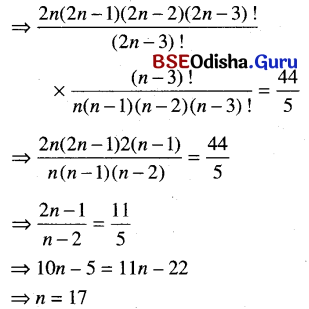
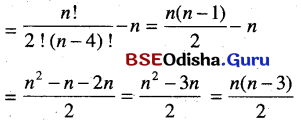
![]()
![]()
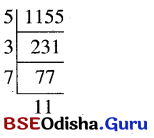
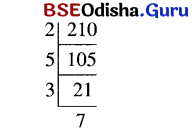
![]()
